#every little thing i say or do or even my life experiences are dramatised in a weird way
Explore tagged Tumblr posts
Note
In regards to ppl jumping down your throat about that post (TM). 1) you're right. But 2) Like... I can see how discussing participating in sex acts with a trans woman is no different from having them with any other male is something that has merit.... But thats not RADICAL FEMINIST content. Like, is it gender critical content? Probably? Thats where it fits better. It would be more appropriate to tag it as such. But radical feminism isnt JUST gender criticality!!! Like, being gender critical is a part of radical feminism but They! Are! Not! The! Same! Thing!
And yeah, people instantly assuming that you asking "how is talking about giving a male person oral sex so explicitly (and in a way that would immediately alienate a lesbian reader... who the post is supposedly for????) is in any way relevant to radical feminism?" Meant that you were saying "female heterosexuality is unsightly and i dont want to see it and also het women need to shut up forever".
(And also the comparison of lesbians being like... I dont want posts about sucking dick to abound in the radfem tag is in ANY WAY AT ALL similar to homophobic people not wanting to see women kiss.... Like???? Thanks for being so bald-faced about your homophobia. Its not the same actually but its interesting to see that you think a minority asking an innocuous question is the same as oppression)
Dear. God. Some people on this site just fucking love to assume the worst from you and needlessly attack you about it. They bring all their lesbophobic assumptions into ANY discussion that you happen to have.
I'll tell you what a rational response could have been to the question you posed. "I think this is relevant based on gender critical beliefs that radfems hold and i wanted to share my experience with that audience"
That doesnt mean that anyone has to agree about whether or not it was a relevant post for a FEMINIST TAG based on FEMINIST CONTENT. But the way ppl responded to you was ABSOLUTELY DERANGED. Words in your mouth. Baseless assumptions. Critique based on things you didnt say. Like..... ????? HUH???
If ppl were normal the convo could have ended with you saying "actually i dont think this is relevant to radical feminist analysis. I think you should have used a different tag for this". Instead you had to have paragraphs long responses where you had to pick apart the lesbophobic rhetoric that is being tossed your way and defend yourself FOR LICHERALLY JUST ASKING A QUESTION.
You didnt even ask an inflammatory question! You didnt even ask it with intent to attack the original OP.
Not only is gender critical and radfem tumblr just.... Fucking radioactive with lesbophobia, but people *specifically* attack you with SO MUCH hostility and treat everything you say with so much bad faith. Like???? Its fucking exhausting to just read, i cannot imagine how fucking irritating it must be to experience it constantly. I wonder if perhaps... Hmmm.. there might be a specific form of oppression you face that might make you more likely to face these attacks.... Hmmm... i think it starts with "race" and ends with "ism". I have not seen white lesbians with similar politics to you facing the same backlash on EVERYTHING they say.
And accusing you of faking anons???????? HUH????? Yeah no, you -- a blog with thousands of followers who regularly gets anons -- MUST OBVIOUSLY have to send urself messages to show ppl agree with you and your opinions 🙄 maddening.
u said it all perfectly anon 😭 and yeah funnily enough it’s very clear people treat me differently, like even if ppl want to argue i’m an obnoxious drama queen or whatever, women who are that & worse still don’t get treated the same way. but if i point out maybe there’s some sort of prejudice underlying ppl treating me differently then i get mocked and belittled further 🤭 oh well. that whole interaction was just insane bc she straight up just lashed out at me & put a bunch of words in my mouth simply bc she saw that i’m a lesbian. funnily enough these things happen even when i word things in the mildest least confrontational way possible so i don’t even know what to do to to get ppl to chill out
#like 2 days ago me asking for evidence of a claim about the UN was treated as an attempt to call someone racist??#every little thing i say or do or even my life experiences are dramatised in a weird way#and i’m accused about lying and having alterier motives for EVERYTHING.
3 notes
·
View notes
Text
when Logic twists: an analysis of Logan, cognitive distortions, and a future Side
spoilers ahead! this is a little deep-dive into some foreshadowing in the latest Sanders Sides episode, and what i believe the team are going for in terms of Logan’s arc. just some thoughts i had after the episode - i hope you enjoy, and would love to hear your thoughts too :) tw for discussion around mental illness, trauma, abuse, intrusive thoughts, therapy, etc.
so, we all know that Thomas does a marvellous job portraying difficulties with mental health. he uses interactions between his Sides to carve out fun stories that dramatise the the internal struggles which come with facing complex situations, including those which arise from your specific history and mental illnesses. the writing behind Sanders Sides often uses consideration of real symptoms and therapeutic techniques in order to impart useful advice to the audience who may be struggling with similar issues. with all of this in mind, i thoroughly believe that a good chunk of you are correct about this new Side (foreshadowed in Logan’s eyes) being Wrath, or some variant of Stress or Anger, and here’s why:
Logan is the side of Thomas which is constantly needing to pick up the slack. not only does he spend a good deal of his time de-escalating conflict between the other Sides, he is constantly letting his own dreams (and consequently, needs) fall by the wayside to comfort, validate and assist Thomas' overall desires. we even literally see him benched during the court case with Janus - his input is considered unimportant unless he is deemed as the voice of reason. with this understanding, Logan is viewed by the other Sides as a Side who doesn’t need help. He’s Logic, so they believe he always knows what is appropriate, and how to control himself - or even that he doesn’t need to control himself at all. yet i don’t believe this to be the case, and i think ‘Working THROUGH Intrusive Thoughts’ foreshadows this in an intriguing way: by utilising the dynamic between Logan and Remus. for context, i am speaking as an individual who suffers from Complex Post-Traumatic Stress Disorder (CPTSD), a form of PTSD. whilst the Thomas we know in the Sanders Sides universe is of course somewhat sanitised and simplified for the easier imparting of moral lessons, we know that this Thomas suffers from issues with intrusive thoughts, low self-esteem, and high anxiety. whether or not these can all be attributed to an underlying condition is irrelevant, but what is intriguing is whether these symptoms are being exacerbated by traumatic, triggering or otherwise stressful events affecting Thomas’ life - which, based on the direction ‘Working THROUGH Intrusive Thoughts’ went (using the relationship with Nico as a conduit), i think is true. when you experience a number of traumatic events or an acute amount of stress, your Logic can become faulty. let’s think about Logan not as a super-genius who just knows what is the correct thing to do all of the time: his knowledge comes from a bank of information and experiences, which he constantly uses to provide a ‘rational’ stance next to the more ‘emotional’ traits of each Side. yet Logic relies on evidence in order to build up this ‘rationality’. let’s think about a scenario wherein you are told every day by someone that you are ugly. now, if this occurred later in life, your Logic might have already rationalised that this is not the case - that you are beautiful just as you are, that this person is seeking to hurt you, that they are projecting, etc. your Logic would make those reasonable counterpoints based on past experience. however, if you were told by multiple people throughout your life, every day, that you are ugly - say, from caregivers, or close friends - you would internalise ‘i am ugly’ as part of that internal Logic. in the first scenario, you would be able to accurately evaluate the thought, ‘i am ugly’ as a cognitive distortion. however, in the latter scenario, you may be unable to, because you have this bank of ‘evidence’ that other people perceive this as reality. even if those people are abusers, or have an ulterior motive, the notion will be internalised and become your reality - so your Logic will say, ‘i am ugly, based on all of the evidence.’ i find this interesting because in this latest episode, they specifically had Logan call attention to cognitive distortions. we must remember that Logan is a part of Thomas. this is Thomas attempting to rationalise with himself, to implement mindfulness and CBT techniques which he knows to be successful, because they have worked in the past and he has it on scientific authority that they help with intrusive thoughts. but this leads us to a question: what happens when you experience so many traumatic events, or so much stress, that your Logic turns against you and begins to validate your intrusive thoughts? imagine for a moment Logan’s awesome rational power - but levied in support of all of Thomas’ deepest fears. in my own experience with CPTSD, a horribly thorny mental trap is the one you fall into when you start down the path of ‘i must be a horrible person, just like they said. i must have deserved everything done to me. look at all of the evidence.’ these thoughts often appear rational due to the intense nature of the sufferer’s pain, particularly if that pain is repeated or prolonged. i believe that Logan’s outburst, paired with Thomas’ fretting over not receiving a call back from Nico, are supposed to represent the building stages of this mental trap. such thoughts are difficult to emerge from, but they become even more difficult to deal with when met with a powerful emotion: Rage. if you have cause to think thoughts of the ‘i am a disgusting human being’ variety thanks to trauma, stress or similar negative events, often there is a good deal of pent-up Rage stored alongside. justifiable Rage, one might say - it certainly feels so in the mind of someone who has suffered so terribly. if one is prone to hating themselves, feeling inadequate or other fertile breeding ground for intrusive thoughts, they may also sometimes snap into the opposite extreme - becoming infuriated by everything that has happened to them, and that they are still needing to deal with yet more pain in the present. this is something i have suffered from personally: when mixed with trauma, it is equal parts emotional dysregulation, and being triggered by something. you might be enRaged by the idea that you were ever ‘passive’ as a victim of something terrible, and want to ‘fight back’. in other words, the emotional state of your Rage will feel justified - and this can cause you to engage in some deeply destructive behaviours. this is why i believe this new Dark Side will be Rage (or an equivalent). Logan’s ‘STOP IGNORING ME!’ speaks of a breaking point brought on by years of fixing other people’s problems, only to receive very little in return. there’s a misconception that people who are ‘good’ at handling stress or fixing other people’s problems (i.e., not showing much of the strain) are simply less stressed as a whole, and therefore should be saddled with yet more stress. Logan’s screaming at Remus, and Remus’ delight at Logan’s response, shows us that Logan is exhausted from all of the hard work that he’s had to do in order to fight Thomas’ intrusive thoughts and cognitive distortions, alongside the massive amount of stress in his life. likewise, by giving into his impulsivity and opening up more opportunities for further stress, Thomas has allowed Logan - and his Logic - to become vulnerable to Remus and intrusive thoughts. Logan may have successfully been able to dispel the intrusive thoughts which had no basis in reality (for instance, a murderer hiding in Thomas’ closet) - but what happens if Thomas is given validation for an intrusive thought? in other words - what if Logan feels he has reason to listen to Remus? i believe this Rage has been simmering within Thomas for a long time, and his debut is going to be explosive. there are lots of ways this debut could be written; some have theorised that Logic and Rage will be a kind of antithesis to the Creativitwins, wherein the two are fused as Thomas has internalised his Rage as having a Logical root. this would have Rage not as a separate side, but a kind of version or alternate mindset for Logan, a bit like how he was when in Virgil’s room. i would not be surprised at all for this episode to include both Remus and Janus - Remus, revelling in the intrusive thoughts which Logan/Rage is now allowing to fly free, and Janus, delighting in Logan/Rage’s validation of destructive behaviours, which may well include Deceit. i could also see Virgil being drawn in by this irresistible combination of Anxiety-fuelling thoughts - intrusive thoughts inspiring inadequacy, Deceit inspiring fear of being found out, and the terror of Logic being twisted to validate every fear Virgil has ever had for Thomas. you know when someone has hurt you really badly, and so in your head you come up with countless (awful, unrealistic, hurtful) ways to ‘get back at them’? that’s what i think the next Sanders Sides episode is going to be like. of course, like Anxiety, Intrusive Thoughts and Deceit, Rage will have his uses too. i believe, if any of this theorising is correct, that the next Sanders Sides episode will follow a narrative discussing if Rage is justified when one is hurt to a massive extreme, and what Logic can one follow when it backs up every destructive impulse. are you being Logical if you are full of Rage? basically, i think Logan (influenced by a breaking point and giving over to Rage) is going to do everything in his power to be destructive, under the idea that it is the only Logical thing to do. i believe he will fall to the horrific power of cognitive distortions and mental illness, and that the other Sides will need to use their strengths to bring him back. anyway, that’s all my thoughts! my apologies for any inaccuracies, or if anything in here was upsetting. i’d love to hear what you think about this, and your own theories! :D take care 💏
51 notes
·
View notes
Text
(interview) w korea september issue 2020 — reptile
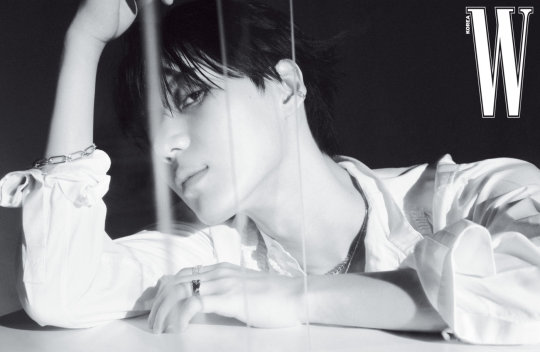
1. i was surprised to learn that this is your 13th year since debut. within a company, the years almost reflect the experience of a vice department head. that’s right. though there are things i’m seeing for the first time at this point, i think there’s a lot that has remained the same. shall i tell you something funny? early in the year, i transformed into my debut appearance from when i was 16 with a bowl haircut and had my picture taken. i put it up on instagram and as i watched my fans briefly mistake it for an old picture, i thought to myself ‘well at least my face hasn’t aged much yet.’ haha. 2. today, i get to meet one of the personalities i’ve been very curious about personally. how should i put it, you seem like a person who possesses a perfect narrative. oh my, thank you. 3. maturing steadily after debuting with shinee in middle school, you broke away from your image as the group’s youngest and instead donned the clothes of a solo musician. all 5 of your solo albums have been recorded as hits. now you are a member of superm that has gone global. even a narrative within a coming-of-age novel could not be as sturdy as this. when i look back on my life, i find it quite fascinating. i entered the company at the age of 13, and this year i turned 28. i’ve lived half of my life as a singer, i realise this when i think ‘i’ve run along the same path for a long time’. i think... i’ve been very greedy. it was through this greed that i was able to debut in a team called shinee, and consequently receive solo plans. once, producer lee sooman told me to bring him a recording of any pop song. wondering ‘what’s going on?’ i prepared for it and submitted, and soon after my solo album was released. thinking back, it must’ve been a test. i felt a sense of accomplishment in these things. that too very deeply, of course luck was on my side too. 4. a methodical company like sm couldn’t have proposed a solo career so lightly. there were a couple of tell-tale signs as far as i could tell. my singing parts were little during debut. after all taemin had the image of the one in charge of dancing. then my parts started to increase gradually, this could’ve been one of the signs. back in the day i used to stay back in the practice room till dawn. the employees working late would see me and the word probably went around. they must have felt sorry for me. a skinny boy practising by himself till dawn (laughs). 5. were you the type to stay back later than the rest in the practice room? i would go to the practice room as soon as we wrapped up our schedule. i’d practice till sunrise then return to the dorm and prepare for the next schedule immediately, i spent a long time doing this. 6. it was at the time of ‘sherlock’ in 2012 that your stage presence started to shine in shinee’s stages. thereafter, it seemed that you enjoyed your time on stage thoroughly. when did you begin to realise that only you were in command of your own stage? there were a couple of times... sherlock was one of them. sherlock was an album that came out when i was 20, right after becoming an adult, it was then my attitude towards performance changed. in those days i challenged myself to ‘not to do what was expected/fixed.’ usually our gestures at certain sections of the song are fixed beforehand, from sherlock onwards however i tried my hand at different things without reserve. it was my way of approaching the audience with sincerity, and my way of improving in the future. back then i would notice variations (in my performance) everyday when i monitored myself. 7. frankly, isn’t it difficult for someone to have made such a prominent leap? i think it might have been because of the long hiatus before sherlock. i was able to prepare well so my growth was likely more obvious when i stood on stage after a long time. how should i put it, my members were very stimulating for me. since the hyungs aren’t ordinary people (laughs). this is something i’m confident about, even if you say that most of the shinee members are main vocalists, none of us is inferior to the other, everyone is so talented. with these thoughts verbatim ‘i must survive in here,’ ‘i need to finish what i started,’ i practiced. i couldn’t not have made the leap with such stimulation and not to mention my greedy nature (laughs). spending time together with the members made me realise that we started to resemble each other in some aspects, thanks to them i was able to broaden my perspective and become aware of my undiscovered talents. 8. the prologue single ‘2 kids’ of your third album ‘never gonna dance again’ released in august. as i was listening to the song, i suddenly became curious about the lyricist and looked them up. my impression was that the language of the lyrics was raw and honest. the lyricist turned out to be you. my intention was to include everyday, colloquial speech. i’ve written poetic and abstract lyrics before, but while working on ‘2 kids’ i wanted the listeners to easily grasp the emotions at once. since i’ve released many songs like ‘danger’ with vivid concepts and sensual performances, i expected there to be some distance between me and the public. i found that i shouldn’t stray too far. in any case, i’m a pop singer. i thought to myself let’s meet the public halfway, and the result was the lyrics for ‘2 kids.’ it’s the brightest of all my title tracks (laughs). 9. i find two interesting points here. first, you are completely aware of your identity as a pop singer, second, to do that you work hard to keep close to the public. of course there are times when it doesn’t work out (laughs). for instance, when we’re deciding on the title track for a shinee album, my opinions always diverge from the members’. after listening to our fourth album title track ‘view,’ i said ‘no way, it can never be this!’ (laughs). what i’m after is, how shall i put it... there is a side to me that wants to experience things profoundly. for example, if i were to express love, instead of depicting it one-dimensionally, i’d prefer to do it maniacally. i like taking it one step further to appear twisted. 10. that’s amusing. it’s probably because i’ve seen your easy-going appearance on tv a lot, i would have never guessed for you to approach things ‘deeply’. profound people tend to be like that. ‘multi’ people are able to do several things at once, i can’t do that. i have to dig into things deeply at a time. that’s why when my members and i receive the same schedule notice, i’m the only one who always forgets it (laughs). 11. oho, this makes me curious about your taste in pop culture. i really like the british drama <black mirror>. i get hooked on the unusual. like mind-boggling things? i used to watch movies that weren’t popular because such movies are less likely to repeat contents that have already been consumed. but then i slowly began to enjoy light films as well. these days i leave a movie running in the background while i do other things. back when i would look for an independent film or thriller of my liking, i’d get extremely exhausted after watching it. they require so much focus that they sap my energy. 12. we were talking about lyrics but somehow ended up here (laughs). if you were given the opportunity to write lyrics again, what kind of story do you want the lyrics to convey? i like philosophical lyrics. for instance, a song called ‘soldier’ from my solo album deals with religious content, it varies from time to time of course but well if i were to write again... i think about this a lot these days. i want to change myself, i want to shake off my image uptil now and be reborn again. 13. why is that? i want a colour that is more concentrated and unique. as if i'm debuting again, i want to show something completely new that i had not before. 14. but aren’t your comebacks always novel? a musician like you who does diverse and experimental concepts is rare. is that so? sure the concepts are always new but... these days i think about how i want to change myself as a person from the very inside. instead of putting a facade on display, i have a thirst for wanting to show a more humane, genuine appearance. all humans experience moments of weakness and dysfunction. i think these moments definitely hold some beauty in them. the moment a person breaks down. it’s the only way one can get up and overcome difficulties again, i believe showing these sides of me, all of me, unabashedly is a path i need to walk as an artist now. 15. honestly, i’m excited for your third album because i heard this album reflects your ideas the most. what aspects of the production were different this time? firstly, i personally cast and liaised with the music video director. i thought it was important to work with the director one-on-one by keeping mediators to a minimum. through several meetings we mulled over every single thing like concept, outfit, hair and makeup. i offered my opinions too: ‘because i’m thinking of leaving a connecting link in the prologue, since there are two albums that would release following ‘2 kids,’ i want to drop certain keywords in the music video.’ fans usually call this a ‘bait’ (laughs). 16. the choreography stood out the most in the ‘2 kids’ music video. you weren’t simply moving to the rhythm, rather weren’t you moving your body guided by emotions? actually there were barely any plans to include dancing scenes. but i thought you never know so i quickly prepared a choreography the day before i left for paris. initially, i had a ‘dramatised’ (borrowing elements from drama) choreography in mind, but the director was expecting something modern. in the end, we expressed it well with a choreography that the director and i came up with after finding the perfect common ground. 17. personally i think a dramatised choreography would have been quite alright because ‘2 kids’ is a universal love song. i told the director i wanted to look miserable and pathetic through and through, like falling into a bottomless pit, wrecked, to be found waking up in the middle of the street, that would do too. why did i want to be that wrecked? i don’t know. there’s just a lot that exists within me. and i might have wanted to express that.... 18. with your first solo mini album <ace> you proved your grit as a solo musician to the public, and i believe your second album <move> reified your colour. i think taemin is a musician who doesn’t need to prove himself anymore. having reached this status, you’re releasing your next album <never gonna dance again>. did you ever think that this album could be it? rather, i hope that this album can be my ‘turning point.’ just as how it was during sherlock, i hope this time it changes my identity completely, as an individual and as a performer. people might like this album or find it mediocre, but i try not to care about these things now. 19. were you the type to stress over feedback? yes. because there are many people who are uncomfortable with change. but then i realised we’d never be able to free ourselves from within if we continued to be tied down. so now i’m trying to notice these things less. 20. have you ever had this thought? that looking back, the experimental has always revolved around you. as i said before, i think there is a lot of something within me (laughs). people have recognized that, there’s a lot i want to do. there is a greed for wanting to be different from others. it’s not that i want to ‘appear’ different but truly be different. 21. do you think there is an aspect of you that others can’t follow? i can’t seem to figure it out. i’m looking for it. however, my satisfaction level with myself tends to be low. and it’s something that has been guiding me till now. 22. what helps you recharge the most? i like lower-body bathing so much (laughs). as soon as i get into the bath, i automatically end up going ‘euu’ ‘aah.’ i soak my body completely, light up a scented candle, then let my body warm up like this. 23. while watching your vlog-like youtube content taem-log, i wondered ‘does he have an affinity for household goods?’ since the camera often captured your surroundings, i noticed pretty glasses and a colourful coffee machine adorning your cupboard. not at all. my mother did all of that (laughs). she’d say ‘this would suit taemin~’ then set it up prettily for display on the shelves. sometimes i do think i’d like to furnish my house with antiques if i were to move in the future. this is a bit funny but i find the houses in old horror movies so pretty. 24. i saw a bottle of moët & chandon in your refrigerator, is champagne your regular choice of alcohol? i rarely drink. i usually receive gifted alcohol quite a lot, it all goes to my father (laughs). my mother brought the moët & chandon and left it in there. i asked her to leave a pretty bottle in there at least for decoration purposes, so she probably brought it just for that? (laughs). 25. what kind of a person is 28-year-old taemin? i sort of want to set things ablaze. i want to put up a spectacular finale of the opening act. 26. how do you want to be remembered as a musician? as a great person. i say this knowing it sounds a bit grandiose but it’s my mission. 27. i can see it. the bigger you become the larger the impact you can have on society. i will become that person. so that many people can hear the message i want to convey.
translated by romanceboys — take out with full credit (source)
#shinee#taemin#p:taemin#w korea magazine september issue 2020#interview#translations#e:never gonna dance again#enjoy!
316 notes
·
View notes
Note
no bar!! never fret about replying late. i know what it’s like to not want to talk to anyone. honestly. i won’t call it (my experience) a depressive episode bc one of my friends used to brush off me when i was saying things like i’m depressed and say ‘sad’ instead. like if i were to say ‘that made me/i am depressed’ she’d say something like ‘oh god same! like if it’s making you sad,, don’t do it.’ which is a v poor example of what she did but i never called it depressed after that bc she pissed me off n was disregarding of my feelings (even though she’s incredibly anxious herself) bc i didn’t get it officially diagnosed. idk if you’ve ever read about birth control pills but i always read on tumblr people calling them literal depression pills and i ignored it, thinking either 1) people were being dramatic / were over-dramatising it or 2) it wouldn’t happen to me anyway. it fucking happened and they were not being dramatic. i was never happy n always working on minimal sleep n making self depreciating jokes all the time bc it was the only way i could cope with my thoughts n constant mood swings. so what i’m trying to say is,, i know how it feels. if that’s any consolation. it’s not me trying to be ‘oh me too!’ or ‘mine was worse than you’ it’s just me being understanding n telling you it’s okay. also lemme at your friends!! i’ll stomp them out n get the barman to run them over for you!! they’re so mean to forget you!! i find that deciding i want to do something specific n then asking the appropriate people if they want to do saïd thing/place works for me. it can be a simple ‘we should do this, when are you free?’ helps. making it known that you want to do things helps. or aggressively remind them that it’s nice to be asked bc it means they thought of you even if you couldn’t go n tried to include you. or we can revisit me stomping them out w my beloved barman,,, whatever works best for you my dear <3
admittedly me and one of the girls were discussing that we are going to miss our manager. even though literally everyone moaned about her (i feel like it’s impossible to avoid in literally any job/situation) she did have her moments and she did a lot for the staff like after work-drinks, asking the chefs if we could order off of the customer menu instead of the staff menu or whatever they cook in bulk for everyone to take home in the evening. apparently she did this a lot more than the previous manager. she has a good heart but sometimes she ignored some of the girls when we ask for days off or our availability for the week which was very annoying of her. it could’ve been a lot worse, i suppose, but overall she wasn’t terrible.
thé lady who lives in my town and drops me given the chance, told me the other night that she used to be the duty manager. i asked her why she stopped and she explained that when they furloughed everyone they asked her to come back on like half pay or something? idk i just remember it being explained as they wanted her to come back sooner and take away her furlough so she said no and got demoted. but somehow she still gets some of the furlough? idk i have been taught that asking how much or discussing specifics of paychecks kind of thing is rude, growing up. she has been telling me they keep asking her to come back (now they’re asking her to be a supervisor since she declined the manager role) and she keeps saying no. i love her and want the best for her so i won’t say anything to anyone about the conversations me and her have had (i mean, apart from maybe my mum if i can remember, and you bc, let’s be real, you don’t know me and idk you) and she says they’re just difficult to work with as a management team. she even said our area manager isn’t impressed with our current assistant manager (who is currently the only person on an houred contract since our manager left) which shocked me since i personally think he is quite good considering he has a good relationship with the staff and kitchen (he’s thai so he can communicate with the kitchen better than most of the wait staff (some wait staff are thai but mostly not)) i think she doesn’t want to be the eldest person in management or she doesn’t want the age gap to be so big since she has a kid she can lecture at home, she doesn’t need to be looking after people at work, y’know?
also today, me and one of the girls were upstairs (two floors of the restaurant!) and it’s nearing 11pm and her brother (who also works there) comes up and asks us when we’re finishing (mostly her lol) but we had two tables just sitting talking amongst themselves so she just said idk. he was saying he wanted to go bc he’s tired etc n he’s driving n she was like it’s fine go home i’ll call an uber or something n he was refusing to leave her behind. (i feel like i brushed over the two tables sitting there but it must be noted they’re the only tables left in the entire restaurant and we were the only two wait staff still there, apart from her brother but he changed and was waiting downstairs). anyway, she was sweeping (i was cleaning the booth/sofa thingy chairs as it was a mundane task we could do to pass time and while she was sweeping by one of the tables thé boyfriend was whispering to his girlfriend saying ‘should we go?’ and the girlfriend said ‘why should i care?’ and the girl came over to tell me v quietly and i got so upset for her. bc she is literally the sweetest person on the earth and the only reason i didn’t go to ask the manager to see if i could go home with the lady who offers to take me (ex-duty manager lady!) was so she wasn’t alone up there. if i had been the one sweeping near that table i would’ve snapped so fucking hard at them. i mean, we’re 18 and have lives and sleep schedules, and we’re working until 11pm on a thursday before we even get home?? like i wouldn’t have minded staying if they were reasonable tables but after the gf said that i was like ‘shall i go get our stuff from the staff room?’ so i could split as fast as possible. in the end the temporary acting manager came up and told us we could finish and she kicked the tables out ten minutes later. i told her what the table saïd and she thought that was mean and unnecessary too. i was also worried about my sleep tonight since i have my first vaccine tomorrow morning. that’s why i was more pressed about what time i left work today. oh well.
im sorry for talking so much about work! sometimes i don’t have someone to talk to about it (at home) bc of my weird hours and sometimes i don’t like re-explaining things to my mum if she doesn’t get it the first seven times. sometimes it’s just a little too draining as she doesn’t understand since she’s a lifer at her job. it’s easier to explain to my dad but then i get a whole lecture on something that i ultimately have no control over n id rather just bitch w the girls at work but the problem is WE’RE AT WORK!!!
also i booked for my first tattoo!! i’m excited. it’s for next week,, which was super quick considering i was expecting to have to wait soooo much longer. i’ve been telling people about it and that it’s happening but i haven’t had the pleasure of telling people exactly where i got the idea from. bar, my dear, you know wheein’s new album, redd? well, it comes with loads of things, including these stickers (one for each song) and the one from springtime was just so perfect and when i saw it my first thought was, this would be a perfect tattoo. and so i am having it tattooed on my body. a subtle nod to kpop whilst also having something meaningful on my body. i also have just decided i want a small, minimalistic (or one-line art) rose on my sternum, kind of in the valley of my breasts, bc my nan was a rose. i like having her close to me. i recently got her necklace fixed which has left me feeling so incomplete after it broke in august last year. it’s been almost ten years and i think i’m long overdue something to remind me of her. i fiddle with my necklace when i’m nervous which is why i love it so much but incase it breaks again (i pray it doesn’t but i have a long life ahead of me) i would like her close still.
gosh there’s never enough space in my head to remember what i want to tell you so i’ll stop here for now since i should sleep to be able to wake up in time for my first jab. i’m scared but it’s whatever i’ll do it i suppose,, eeek 😨
ilyl ~ 🌻
thank you so much for opening up to me about this, it means a lot to me :( i am so sorry you had to go through this and honestly,, i really resonate with you. i feel like when i talk about my emotions and my sadness (dont know if its okay to call it depression either but yea), my friend either always either makes me feel like my emotions arent valid or she tells me she doesnt know how to help, which is frankly, why i dont talk about my emotions to people irl anymore. i dont open up and it takes me a long long time to do so if i ever do, because i tend to feel insecure/not safe :D so really, thank you for telling me and i hope you are doing better. your emotions are valid and i am always here for you
HAHAHA i mean i dont have many friends so theres not many to stomp on:( but i mean,, i get passive aggressive when i feel forgotten/left out so you best believe i told my friend how im feeling, but like uhhh it didnt do much. i spent the whole weekend at work and i was free on friday but my friend decided to ditch me and yeah. i havent been out in like two weeks now and i mean i am an introvert so i dont mind that much but even i want to socialise sometimes
aah i mean every manager has their flaws, no one’s perfect. my manager keeps calling me to go to work even though i was literally there for 11 hours on saturday AND sunday which means i worked for 20 hours in two days. and i work 20 hours a week at max. and i already worked some hours before the weekend so i think i have like 30 hours now and she keeps calling??? dude i need a break too,,i am so exhausted and tired of this shit :dd
oh i totally get what the lady that drops you off sometimes told you. i would feel a little iffy if i heard it too, but like,,,judge by your own experiences!! if you feel like something is off, you can always leave,, so i wouldn’t be so stressed about it.
why are people so rude ??? dude,,you should care, because we are all human. everyone has their needs and their lives and i bet he wouldnt like it if he was the one in your place. why should you stay there longer just because he didnt want to leave?? that was so unnecessary. people are weird beings and i learnt that after working with them this weekend,,,like i litereally got screamed at because i couldnt accept cash in different currency. like,,what tf do you want me to do?? i dont have every single currency with me so i could give u the change ?? tf ??
ALSO ITS OKAY TALK ABOUT YOUR WORK HOWEVER MUCH YOU WANT !!!! i also feel like i dont have anyone to talk to about work bc my parents dont listen to me as much as they used to these days and my friend unsurprisingly just doesnt care bc she doesnt work,, and i dont wanna talk to my internet friends abt it as much bc i feel annoying so i am glad us two can talk about these things together !!!!
YOUR FIRST TATTOOOO WHOAAAH thats so cool. i love tattoos hihi dfkja idk if u already had the appointment but tell me how it went after !! i wasnt able to find the sticker on the internet but im sure it looks hella pretty. also i love how it reminds you both of kpop and your grandma, its wonderful <3 i really want to get a tattoo one day,, and i also want something meaningful (not that i am hating on people that tattoo themselves just for fun and have no meaning behind their tattoos i just have commitment issues so i want something long lasting). alSO my crush (yes i have a crush now ew) has a tattoo and it looks like satan lowkey,,but apparently its a japanese something (i forgot the word oopsies) and it means jealousy, bad past and wisdom ?? i was like BOY IF U DONT??? fjdkla he has blue hair btw i am very much whipped but he also doesnt know me and i am older than him so this is embarrassing
ALSO I HOPE YOURE FEELING WELL AFTER GETTING THE VACCINE !!!
ily <333
1 note
·
View note
Text
My Pet Peeves in Korean Drama
I was wrong to assume that the more I watch kdrama, the more I’d get used to its ‘annoying quirks’. It turns out that the more I watch them, the higher my expectations are and the less tolerant I am. Sure, there are some tropes and plot device I no longer protest about, but some of them are very hard to get over with.
Korean Drama in which the two leads unknowingly share a tragic experience in the past. It’s that drama in which the two leads meet accidentally and naturally grow fond of each other without knowing anything about each other’s (usually tragic) past and trauma, but in the middle of the show (usually around episode 8) the writer start to show us that the two are linked through some accident in their past. Some writers use it to create the angst and some use it to show how they are indeed destined. I absolutely dislike that trope. I would not hate it if the past had been integrated in the initial part of the story, for example their meeting happened because of that thing in the past (e.g the collapse of a building in Just Between Lovers), or if we can see that the attraction between them happened because they shared similar experience in the past (e.g. Sunny and Grim Reaper in Goblin). However, if they build the relationship from literally nothing concerning the past, and you suddenly tell me that they have met before all of these, I’m gonna rage. If I were being mean, I’d say that the writers just do not have enough resource to create a believable, strong connection between two people without having to use the said trope. I ended up dropping the “Kill Me, Heal Me” and “What’s Wrong with Secretary Kim” because of this. I even hated the whole “Ri Joeng Hyuk’s piano melody saves Yoon Se Ri’s life” arc in Crash Landing On You, I mean this drama has played enough “amazing coincidence” card when they made Yoon Seri crash landing on her true love, this other coincidence about Switzerland is just too much. At the very least, the writers did a good job in convincing us about how much they love each other even without the switzerland part, so I’ll just keep pretending that the arc never happened in the show.
I am pretty lenient when it comes to relationship between two very different people, even when the difference is age gap. I believe that in the end what matters the most is the interaction between the two people. However, when that age gap is a matter of hundred years, I have my reservation. There have been two korean dramas I watched in which this reservation really prevented me from being fully immersed with the relationship: Goblin and Hotel Del Luna. Both shows have an immortal leading character who is in love with the sole person who can end their immortality. While both of the characters are portrayed as someone young and attractive with appearance that still matches the other protagonist age, I still couldn’t see them as a couple because deep inside I know that these characters are mentally hundreds years old. Inside those good looking selves are grandpa and grandma with different values and views on life. Therefore, no matter how dramatic their romantic story lines are, I just couldn’t see them as a couple. Both dramas are beautifully written by household names for romantic comedy and the productions are very mesmerising, yet the romantic relationships just do not work for me. Now that I think about it, I might be glad that they do not continue Gu’s Family Book, it would have been even weirder than these two.
I suppose it’s because I just finished watching the first two episodes of The King: Eternal Monarch, and apparently this show is very big when it comes to dramatising mundane/weird situation into romantic situation. In the final scene of the first episode, Lee Min Ho just met Kim Go Eun a minute ago and he suddenly strode to her and hugged her out of nowhere. I could (a little bit) understand the move he made since he finally met his lifesaver that he had been searching for for years, however I could do without Zion T’s I Just Want To Stay With You suddenly blasting and making it as if the situation was somewhat romantic, when in reality it was just creepy. I mean, wouldn’t you be crept out if a weird stranger, albeit very handsome, suddenly come hugging you? I literally laughed at the absurdity of the scene, and not even entertained laugh, just a ‘what the hell’ laugh.
I’d say those three are my biggest pet peeve in korean dramas, but I have a lot of personal biases, and there have been a lot of times where I can’t even explain why I like things or hate them. Again, at the end of the day, every thing is an accumulation of many little things, hence even the things above might not even be that big of a deal when complimented with other aspects of the drama.
5 notes
·
View notes
Note
What kind of crazy, untrue things does the average Ald believe about Cresce? And what about Duane? He is intelligent and well-read, has he tried to "understand the other side" by reading Crescian books or "neutral" accounts like "Cresce and Alderode: four centuries of blood"?
Duane hasn’t, no, as he’s never had a great deal of interest in politics nor even history outside of where it applies to pymary and his religion. He and Leysa used to have mildly heated arguments about Cresce however because she loves history and gobbles up historical accounts and dramatisations. Leysa goes through life trying to see both sides of every argument, and has somewhat scandalously sympathetic feelings towards the Gefendur, kussen, even Cresce.
Your average Ald is not so enlightened. For instance, Mikaila’s little friend Lizbeth says in the v3 bonus comic that Queen Sonorie can fly because she has a cloak made out of the wings she’s torn off a million butterflies.
In general, Alds believe Crescians are utterly “pussy-whipped,” as my darling father would say, their entire lives dictated by their women, with the Queen standing over them as High Lady Bitch. Lemuel’s “dog-fucking” insult to Dhampir today is a common and dehumanizing insult often directed at south as well.
I mean, it’s just ugliness upon ugliness. Alds believe Crescians have absolutely no personal freedoms and yet are completely depraved. They think everyone lives in poverty except the nobility. They think the populace is benighted because they have no Copper citizens who can use their long memories to educate them on the past and use their vast experience to lead the country forward. Crescians are unchaste, unmanly (or too manly), hypocritical, bloodthirsty cucks.
Crescians don’t believe most Alds are even human. Cutie-pie today asking Vampire for hair and tissue samples? Vampire’s a friggin’ monster, he needs to be studied. Plats don’t pump blood; they bleed milk. The Dammakhert steals children from their parents, stains them with the Aldish State’s branding, and has their lives and their abilities (and their personalities, if you buy into the caste stereotypes) decided for them before they’re even born. Alderode buys into Sharteshane’s greed-driven monetary system, where scarcity is encouraged so a small number of men can sell resources to the rest, resulting in most of the country living hand to mouth, uneducated and perpetually on the brink of starvation and disease. But the stupid bastards do nothing to change their own destinies or better themselves because that would require hard work, something that Alds hate, the lazy animals.
Alds completely dominate women, giving them no option save a Third Option - to shed their identity, as though Maleness is some mystical quality required to do anything in life but shit out children and keep a home. Alds - the dumb animals - cripple their arts, their pymary, their entire society by crushing half of it. Even its “free men” are only as free as the station they were born into, with everyone separated into caste upon caste, class upon class, divided down to the last penny in their pocket. Their “freedom” is a joke, but the brainless dogs are too stupid to understand the punchline, and are instead happily led to make war on everyone around them because taking life is the only meaningful thing their state will allow them to do.
Everyone hates everyone~
41 notes
·
View notes
Text
GARBAGE DAY!
a bunch of scrappy shorter pieces to clean out my drafts folder for the new year!

***
A videogame will tend towards exhausting every possible variation of a design space whether anyone wants it to or not.
Videogames and duration - if something is good it should continue being good however long you extend it. You don't really encounter the idea that something can be good for a little while and then be evil.
***
Works of art are "in conversation" with their audience, with materials, with history, with each other. The aim of an artwork is to start, or add to, "the conversation". "Conversation" sort of edges out the older tic whereby art "examines" or "explores" something, which always made me think of a big magnifying glass being propped up for the benefit of some eerily calm 1950s scientist. But now that sounds too chilly, and perhaps sort of sketchy in the power dynamics it implies. "Conversation" is much warmer, informal and more fluid - "conversation" is the assurance that any given power dynamic can be dissolved away in the warm glow of basic, mutual humanity. Let's talk it through! My door is always open! Whenever there's a complaint over labour conditions or harassment it's nearly de rigueur to also quote the wounded-sounding HR lackey, upset that people didn't talk to them about it before going public. Why would anybody deny the friendly, outstretched hand of the respected opponent and their entirely in-good-faith quibbling about word meanings, personality and tone? Why don't we have an honest conversation about the "honest conversation", that numbing discourse cloud sprayed out like formic acid to neutralize a threat, to melt any unsettling edges or contraries back into the familiar gloop of the private and the personal.
***
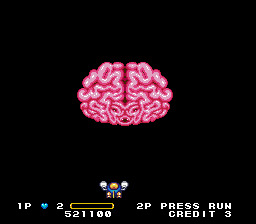
One of the pleasures of videogames is that of an infinitely repeatable, always identical procedure. Pressing the button makes something happen, and by pressing it again it will happen again in the same way. So there's a kind of abundance or excess built into the system - like partaking of a fruit which will never be depleted, and in the process taking on in your own actions something of that same infinity. You can temporarily identify with the self-identical, eternally reproducing action that you are performing. I think one of the difficulties of videogames is that as you get (slightly!) older, that immortal quality becomes more visibly alien, harder to align to your sense of self. That these mechanics act like black holes, able to absorb any amount of your life without ever being satiated, becomes a terrible curse rather than an unexpected gift. That endlessness now seems eerie and artificial, a horrible parody of life rather than the highest version of it.
The dadification of vgames has gone much remarked. But as well as a demographic shift I think this reflects a certain anxiety about the centrality of these immortal entities, these endless loops, within the culture. As reward for your fealty to the Mario brand you get even more Mario games, which by now you may not have time or energy to actually play. The VG dad (or even the buff, single pseudo-dads of the superhero movies) is eternally exhausted with the genre that he’s trapped in. We hear him groan and complain as he painfully slogs through the motions. The gratuitous loop is redeemed by the finite human suffering of the dad, as he manfully does what it takes to keep these things going forwards to the next generation, so that the next set of children may be able to actually take pleasure in them again. But the attempt to symbolically re-integrate these things into human life by casting them as a family drama never quite works: their ultimate indifference to that life shines through. A blind, eerie deathlessness is both their charm and their authority.
***
That saying that when all you have is a hammer everything else looks like a nail - similarly, when all you have is willpower, everything looks like an obstacle to be pounded into submission by that same willpower.
Laziness is a good thing in that it means stepping back from this idiot insatiability of the will. If you're lazy you have to pay more attention, because you're more aware of both your own limits and the limits of your material.
I think there can be value in suspending a formal problem rather than building an exhaustive system to solve it forever. That way it's still something you have to think about, something that still throws off and reroutes the normal workings of your awful private fantasy machine. Dropping text strings into the game as elements to spatially encounter is not ideal technically but does force you to be more responsive and exploratory with how you use that text. Robust systems can be cool, but can also really homogenize everything - now "text" is just the miscellaneous stuff within the all-purpose "textbox" at the bottom of the screen, cementing its role as filler content.
The funny thing about really systemic, open-world type games is that their very robustness tends to suffocate exprience before it happens. We know nothing will happen which will significantly impact this camera POV, this dialogue system.. anything can happen except for anything which would require a fundamental change to the underlying inventory system. But maybe the whole pleasure of the open world game is just being able to hold those experiences in suspense.

***
Mostly the characters voicing my own opinions in my videogames are explicitly malign and sinister - which is a corny device for me to vent without worrying as much about browbeating people with my opinions. But it's also a way of having those opinions without allowing them to overdetermine the rest of the game, or be fully in control over the more ambivalent and drifting work of "putting together different pieces on a screen to make interesting spaces". So in that sense my own ideas really are the enemies, and any plot role they serve in the game is a dramatisation of the effort to create a space where they lack controlling power.
***
RPG Maker is a collage machine, you get a set of pictures and start placing them around until they start to form some kind of charged and interesting space.
I think the collage aspect is a lot of what I enjoy about making these things, which is why games with more polished or consistent art styles frequently leave me cold. For me the greater the discrepancy between different objects on screen means a greater effect when they're combined.
How does gameplay etc tie in? For me gameplay can divert the interest but never truly capture it. For decades games have had the problem of effectively being able to train you to do something, but having no idea what that thing should be or why it would matter. They effectively move your attention around without being able to settle it because their inner logic is basically always the same ahistorical, mechanistic void. But this can be a good thing - the permanently restless and unsettled nature of videogame attention can't illuminate itself, but can do so to other things in passing.
Distraction becomes a way to examine surfaces, rather than being sucked into depths or settled to one fixed meaning. And the drift of unsettled consciousness is ultimately what animates game collages, the spaces that shift and react as attention plays across them, revealing or withholding. And so from this perspective, the answer to why I make videogames is: because I don't trust myself to look after an aquarium.
***
Design is managerial aesthetics - a mode of expertise framed as meta-expertise specifically because it scales up so well to systems of mass organisation and production. It's a universal discipline insofar as the task of removing any obstacles to the frictionless flow of attention and of capital is now also a universal chore. In this context a designer is like the MBA who can be dropped into any business to improve it, without ever having to know just what product they make – because the ultimate goal is always the same, the same tools can always be used.
The cutesy books about the design of everyday life and so forth exist in the same vein as the ones that tell us there's nothing wrong with marketing because ultimately isn't all human discourse and activity some form of marketing? Isn't everything "design"? The strange top-heaviness with which these things outgrow their host categories parallels the unstoppable expansion of executive salaries within the businesses themselves. The task of managing other people's labour becomes ever more grandoise, ineffable, cosmic and well-paid as that labour in turn is framed as a kind of undifferentiated slop which exists for the sake of being shaped by creatives.
***

tragedy / comedy:
Generalizing hugely I feel like tragedy is about an event or experience so powerful it changes everything - for the characters involved, for the people in that world, for the audience watching - while conversely comedy is the idea that no event or experience can change anything. Oedipus dies and there's a big announcement and everyone has to sit through the awkward two-minute silence before getting back to work, while trying not to fart or itch too noticeably, and the next day somebody's selling Oedipus commemorative pens which run out of ink five minutes after opening, and the pen cap gets lost and the cat starts playing with it.
In comedy the tragic can still happen, it’s just never strong enough to escape the constraints of the inert material universe which we find ourselves in – all that which remains so stubbornly intractable towards the higher instincts. I can talk about the dignity of man but there's still a risk that my pants will fall down or that someone will hit me with a ladder, causing my head to get stuck inside a bucket of paint, etc. Or my voice might be ridiculous or I might have a stutter (old comedy standbys!), or someone might hear part of my words out of context and assign them a different and unintended meaning. Comedy is consciousness imprisoned within a cumbersome matter which it can't completely do anything with, but also can't exist without.
Taken as a worldview, this sort of risks congealing into the kneejerk reactionary things-can-never-change, whatever-moment-of-human-history-i-was-reared-in-is-eternal-and-inviolate radio DJ / South Park mindset. And of course somebody's view of what constitutes a tragic, life-changing event depends greatly on whether it's happening to them or someone else. But as exaggeration, in its neurotic overemphasis of the inescapable material, i think this approach still has interest and use. Many of my favourite writers have a kind of comic understanding of consciousness: consciousness becomes a churning material process with its own independent momentum which has to be examined and accounted for as part of any real reckoning with the world. In this light comedy becomes a way to think about opacity and limitation, both in physical matter and in our own selves.
I think many people have made the point that vgames are generally comic, intentionally or unintentionally. The rhetoric around them still tends towards the tragic: make the choice which changes everything! Deal with the consequences, accept your fate! But in practice those moments feel less visible than the clumsy material layer of GUIs, inputs, mechanics and representations that contain and constrain them. The opacity of the black box is one inhibition: was that meant to happen? Was it scripted or a glitch? Maybe I should reload my save and try again. Another is the inertia of the various game systems and loops themselves - [x] character may have died but you still need to collect those chocobo racing feathers if you want the Gold Sword. The numbers in a videogame "want" to keep going up, whatever happens: there's an affordance there which exists independently to any merely human wants and needs, and so tends to act as a gravity well for distracted consciousness as it wanders around. When people talk about tragedy in videogames it's usually with the implicit rider that it's within a game, or set of game conventions, which have become naturalised enough to become invisible. Which also tends to mean the naturalisation of a form, of inputs, of technology, of distribution mechanisms and assumptions, which however arty we can get are still inherently tied to the tech industry. Every art game is to some extent an invitation to spend more time internalising the vocab of your windows computer.
I've mentioned that the materialism of comedy can tend towards unthinking reaction. But the insistence on certain limits inherent to the human body – requirements like clean water and clean air, food and shelter, actual bathroom breaks and not piss jugs and also not having to live six feet beneath a rising sea level - can be helpful at a point when all these things are regarded as negotiable impediments to the pursuit of future profit. Maybe it’s a good thing that some materials can still be so insistent about refusing to be absorbed into the will.
***
I think what I most enjoy about art is the sense of a game with moveable stakes: where you never quite know the value of what you're playing for, which now appears absolutely trivial, and now appears to stand in judgement of the whole world, etc. I think this is also the Adorno idea of the aesthetic as really the extra-aesthetic, that which can step outside or threaten to step outside the limits of the merely aesthetic. It's why "just make a good game / pop song / comic / etc" never quite works, in rhetoric or in practice: the really good pop song is never that which just gives the enjoyable three minutes of listening we might consciously assign to be its remit, it's what overflows or undercuts that category, that which however briefly seems at risk of stepping outside it and into the realm of everyday life.
I grew up on pop culture so I don't have to feel positively towards it. Who am I meant to be defending it from? The handful of surviving WASPs reared on Brahms who get the ostentatiously-fussy-culture-review posts at print newspapers looking to pick up a slightly higher quality of margarine advertisement? The best thing pop culture ever gave me was its own critique: that of containing artists and moments which couldn't be squared with what the rest of it was saying, which seemed to call the whole enterprise into question and in doing so broadened the sense of what was possible. Pop culture was never quite identified with itself, the value it has is in containing elements which make that self-identification impossible. So it always throws me off to see people celebrating "pop culture", like it's a self-produced totality, when that totality was only ever good for kicking.
Pop culture survives through a negativity it can never properly acknowledge.

[images: Tower of Druaga, Detana!! TwinBee, True Golf Classics: Wicked 18, Microsurgeon, Dark Edge]
32 notes
·
View notes
Text
(REVIEW) Not your minute turns from the blueprint: Body Work, by Tom Betteridge (SAD Press, 2018)

Denise Bonetti <[email protected]> Mon, 10 Dec 2018, 20:21 to maria.spamzine Hey Maria, Hope life’s good :) I’m just writing to see you if you’ve read Tom B’s new Body Work? There’s a paper I should be writing, but have been reading and rereading that pamphlet instead, or more like dipping in and out really, cause it's so beautifully layered and expanding that you can only take so much at a time. Don’t you think Tom’s poetry has this strange earworm quality to it? (I think he’d like the annelid comparison.) The way he choreographs words (I don’t want to use the word 'images’) makes its way into my brain and never wants to leave. He draws these, like, lateral paths of meaning so clearly that the weeds never grow back.Tom Raworth has this bit in 'Writers / Riders / Rioters' that goes:
the present is surrounded with the ringing of ings which words have moss on the northside
like, words naturally arrange themselves into a system of semantic habit, which is so stable and stale that makes them grow moss, but also so rich and vibrant when it's exploited productively. Obviously this is Raworth so it probably also means the opposite of this and so much more, but it kinda makes me want to say that the present (poem) makes the ringing of ings deviate so well that the moss can never grow again. I’d say that his poems behave like sophisticated lines in the sand, but they're more like brutal carvings on a rock. He had a couple poems in Blackbox Manifold ages ago (I think) and there was this one bit
‘nerve truffled plume lead pickled breast’
I think about all the time (especially when I cook). It’s so smooth. Why can I not stop thinking about it. It’s cause it’s so shameless, it wants it all - the feather-light and the corpse-heavy, never perturbed, so lucid. It plays at tasting good, but it tastes of an unrealistically blank texture. A-ha! Anyway the new pamphlet is gr8, if you haven’t read it yet look at the first poem pls - ‘OCCAM OCEAN’ (sounds like an anagram or palindrome)

It all dwells in systematic abstraction but flies so close to materiality, like a mosquito buzzing around the ear ('Not your minute turns from the blueprint'). I love that ‘plate’ in the first phrase, too: it behaves like an adjective but feels nothing like it. I can't help but think it's the subject of the sentence in a parallel universe that's created by scrambling syntax. It makes me think this is the way language should always work, and that we're the fkn idiots living in the parallel universe in which syntax is scrambled in ordered to be as boring as possible. Idk - it's late and I need to go back to writing boring essay syntax 'bound to decision and the pursuit of what follows'. Lemme know ur thoughts you smart queen D xxx
Maria Sledmere <[email protected]> Wed, 12 Dec 2018, 17:30 to denise.spamzine
Dearest Denise,
Life is good thanks. I'm sitting in the attic of the law building and I can hear the construction work going on and every time I leave I look out at the skyline and slivers of infrastructural alteration. I was walking along the road earlier because the pavement was closed off for construction and cba crossing and the high-vis guy was like, 'you'll not see Christmas walking on the road like that', but I guess I misheard him saying something else because I was really engrossed in this old Slowdive album, so I just smiled sweetly. Anyway, that got me thinking back to the question of erasure, which I think is pretty vital to Body Work.Have been carrying this pamphlet in my bag for so long that the cover has started to peel and revealing speckles of white underneath, like the text itself is ready to reveal itself, and yes I was thinking Barthes and strip-tease and paratextual enticement.
So I had to google the word annelid and now can't get the phrase 'segmented worm' out of my ear/head/throat (gross!). I was thinking about what sort of stains are on the cover of this book, you know, with Hrafnhildur Halldórsdóttir's gouache/pencil work. A stain is one thing stuck to another. Gouache is a funny kinda substance that is half watery gauze, half binding, thick, gummy akin to acrylic. Wet, it will easily smudge. My thumb keeps bleeding where the skin thins, hardens, peels and sloughs off. Tom's poems are kinda mucilaginous in parts (v. insecty, molluscky, sap emission; but also they have a crispness and precision, like cuts of leaf). Things that smudge or fall in flakes. Bodies are maybe whatever we leave behind. I didn't want to mention Hookworms the band because of the singer's sexual abuse scandal BUT it seems significant that a group named after an earworm/type of parasitic larvae would have a song called 'Negative Space'. Like what we eat into in the process of making, existing, remixing. Is language a rash, the result of these parasitic inf(l)ections?
I've been to a couple of reading groups on microbiomes lately, and we were thinking through this idea of how acknowledging your bodily composition in terms of myriad genes and organisms challenges conventional, bounded notions of 'self'. What kinds of affects does this produce? There's a weirdness to that, in Mark Fisher's sense of the weird as 'that which does not belong', that which 'brings to the familiar something which ordinarily lies beyond it, and which cannot be reconciled with the "homely" (even as its negation)'. Fisher suggests that the form most conducive to rendering the weird might be montage. So I was thinking about how montage involves splicings, gaps, juxtapositions, cuts and suddenness. I mean you open the very first poem of Body Work, 'Occam Ocean', and see that its prose-poetic paragraph compacting is split in the middle by the juncture of line break and indent. And ofc the title recalling Occam's razor, the philosophic principle by which in the case of two explanations for an occurrence, it's best to go with the one that requires least speculation. Razor things down and erase speculation? What are we left with, more of the Rreal? Lately I've been hankering for cleaner prose, crisp lines, simpler solutions. The Anthropocene is all of a goddamn tangle. Do I want to follow the myriad threads or just cut cut cut -- who gets to do that?
Did you ever cut a worm in two as a kid?
Okay so I love how 'Occam Ocean' might promise, title-wise, this clean prosaic expanse (like the oxymoron of expanding ocean and occam's, which requires surely a condensing), but what we get is clustering, motion, shiver, containment. The sensual trash magickk of P. Manson! The little syncope of this thing or that, the 'maple neck', vibrating canes, 'chambered breath bowed into the driest soundboard'. These aren't like 'Latour litanies' because they are not like concrete OOO segments of things; idk, they are more about processes and mutable assemblages, emphasis on action and change, sometimes transmission, things inside things. Lynn Margulis and symbiogenesis. How things interact, communicate up close; all of a mutable, prose-poetic swallow. It's actually an incredible intimate pamphlet, don't you think? I feel inside a thing inside a thing inside a thing. I feel a vague ecological sorrow, which gnaws at introspective tendency. The clue to that, you might see, is the cutaway phrase, 'emo Chord' in 'String Growth'.
'Collapse all tears allowing echo retreat'; these lyric lines of 'Glissando' expression, smoothing and shimmering over cuts and junctures: a slide between notes. I used to play trombone and I wish I cld articulate linguistically what kinds of lip vibration occur when you attempt a glissando and feel it slide down your arm muscle but then also through your chest as you try to sustain a sound. It's maybe the way you glide through a scattered poem, with your eye, which is different ofc to the spikier way you'd have to read it aloud, stuck on the vowels. Stuttering. I would love to hear Nat Raha perform these poems, because she does such wonderful things with punctuation and bodily performance, a kind of grammar of breath and cough and click. Reading over the more field erasure poems like 'O--NE' and 'String Growth', it's easy to say something like ~vibrant materialism~ here, but as usual I reach for Steven Connor on noise. Return to the ear, which is 'vulnerable' and 'resembles the skin in being the organ of exposure and reception'. I love what Connor says about Levinas' perspective on 'the awareness of the vacant anonymity of being, of an abstract, encompassing sense that "there is"' being 'an experience of noise'. <3 Acknowledging that breath in the void, that is not nothing but a sparkling something, entails a sense of noise. I am here in the attic of the law building, listening to construction, the type of my fingers on the keys. Someone is murmuring of their distress. What is the difference between living and existing, and being and nothing?
Karen Barad:
'Suppose we had a finely tuned, ultrasensitive instrument that we could use to zoom in on and tune in to the nuances and subtleties of nothingness. But what would it mean to zoom in on nothingness, to look and listen with ever-increasing sensitivity and acuity, to move to finer and finer scales of detail of...?'
When she asks, 'What is the measure of nothingness?' I think surely it is a bodily measure, as everything is: 'bound', as Tom puts it, 'to decision and the pursuit of what follows'. Of course 'what follows' recalls Derrida's 'The Animal That Therefore I Am (More to Follow)', where he's just out the shower and watching his cat watching his phallus, etc. What kinds of dislocation occur. But I mean in all that grandeur of encounter, there's still anthropocentricism. Tom gives you this cinematic CUT, like the instructive 'keen SNAP' that occurs in 'Occam Ocean' to dramatise 'Still, pondsnails whir and blindly source [...] a working leaf shutter'. Soever the language enacts the slurs of the snails up close. We look for the answer to the question of ellipsis, the more to follow [what follows]: inevitable, a question. Sometimes Tom is writing about silence ('then silence confronts an earful underhand') but the music of his language does all the noise, so we just can't have nothingness: there is always a vibrational residue that speaks of something in miniature, atomic, happening.

Ofc with the ear again I am thinking of the ear at the start of Lynch's Blue Velvet and how it's covered in rasping wee insects whose hum is a sort of white noise of trauma that runs through Lumberton's suburban idyllicism.
And so what happens next is I flip open to the following page of Body Work and there is 'String Growth', one of Tom's sprawling erasure poems, which for more than a split-second resembles hundreds of crawling, shimmering ants. I actually think my earliest childhood memory is of looking down at my bare feet on the patio of our old house in Hertfordshire and seeing red ants run over my toes. Then looking up to a greying, English sky. Constantly struck by the cinematic image of that, its splicing out of time: the vividness of insects on human flesh, then milky smog of skyward nothingness. 'String Growth', the accompanying notes to Body Work tell me, is an erasure poem of the Chordoma Foundation's 'Understanding Chordoma' information page.
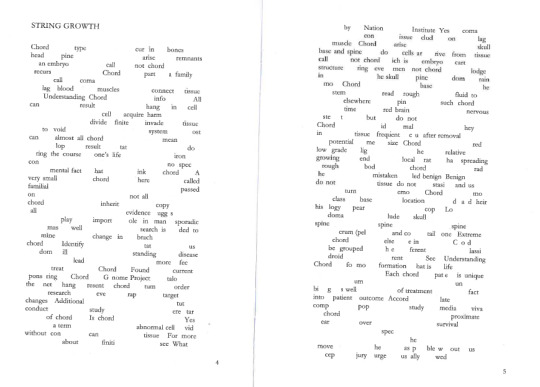
Erasure can expose sequences of nightmare at work in the lexis and syntax of the text on which it parasitically feeds. I am scared to go on the Chordoma Foundation's website, for fear that just reading or saying the word 'tumour' will activate some kind of malignant growth in my body. And so something of the word chord as a sonorous relation between materials (bodily, textual; textural, cellular). Chordomas are tumours often located in the spine and so I find myself looking for the undulating shape of a spine in the scatter-text of Tom's poem. My eyes cascade down textual spines. Why is it sometimes I otherwise latch upon a 'keystone' word which then extends with adjacent resonance? Musical abnormalities accumulate. Thought swells.
And yea I wonder how this fits into what you say about the poems being 'so smooth'. Like Lynch's waxen silicone ear. Because even though fragmentation makes me think of bits and jaggedness etc, there's this sheen of aestheticism to Tom's work that makes me think of gloopiness, fullness, thereness but also the glaze of potential nothingness. Like in Barad's sense, or miniaturised ecological window shopping - a la Morton's Romantic consumerism? Or do we get into the things themselves? What are your thoughts on the question of recalcitrance? Maybe cos he named a previous pamphlet Pedicure I've just got varnish on my mind. Things an insect might stick to, and be amberized in. Mm.
'[...] Phosphorus crystals may be white, red, burgundyor alight as urine passes'
I keep a stone of citrine under my pillow sometimes. It is supposed to alleviate nightmares and 'manifest abundance'. It is the colour of a rich, dehydrated piss and sometimes when I come back to bed after peeing in the night I think it's some kind of organ lain on my bedsheets, hopped out of my body, and I have to stop my heart and breathe. Is that syncope?
On the <topic of piss>, isn't there a sort of caustic quality, even to the smoothness? Like it is working at making a brittleness of its sheen? And that is what poetry is, cracking the veneer of language or something? Punctuational insects dwelling in splits and fissures? It is nice and cool in Tom's poetry, a place for thinning the self and dwelling. Even though the lexis is so rich and dense, it still seems slender somehow; there's a suppleness. Tease threads of your silk(worm).
Was thinking about what Lisa Robertson says about 'commodiousness' in poetry and what kinds of space there are for the reader here, because I don't think there is much space at all, in the conventional humanly readerly sense. Maybe what I mean by (straw man: Romantic) lyric, which requires something of declarative expansiveness? The density and clutter of specialist language in Body Work makes me feel like a worm, trying to hook my way lusciously into a line: 'espalier's / strains unfinished by the scarp trellis' ('Body Work'), 'rooted to a middle-ground / no more than motion defibrillates'. And I become a parasite on the body of the text, which is a parasite on the body, which is made up of millions of (para)sites. Para ofc meaning side by side, which made me think of Haraway's sympoeisis (making-with) but also, admittedly, Limmy's madeup psychic show, Paraside (lalalol what you were saying about the scrambling parallel universe maybe, is that a lalaLacian Real which necessitates ululation, stammering? Complex remixing musicality of language throughout Body Work as summoning?). Going back to my incidental Slowdive reference earlier, maybe there's a shoegaze thing here, like setting up these 'noise-worlds' which shimmer indiscriminately behind/inside/through the semiotic oscillations of lyric? Is shoegaze a form of sonic gouache? Well it is certainly an ontic form of seduction, where I can't pick out the instruments of expression but I look for them hungrily in the haze. And the idea that transmission between worlds (the living/dead, human/nonhuman) might require a strain of humour (like haha but also meant in the sense of bodily humours?). For instance, shoegaze is decidedly not a humorous genre, but it sort of works on bodily humours, sometimes giving me the bends, or the blurry spaced-out feeling of having one's pleasure receptor's caressed by sound. Was wondering how YOU experienced the space and physicality of the poems -- was there anything u found FUNNY or sufficiently sultry as to produce a long and gorgeous sigh?
Mm and aren't there these tasty, cute moments of wow like 'tropic glut' ('O--NE') and 'prism arousal' ('Body Work') and 'clamour to emboss' ('Sapling').
Come to think of it, there are quite a lot of trees in Body Work, at the very least between 'Sapling' and 'Copsing', but also resonance in 'Awning', 'Annual' (which mentions 'yield', 'Thicket', 'sky-light muddle' etc) and 'Georgel' (georgics, idk?). Something about sprawl and thread: like the action of branches as arboreal mirror for threads of viruses, threads of code?
Side note: Can a person in a crowd of people experience canopy-shyness? Emily Berry has this lovely poem about crying and canopies and language.
Ways to dwell in inertia, violence, suspense ('Poem for July') as a 'clearing' within the pamphlet? Body Work as a title seems to combine two distinct fields: car repair and alternative medicine (hence mention of plants, cancers and crystals). The question of holistic approach, therapeutics, restoration. The sheen of metal, the sheen of health. O wise one of la letteratura del contemporaneo, pray tell your thoughts on possible Ballardian comparisons? Like obv v. different but I was struck by something to do with the cut-up structures of The Atrocity Exhibition and the way erasure works in Tom's work (probably in a more precise, attentive way, like the specialist's collage of tiny skins and digits, as opposed to grander themes of mediation that explode all over Ballard's work? -- generalising for the sake of interest obv).
Longing for a 'carvery [of] / uncommoning / rave'. Some kind of party you'd give up your skin for (is skin mere synecdoche of identity here?). Maybe the rave is what you were saying about scrambling.
Anyway, I hope your essay is going well. I must go read Hillis Miller's thoughts on Ariadne's thread, maybe make a tea. I've been getting these headaches lately, dawn to dusk & beyond, like the kind you get after being swimming (chlorine headache) or after crying (hormone headache). Pressurisation. I wonder if I have a parasite in my brain? So tonite I will probs lie awake, sleepless, listening for tinnitus :(
With warmth, Maria xxxxxxx
p.s.
Of course, by the time I get to the end of rereading I realise that it's only white marks being revealed underneath because literal holes have appeared in the Body Work cover, like some kind of fungus has been eating away at the book, performing another erasure.
Denise Bonetti <[email protected]> Fri, 1 Feb, 12:15 to maria.spamzine Dear Maria, Once again my legendary inability to reply to personal emails within a reasonable 1-month window manifests itself. Invoke my Scorpio moon (?) etc. I love it when people are like 'RIGHT - enough Facebook for me, email me if you want to talk etc', because that sounds like a nightmare to me. Long live IM! Long live the short form! (quite rich coming from someone whose job at the moment, I guess, is to churn out a dissertation?)
But then you know what I was thinking - someone like Clark Coolidge, for example, can get away with long form, intense long form. Not only get away, but own that long form. That long form I'm into. Clark Coolidge drown me in words and I'm fine with it, because he never dilutes, there's never any stagnation, you know what I mean, he just goes and goes and goes and you're like !!? YES!! HOW ARE YOU DOING THIS!? He just never runs out of steam. And I'm thinking of Coolidge because you mentioned crystals as agents in Tom B. (cf. The Crystal Text, how would the crystal speak etc), and of course because both Tom B. and Clark C. are just doing mad things with language, bold things and exciting things... They are like scientists you're friends with but who (maybe) don't like to talk about their work, then one day they decide to let into their basement lab where they've been secretly working on the most complex, organic, project for years, and they're like, don't freak out, here it is:
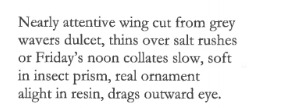
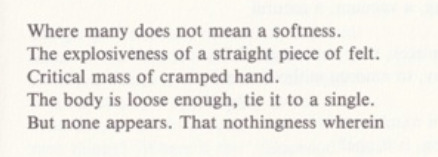
(Sorry for terrible quality [#postinternet] First is Tom B., second is Clark C.) Body Work looks quite controlled in form, visually speaking, with its vaguely justified lines, BIG symmetrical margins.. even the scattered pages look orderly! Like the bit of 'STRING WORTH' you sent. Which going back to your erasure thing, it makes me feel like Tom B. is giving us an OXO cube of his writing, all concentrated and delicious. But then my response is - show us more!!! Which rarely happens because I am scared of long form. And email. And dissertations. I also LOVE what you said about how Body Work combines car repair and alternative medicine!! That is absolutely spot on. Like the material, pragmatic tinkering motions of his writing, the referral to structures and the intention of like, see how far we can bend them and push them, but then it is never as dry as that! Very sweet motor oil. It's very kind poetry... generous! (A word that my friend Phoebe used to describe a certain type of poetry at a party last week and I thought, very interesting). Linguistically generous because it offers so many networks of reading, but then also.. approachable? As approachable as experimental poetry of this kind can be. I'm sure like, DANIEL would not think this is approachable lol (#COYBIG #romance). Which, fair enough. But if you're a nerd for this kind of poetry, then yeah. Like this bit from 'ANNUAL'??

*Cries!!! This is like you said, healing!! I feel looked after! 'Stomach prefers sound to day-to-day camphor'!!! Honestly what is this! So touching, so simple!
(Btw, I started experimenting with aromatherapy in my tiny room lol, do you know how to stop the water from boiling in the oil burner??)
Thanks for sending such interesting ideas over, I have to shoot to a seminar ! PPS: I saw Steven Connor in the English library yesterday (Oliver pointed at him silently like !!!!!!!!!!) so I kind of followed him to see what his approach to book browsing is.. very natural-looking and orderly? Surprised. Love the guy. *bubble sounds*
Lots of love Maria ‘let’s see where the spirits take us’ ur the best
xxxxxxxxxxxxxxxxxxxxxxxxxxxxxxx
Maria Sledmere <[email protected]> 6 Feb 2019, 23:19 to denise.spamzine Dear Denise,
Makes so much sense to map your message sensibilities onto your taste in poetry! I am so torn between the percolated richness of the email, its classic deferral (omg hun I owe you a million emails!) through a sort of quantum dimension of procrastination, and in opposition the sugar rush nowness of IM. I am such a frantic typist that often I send the wrong messages or cross my wires or just gush too much, so email is probably a safe option for me. There is all too much blue in my Messenger windows...Temptation of x's and endless emojis. But such a beauty to IM and texts out of context, like I wonder how many people read your probs too late 4 a snog now :'((( as micro-fictions, versus poems. I have a whole folder of screenshots on my computer from things that happened on Facebook that I have no memory of. Something about the Romantic fragment, accumulating ruin.
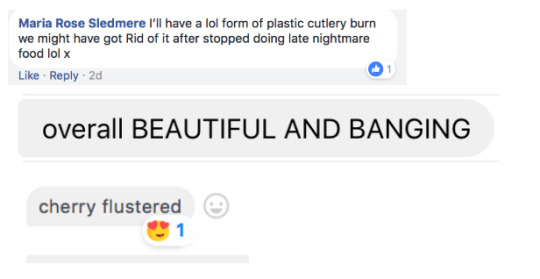
(btw) I feel like these extracts also shed light upon Body Work somehow. Biodegradables versus hard minerals and synthetic matter. Inner/outer. Flush. Tbh I think the middle one was from you?

Yes the dissertation, the dissertation as labour; it's like you have to find your scaffold first. Sometimes I feel like the scaffold in that wonderful Sophie Collins poem, 'Healers', and I write and don't notice myself and suddenly I'm so there, but the scaffold is secretly taking her bolt pins out the more I write around her. You can only be so respectful to your scaffold when she's so in the way. Gemini problems?Duality; structure/content. What is it Tom McCarthy says: 'structure is content, geometry is everything'. I want to be a wee fractal in a sequence of massive refraction. Is that how it works? Back to scaffolds, maybe we need to find the kindest mode of dismantling, and that's when you work into a form or something. And then also the more organic structures! So for CC it's the whole crystal thing, and working out of crystal logic. And then you just go and go and it's wonderful, much extravagant fractality, almost like poetry as virus, replicate replicate, grow, change. Mm, it's so good. My friend Kirsty did this mad poem about a tree, I couldn't tell if it was a story or poem, it was just branching out in a way that seemed hungry, necessary, spreading its roots. She said she wrote it in a rush! As if trees could rush! I like to think she inhabited a concentrated moment of becoming-tree, like she was a myriad in the roots or leaves. I don't think it could have happened without the tree, you know? But also the tree was almost entirely absent, it was like a ghost of form. Maybe I forgot how it goes. The lines looked like branches or something. Can you have long-form concrete? Concrete I guess by necessity is long-form. It takes a lot of energy to make. People are building houses out of mycelium instead, which is rad. Talking of roots and that, I just wrote 26k words on ecopoetics & t h r e a d s over the past fortnight and it was kind of that process, like letting a sort of tapestry take hold and I was maybe just one more thread, I was hardly doing the weaving, everything was moving around me and I wanted to wriggle into more and more gaps. Becoming-thread, perhaps. The next step is to slack and cut, which is exciting. Where to even start?
Your description of the complex, organic project is so gorgeous. Poems slow-cooked in a lab with tender organic care. My two scientist PhD pals are always gramming these beautiful pictures of crystals they're growing or mad wave patterns on screens. And we go for lunch and I'm like what you doing this afternoon and they're like, Oh just shooting photons. And is that much different from spending your afternoon writing poems? (Yes, they'd groan). I'm just chasing bits of light. Reading Tom B's work it's this whole precision thing, the actual inhabitation of process as such, so you see the energy buzz between things. I don't mean to say simply this is atomic poetry or poetry as tool analysis. It's more a betweening.
Isn't it super difficult to write non-anthropocentrically and really inhabit micro-relationality and also sound interesting and sexy in the way Claire Colebrook (she has that great essay in Tom Cohen's Telemorphosis) describes as 'sexual indifference', i.e. that threat to heteronormative reproduction that 'has always been warded off precisely because it opens the human organism to mutation, production, lines of descent and annihilation beyond that of its own intentionality'? Well anyway Body Work really works this way for me, it's like a poetics of sexual indifference that is nevertheless charged with desire you can't really predict, it's something in the frisson between objects and lines and coils of form. I think of crystal charge, iPhone battery (mine's always dying, Gemini trait 100%), engines. Neat miniaturisations of entropy, surge, spike and flux. When the 'I' comes in I'm like hey, what flow are you? It's actually so satisfying to quote these poems as fragments btw, they can do so much on their own as much as in poems and pamphlets, I wonder if that goes back to the accessibility thing. Like the absolute charm of a line as auto-affection:
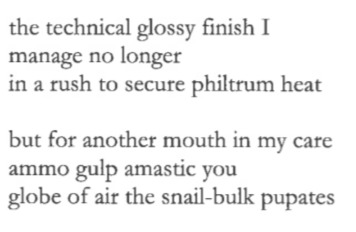
This bit is from 'Temper' and I go back to my point about the flush/fluster! Globe of air/your *bubble sounds*. Isn't everything held so neatly, and yet it never feels neat, it just feels sharp and sparking, this 'technical glossy finish' like a really nice car, the body paint of a poem, its prosody so tightly held it feels more surface, a selection of hues and textures. And the erotics of the text or at the very least its pleasure is the shift between bodies, synecdoche, yes you could say bodies without organs but things in themselves are also important. Maybe another poet who does this is Sylvia Legris, she writes these apparently impersonal poems filled to the seams with specialist lexis (you have to have like twelve tabs open per poem to get it), but there's an affirmative humour and energy that feels v much a personal sensibility, a deliberated skewing of world that splices the poet's agency among items, artefacts, language. I mean how nice are these poemsshe published in Granta. I feel like I want cutlery to read them with, if that makes sense. Maybe a scalpel, for the succulence. The appearance of an ear again!
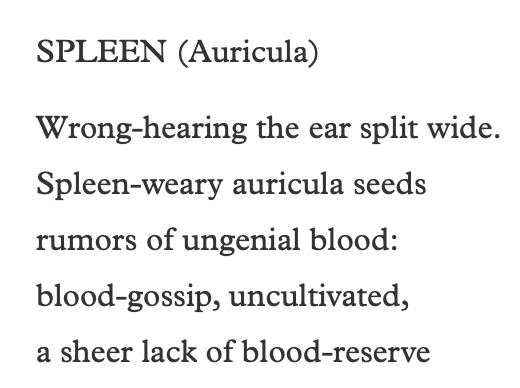
And then the beautiful metallurgy of this line from Tom, like somebody pierced my ears with perfect silver and it let all the demons out:
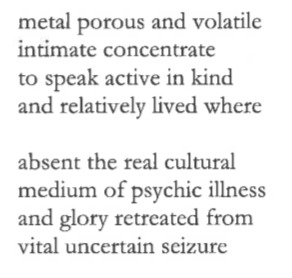
I am worried about what a certain seizure would look like. When we talk about vitality is it a willing naivety towards matter qua matter, as if we could just step out of correlationism? Such thoughts for 11pm of a Wednesday night. I can't help but think of the body image that Elizabeth Grosz describes in Volatile Bodies, kind of riffing off Paul Schilder: 'What psychoanalytic theory makes clear is that the body is literally written on, inscribed, by desire and signification, at the anatomical, physiological, and neurological levels'. And yeah, cool, what about the nonhuman body also? Has anyone done a really good psychoanalysis of the object. Parsed its psychic striations (traumatic or pleasurable residues of every microbial, huh?). In fact, what about the psychodynamic model of actual icebergs? Time we started literalising the matter of metaphors, absenting 'real cultural / medium' and filling with meltwater, fire and flow. Maybe it comes down to a bead of ink, the 'intimate concentrate' which is Lucozade, hangover piss, sick pH levels. So yeah, Body Work for me is this totally seductiveintersubjective space which actually works out pretty visceral states, sometimes disembodying me into a more fractal, mineral or bacterial being. I could start talking Kathryn Yusoff and geomorphism too, but maybe enough strata for one email? Plus I'm mixing my metaphors, I'm sure, mostly because I'm still morphing, dissolving inside those lines. I think I ate too many OXO cubes.
As for your oil burner boiling, sounds like you have an overactive candle? Maybe try a cooler tealight, nestle it to the back a little to redirect the strength of the flame? I like rosemary oil for remembrance, cranberry for comfort, ginger for energy. That line about resin is so nice. I was in Crianlarich at the weekend and my friend Patrick found this massive log and he carried it for so long that you could smell the resin on his skin, it was amazing. I keep thinking about the word 'pitch' and lush tree-ness, and the Log Lady in Twin Peaks and poetry you can chew like new molasses, prior to melt. Is that how it works?
Somebody is smashing glass into a bin in my garden and probably I should just close the pamphlet...
...but it's like a delicious pdf that gives infinities...
Yours in multiples & cherryish flusters,
Maria xoxoxoxooxoxoxoxoxooxoxoxox
1 note
·
View note
Text
gotd season 2 rambles
I finished GOTD two/three weeks back but then was immediately swamped with real life work after that. Finally had time over the weekend to pen down all the thoughts swirling around my head!! I was thinking about whether to make this post or not but no one I know irl has watched this and I kind of want to remember what I felt about the drama so well. Here goes nothing!!
[Though… 慎入!!Beware of entering, for I just finished writing this post and I’m boggled at how utterly long + incoherent + messy this post is]

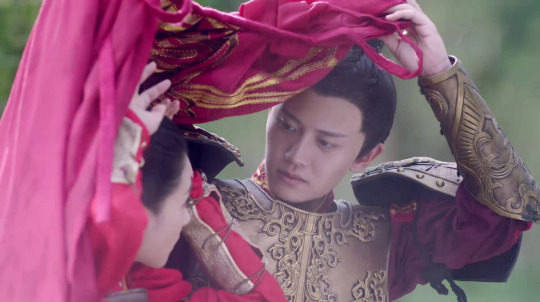
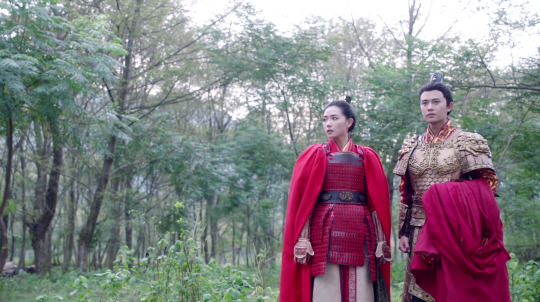
- I was rather worried about how Jingyao would play into the whole picture marrying into 楚王府. But in the end I guess it wasn’t thaaaaat bad (minus uhm, her poisoning Li Chu to force Zhenzhu to leave.) I can deal with drama like external factors forcing my OTP apart but what I can’t deal with is if the OTP itself fractures apart. So (at least in my pov) even though the director did all that annoying slow-mo spinning around in circles thing with Jingyao, my intepretation of Li Chu’s 眼神 wasn’t one of 动心/暧昧 and instead was just concern/maintaining a distance so I guess I wasn’t that mad about it….???
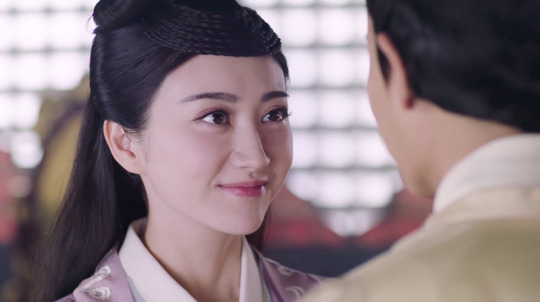
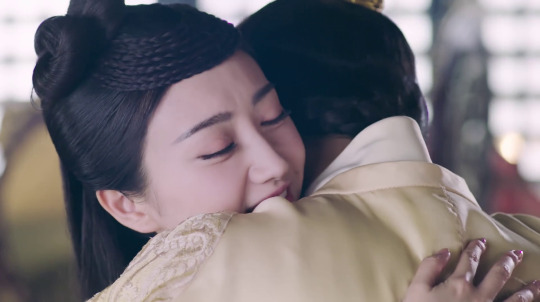
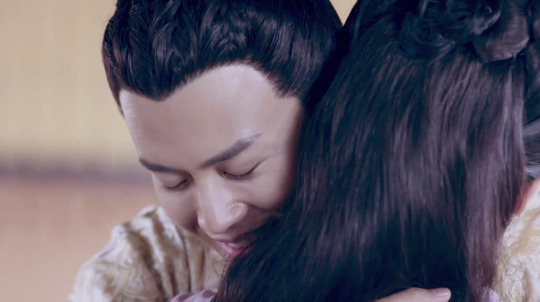
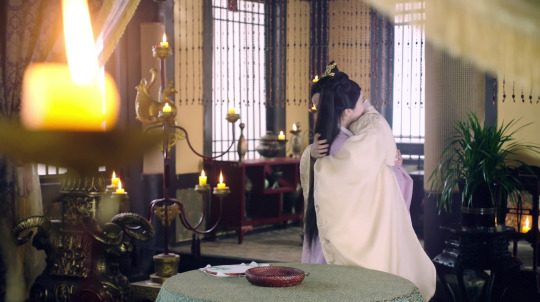
- OTP~~ OTP!! Jing Tian is so beautiful with her hair down :3
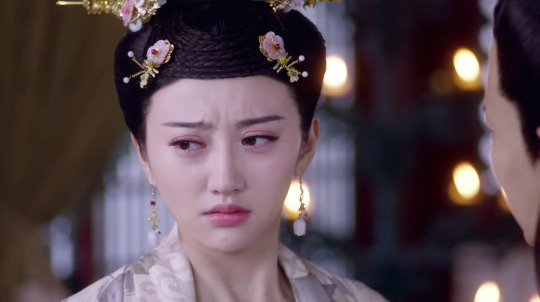
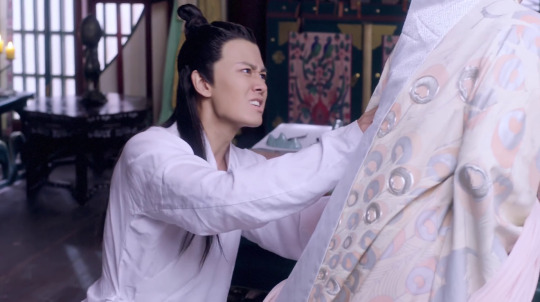
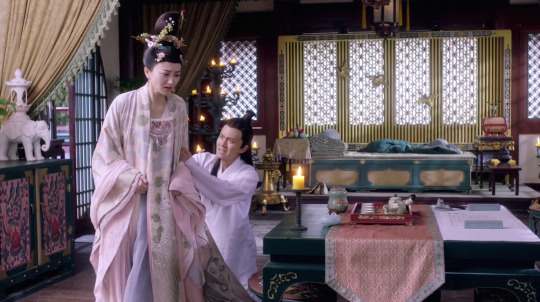
- TBH i enjoyed watching Li Chu and Zhenzhu in the battlefield and all that pining and stuff but I found the way they ended up there kind of… contrived. Though what Jingyao says does have its element of truth, but really?!?! Poisoning?!?! Internal drama?! Couldn’t it have been a more… dramatic reason? Like maybe a political maneuvre making Zhenzhu realise that Li Chu will be ‘burdened’ with her around or smth, then maybe Jingyao coming in to stir the pot, then Zhenzhu making the choice to leave. I just felt that the whole poisoning thing was kind of loophole-y. If Moyan Chou can research and link it back to Jingyao, shouldn’t Li Chu be perfectly capable of doing so too? Yet in those two years he never suspected anything. Though maybe it could be explained by him being too blinded with anger and disappointment at Zhenzhu that he just focused on his princely work in those years rather than sparing any thought on his love life. And I’m not sure how this whole matter ended up being resolved? When Li Chu found out and confronted Zhenzhu about it, she was still all ‘I can’t return back to you because you might come to harm if I break the oath I swore’… But in the end they just kind of ignored it? (after confronting Jingyao). Hm or maybe I missed something hahaha.
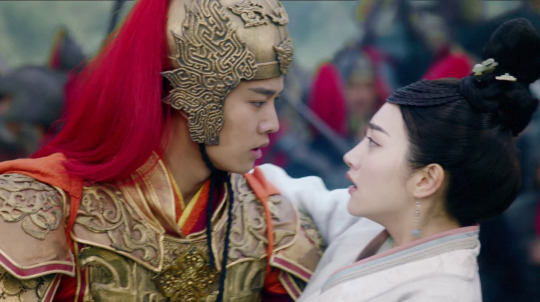

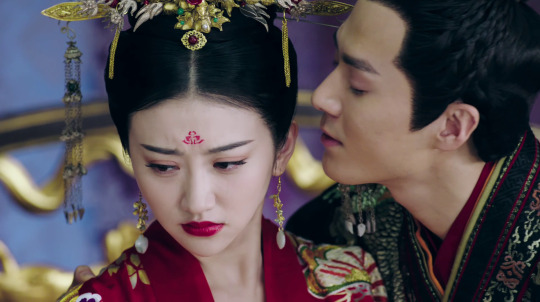
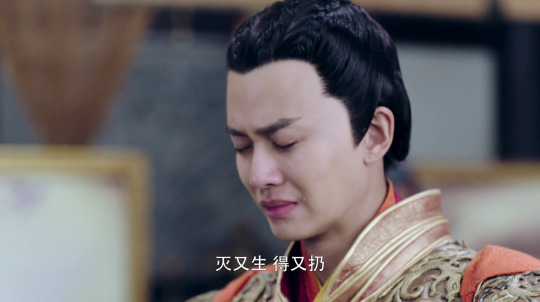
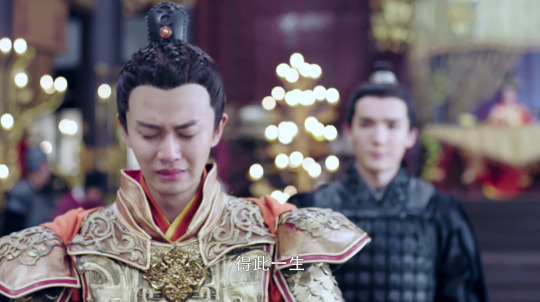
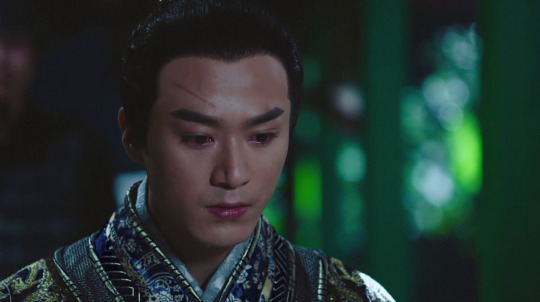
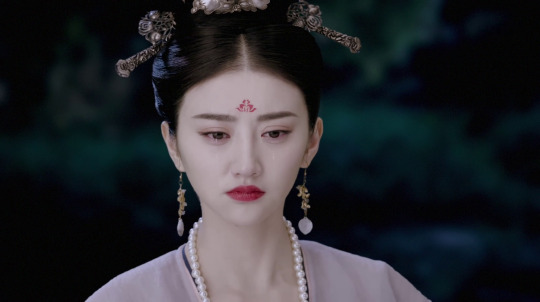
- still the whole arc with them on the battlefield/her becoming the Empress of Yan was still quite entertaining hehe. Pining! Fraught looks! Tears! Angst! I must say that Mao Zi Jun was much better in S2 than S1. In S1 his acting just seemed to be glaring and sticking out his eyeballs hahaha. I guess his forte is in all the emotionally charged scenes… Though I still don’t really care for An Qingxu. Also Zhenzhu’s outfit in the Yan empire was quite pretty too :3

- On a really random note, lives if you are not a main character in this drama (though actually who am I kidding… you don’t escape from death being a main character here *coughing fit*) are so worthless. I swear there are people dropping dead like flies in every episode… TBH back in the Uyghur ‘you-killed-my-father-prepare-to-die’ arc of the first season, I kind of couldn’t deal with how so many of Li Chu’s men died along the way of Li Chu searching for Zhenzhu because Li Chu refused to rest/take a chill pill when weather conditions sucked.
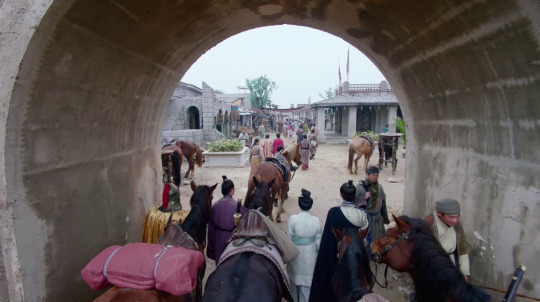
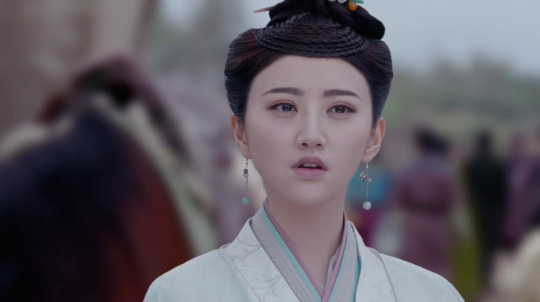
- It’s really a pity that they had to resort to excessive greenscreen and body doubles in the last Uyghur arc because it was really quite obvious and kind of affected immersion in the story. I’m guessing Jing Tian couldn’t make it for that filming period? Or maybe they were rushing and had to be split up across filming groups. Like… it was quite jarring to have everyone else in the scene then bam! Switch over to Zhenzhu awkwardly greenscreened in. Or some scenes where it was obvious that Allen wasn’t even interacting with Jingtian but rather a body double.
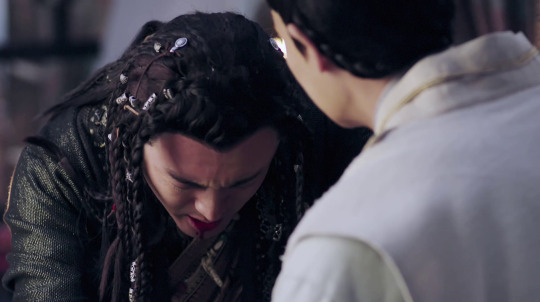
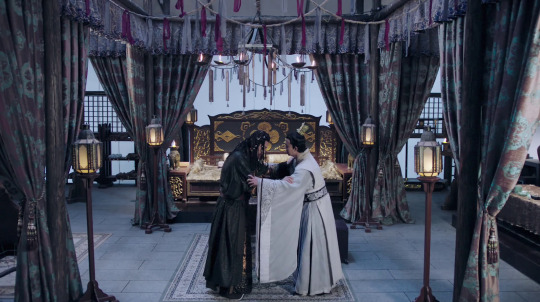
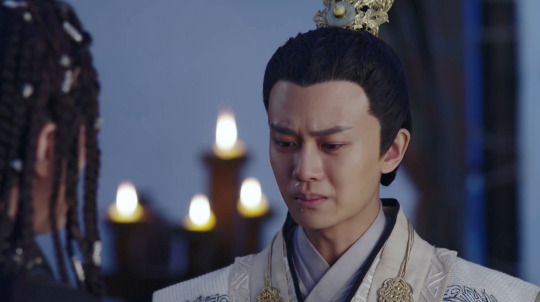
- Moyan Chou x Li Chu. Ouchhhhhh (especially since cracks kind of appeared in their friendship with Li Chu marrying Dugu and Zhenzhu using Moyan Chou to get a divorce from Li Chu). I’m really impressed by Allen’s acting ;_; like of course he’s still kind of raw in places but like wow there’s a 灵气 to his acting and he is exceptional considering how it’s his second time playing male lead. Of a 92 episode drama, no less. In the scene where Moyan Chou and Li Chu drink together for the last time, his tears just kept on flowing non stop! Idk if anyone who reads this has the same experience of using the cliche phrase ‘他的眼泪像断了线的珍珠纷纷落下’ (his tears flowed down like a broken string of pearls) in chinese compositions in primary school but that’s the first thing that popped to my mind when I saw this scene hahaha.
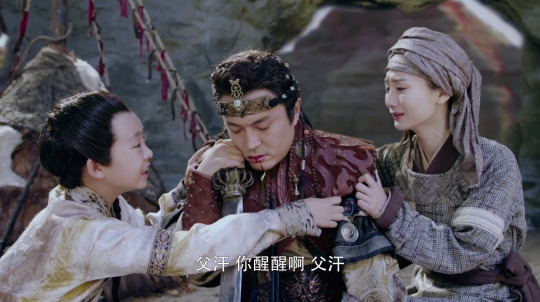
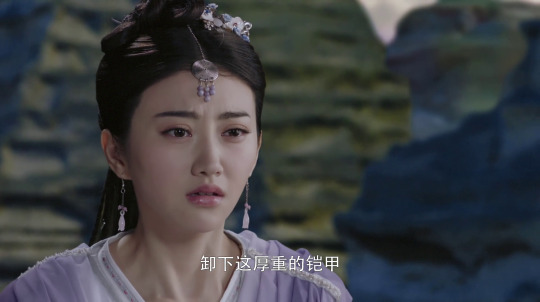
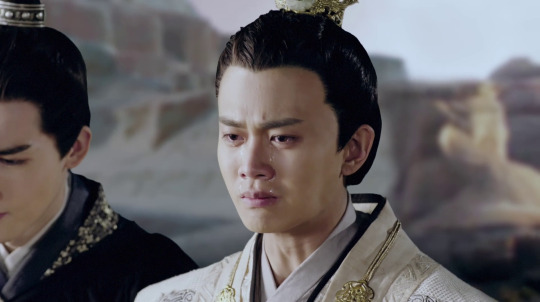
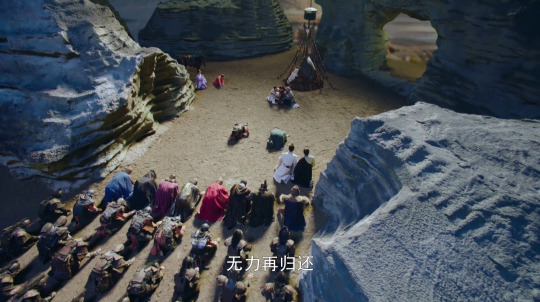
- anyway, compared to this drama’s standard death bgm 荣耀, it was a nice touch to change it up to 为江山 which fit perfectly with the setting and nature of Moyan Chou’s death. It was pretty goosebump inducing when the music crashed over the speakers as he slumped down and the entire congregation of people at that intersection of stones (?!?!) began kneeling and wailing.
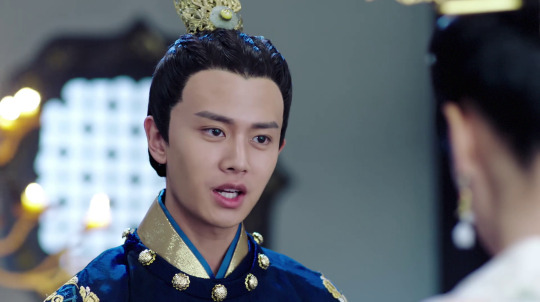
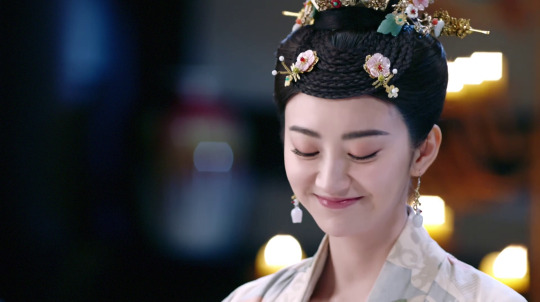
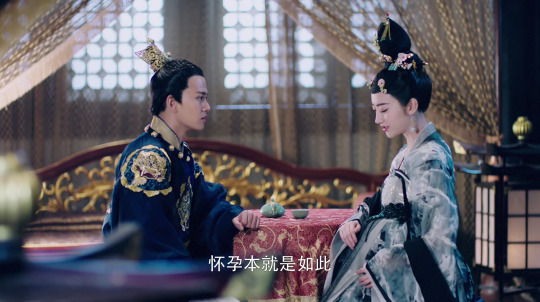
- again props to Jing Tian’s and Allen’s acting. Though Jing Tian wasn’t that consistent in all the crying scenes (though she has so many it’s kind of hard to be hahaha) but i really think they handled the growth and development of their characters quite well. The Zhenzhu and Li Chu you see at the end of s2 are tangibly different from them at the start. Even if they banter with each other, it’s very different in vibes from the early days - more measured and serious. And the change happened quite subtly? imo at least :3
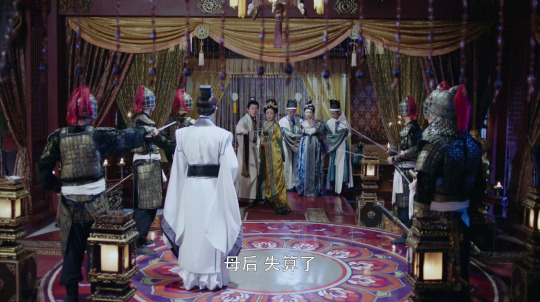
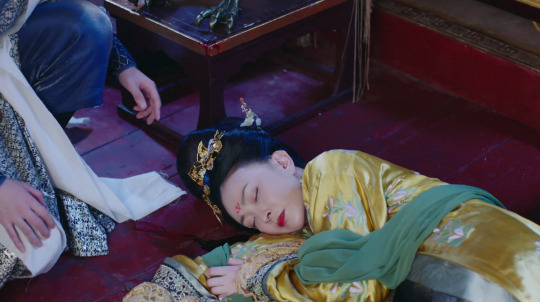
- personally felt the whole way the showdown with Empress Zhang took place was kind of… anticlimatic… but I guess that’s kind of how it went down in history hahaha oh wells.
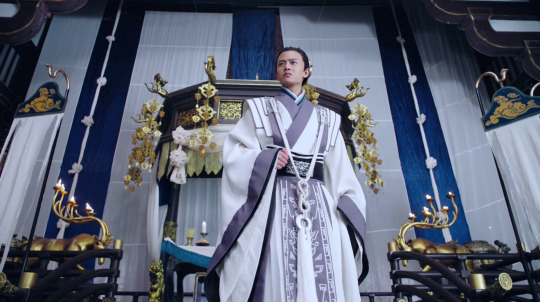
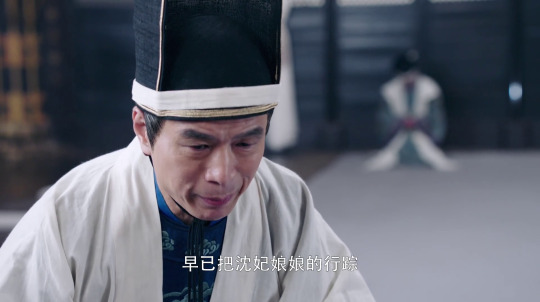
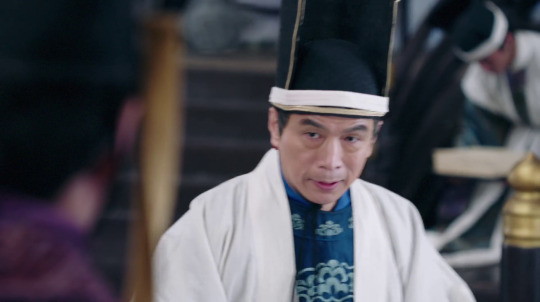
- hints of how even though Li Chu became emperor, there’s still trouble looming in the distance with Li Fuguo still maintaining power etc. was kind of disturbed reading real history because the image of Daizong having to pander to eunuchs and all that kind of isn’t really aligned with the capable Li Chu we see in the drama (oh the woes of dramatisation of historical characters - i felt the same reading commentary about 14th prince back in the day after watching/reading bbjx) but i was thinking about it and i realised that i can kind of accept that! because there were quite a few scenes throughout the drama where Li Chu was lamenting about how he feels so helpless because he can’t do anything about the political situation/corruption/etc, how even though he has the acumen to perceive and see what all the parties are doing to procure power for themselves he cannot do anything about it. so taking this aspect of Li Chu into context - how he definitely is smart and capable, but that doesn’t mean he isn’t susceptible or is invincible given how the entire tang court is deeply mired in politics and power play, i guess it’s not that far of a stretch to link this Li Chu to the Daizong in history books (who wasn’t a baaad emperor too anyway)
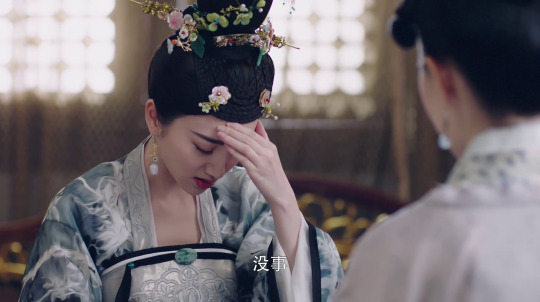
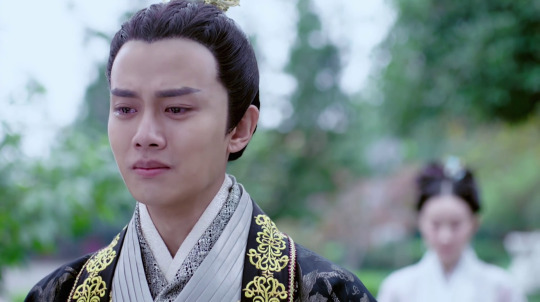
- the whole Zhenzhu being 油尽灯枯 at the end was also kind of… random and a little contrived imho but given her life circumstances i guess it can be justified and is a logical way to end things, since they do ultimately have to adhere to the historical ending of Zhenzhu going missing and Daizong never electing an empress during his rule. (I have to say, my favourite arc in this entire drama was probably the 10+ eps of separation when the Anshi rebellion kicked in, because the conflict felt very real and organic and the stakes felt really high, so the senses of urgency/loss/anxiety/despair were really heightened.)
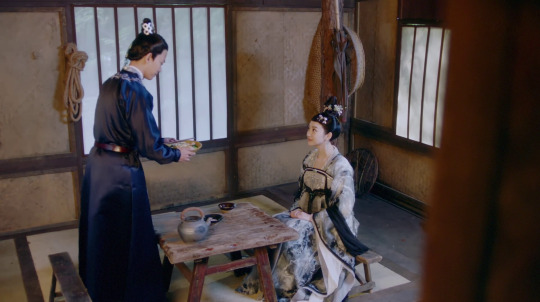
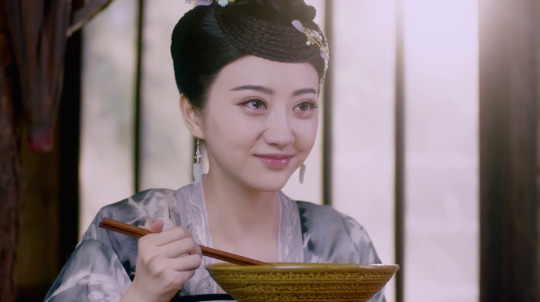
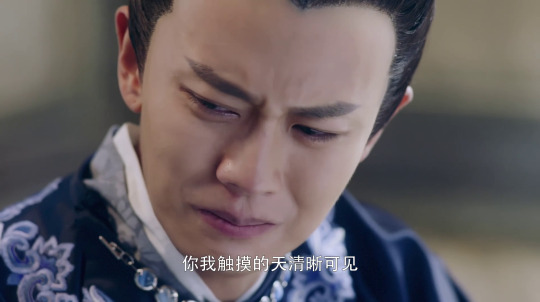
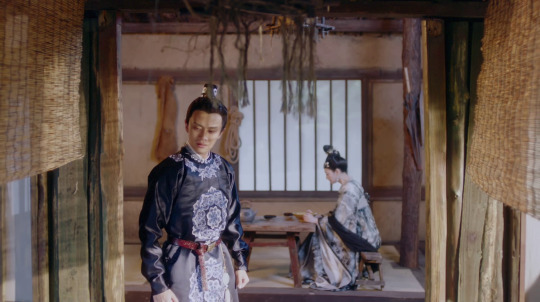
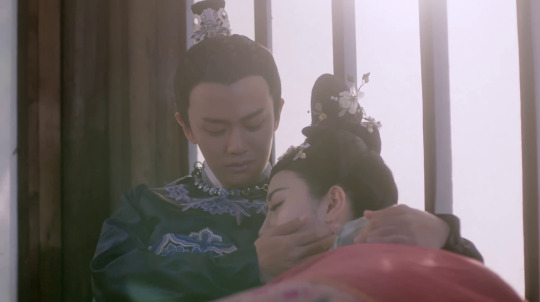
contrived as it may be to me, that didn’t stop me from feeling deeeeeep despair and sorrow through the last few eps ;_; him making longevity noodles for her; them being in the same space that holds so much meaning to both of them, the little wooden hut where she professed her love for him, yet both of them lost in their own separate thoughts; them weeping their own separate tears; him holding her as she takes an afternoon nap, knowing that this is probably one of the last times he can do so…
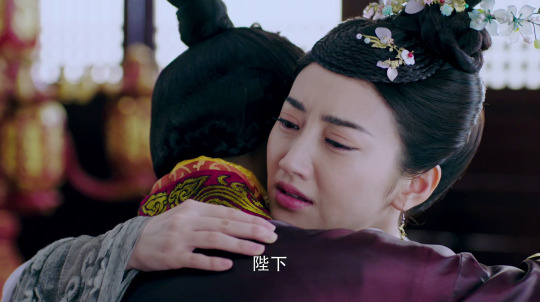
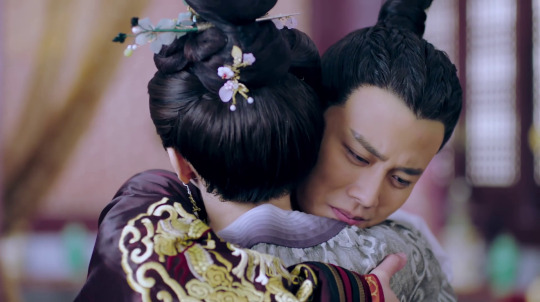
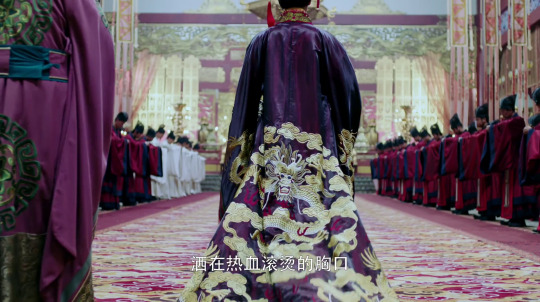

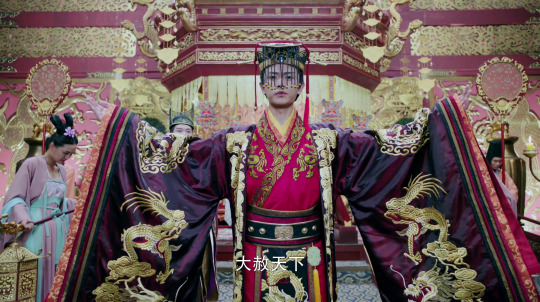
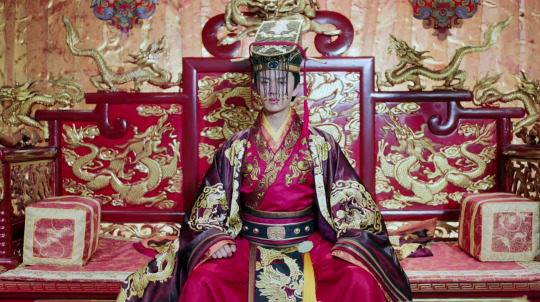
and his coronation ceremony/the day she leaves for good from his life. their last hug - he was the very definition of 依依不舍 ): Him walking down the aisle (HAHA is that what it’s called) of the Tang courts, dressed in stately regal emperor garb, the world is his yet he is so utterly alone. 所谓“高处不胜寒”! (haha though this line was not yet in existence during Tang)
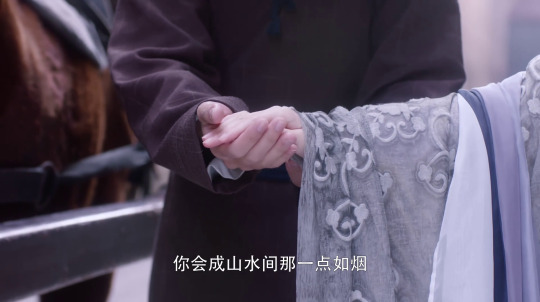
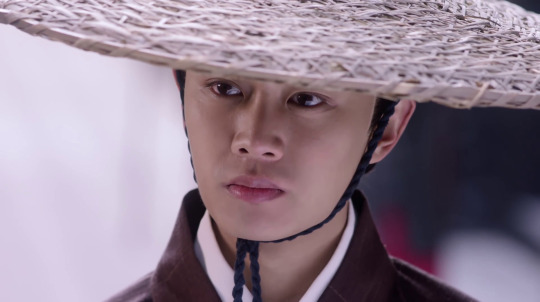
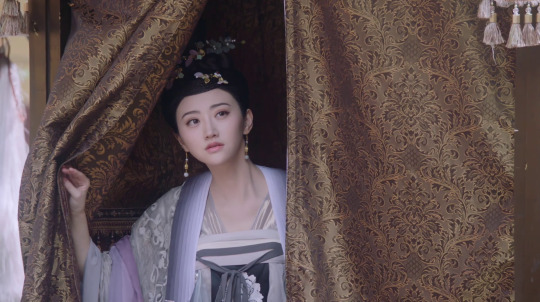
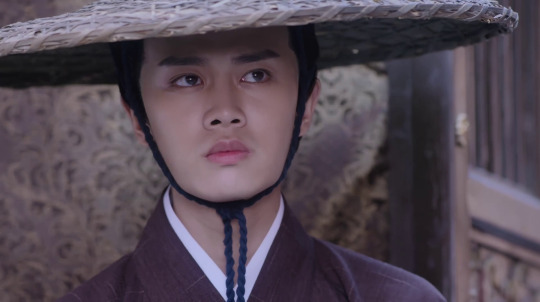

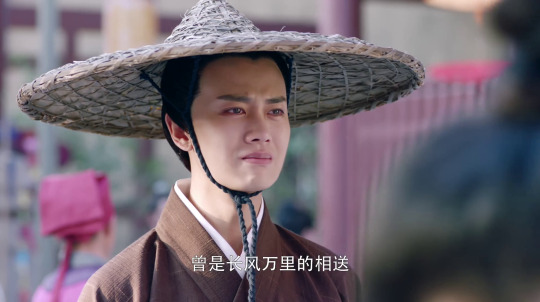
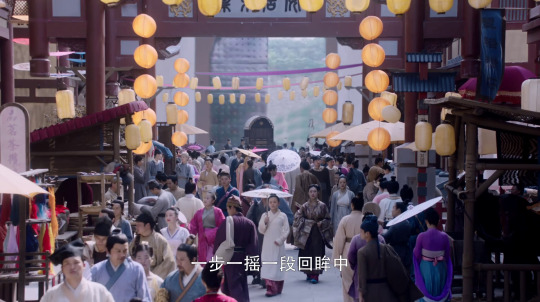

and the ending was so poetic in all its tragedy and hit all my buttons hahaha. Him dressing as a cart driver to send her off for the last time → !!!, her stopping at 醉仙楼 and coming out of the carriage to take a look at the place where her and her Donglang first met → !!!!!! (I think this really got to me because I have a huge fondness for their entire first meeting haha. And this + how she hallucinated Dong Lang in that red outfit when she was semi-conscious to me kind of shows how ultimately she loves Dong Lang for who he is as an adult, and not because he is her 太湖公子 from her childhood, which is very important to me?!) And lastly Li Chu riding on his horse, surveying the mountains and landscape that Zhenzhu disappeared into, the 江山 that he owns… aka really ‘一人一马一江湖’, as the drama oh so helpfully foreshadowed for us in the first few episodes.
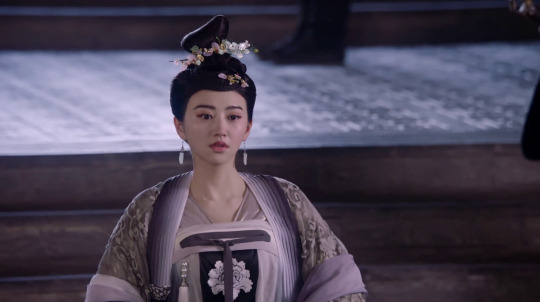
- Since I’ve mentioned 为江山, as I’ve said before, I really love the OSTs in the drama! But while previously the bigger ‘hits’ (in a sense) like 夙念 and 荣耀 were stuck in my head, these past two weeks, I can’t help but keep on replaying 素颜 and ��韵 on loop. (though I still enjoy all the songs - except maybe the Jike Junyi one which is still not bad but just doesn’t get to me like all the other songs do… maybe because it was never played in any scene throughout the drama? (except the ending credits of s2. which I skipped everytime.) (speaking of which, s2′s opening theme song became 荣耀 but they didn’t correspondingly change the opening sequence which was so nicely timed to 为江山, which is also more regal and had more oomph more befitting of an opening track!! that was quite sad ):))

And especially for 素颜 (Unadorned Beauty), omgggg the lyrics nearly killed me when I sat down to properly read it at the end of the drama. It’s played twice in the drama - once in the beginning when Zhenzhu and Lin Zhi were sitting for the consort selection tests and once in the end when Zhenzhu leaves the palace (and Donglang) permanently for good. And omg the lyrics really fit perfectly?!?!
→ The verse/first part of the song: “你是春的使节 让残雪融解 / 染成青黛的天 等著细雨停歇 / 你素颜 裹着云烟 诗意了远方 湿润了心 / 闭上眼 姹紫嫣红都不觉甜 只为你的容颜” - basically just really beautiful lyrics about how you are the envoy of spring melting the remnants of snow and how your bare-faced/unadorned beauty bundled in mist lends poetic flavour to the distance and how all the beautiful flowers pale in comparison to your beauty blablabla. The first half of the chorus too: “豁然间 春光如练 / 渲染了 你的出现 / 最留恋 不是云巅 / 是千万里朝颜和暮雪” The whole song just describes Zhenzhu to me, and in these particular lyrics I think about Zhenzhu in the early episodes, fresh and dewy-faced, dressed in pale pinks and whites. I’m just imagining the verse + first chorus being Li Chu’s inner monologue about Zhenzhu and my heart feels all squishy kyaaaaaaaaa
→ The second half of the chorus: “梦回间 春光流泻 / 归去在 落花时节 / 待离别 青空绵绵 / 你会成山水间那一点 如烟” basically talking about how as time passes, she will leave when the flowers fall, and become a dot in the landscape like a wisp of smoke… how apt ;_; and okay here I’m just babbling nonsense but like all the terms like “青空” “山水” “如烟” really fits her costuming in the last few eps which had 水墨/ink wash painting vibes
(↑ i’m probably overthinking this way too much ahaha)
[on another note, some other particular lines in some of the other songs that I just really liked (i have random feels for sentences that I think are really poetic. though it may only be me who thinks so hahaha)
为江山:“挥手时飞扬飘零的黄沙 蜿蜒于驰骋豪情的天下” and “铿锵的温柔 忠义的绵绸 此情动我幽幽” like all the juxtaposition between toughness and softness… (uhhh it made more sense in my head). this entire song is Li Chu’s life ;_;
唐韵:okay no I went to search up the lyrics again and I want to copy the entire thing over HAHA. I love how the lyrics, true to the setting of the drama and the name of the song (how do you translate 韵 properly? it’s such a nice word haha), incorporate elements of Tang inside it. “釉烧出 多色绚丽的斑斓” or “浸润出 三彩交融的璀璨” - mentions of pottery/sancai glaze that flourished during Early Tang. Or “昔繁华 已苍芜” - befitting the backdrop of the drama - Tang the flourishing golden dynasty at the precipice of its dwindling. And for some reason I just love phrases like “静谧千年的思念” and the whole of the second half of the chorus: “愿你记得 穿梭人浪中一瞥 / 临摹也不能复刻你容颜 / 墨浓映画眉 / 朱红落点唇 / 只盼伴来生共偎”
为你成全:my favourite line is “锦绣长安夜 / 似昙花惊艳”!!
i think i just really like imagery in lyrics hahaha. i like 荣耀’s lyrics a lot too. in comparison i actually think the lyrics of 夙念 and some parts of 为你成全 are pretty standard drama ost fare… though they still serve their purpose well in inducing appropriate feels in various scenes.
–
This series of bloopers/original voice clips released by one of the production companies attached to this show is like a soothing balm to an injured heart after watching the ending. And the last video in this series - aww the entire team really put in so much effort to film this show, and it shows in the acting, the props, the sets, the costuming, the music (excluding awkward greenscreen and s2 editing). ANDDD watch from 13:52 onwards!!! A small Easter egg - Allen’s original soft soft voice going “珍珠,你总算回来了……” welp I’m gone
s2 was ultimately a lot weaker in many aspects than s1, and tbh the entire plot of GOTD is riddled with well trodden tropes. But I still have so much fondness and love and feels for this 92 episode drama I mainlined in three weeks (and then promptly regretted because real life came cascading down on me soon after that) :3 It’s definitely an engaging drama that had quite a lot of effort put into its making, and with it’s length there’s something for everyone - (1) an otp that will make you squee (2) endless angst, tears and misery (3) palace politics that are relatively quite complex for it’s 古言 status (4) some harem-esque drama for 后宫戏 fans (5) battle scenes, war tearing apart otp bringing about more angst… et cetera. Considering how I quit dramas at a drop of a hat, I’m pretty impressed that I managed to complete this haha xD
shall end off with a short 花痴楼!
《帅帅的殿下SHOWTIME!》
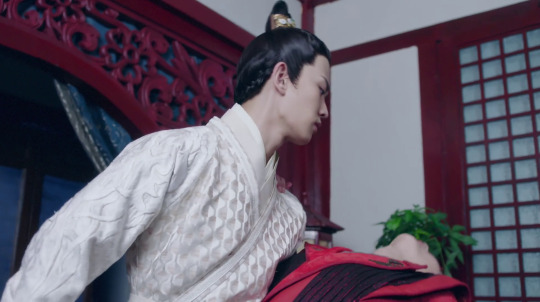
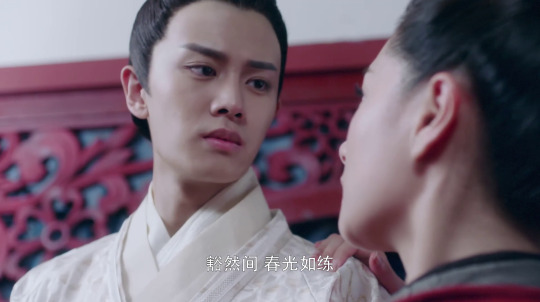
虽然在跟别的女人转圈圈但仍非常帅气的殿下!

微醺醺的新郎装殿下!
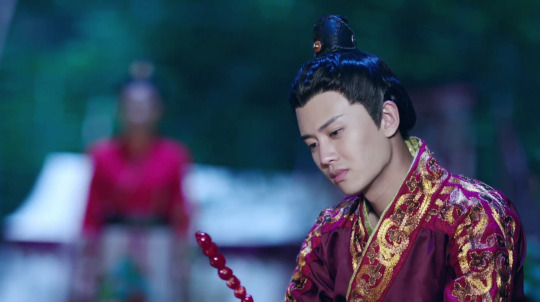
睹物思人的殿下!
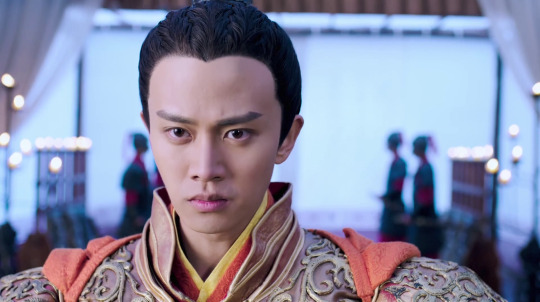
穿上盔甲,眼带杀气的殿下!
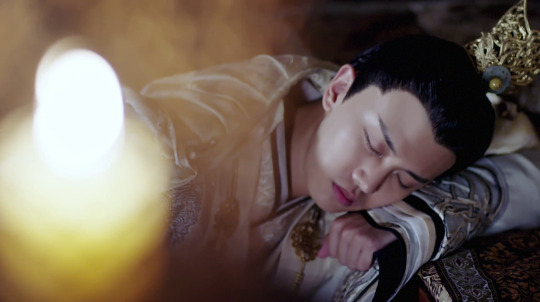
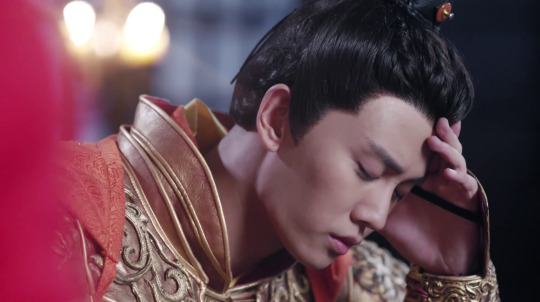
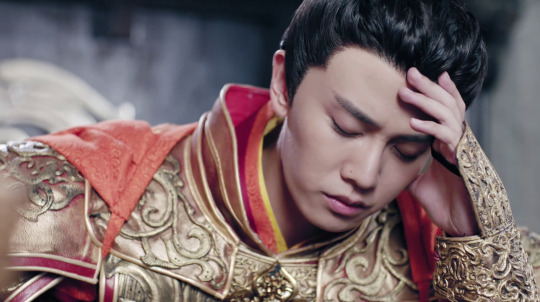
闭着眼,姹紫嫣红都不觉甜的殿下!
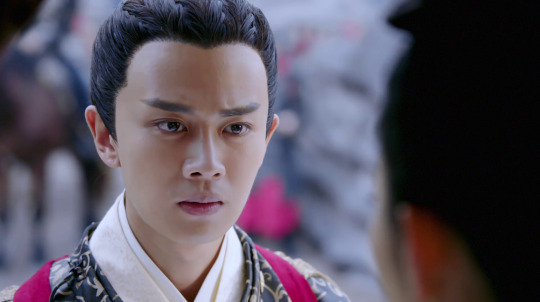
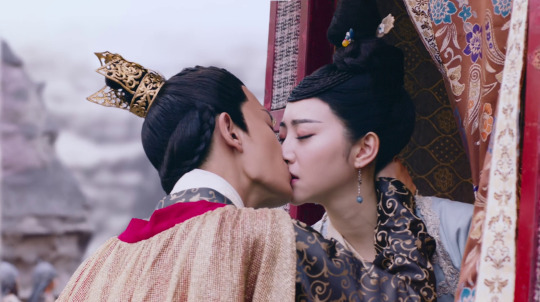
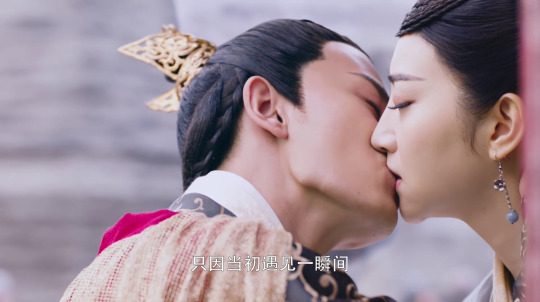
超级无敌苏的殿下!
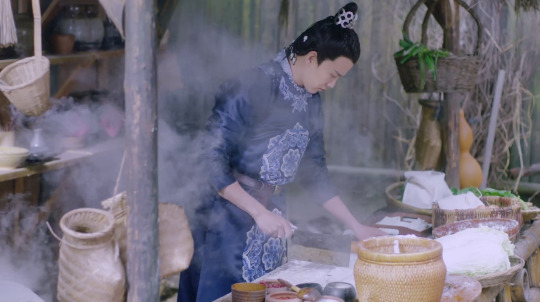
化身为大厨的殿下!
I wanted to take more screenshots but I shall just end here, because I scrolled up and got a huge shock seeing exactly just how much babble I spouted. I’m kind of horrified?! Omg anyone who reads this to the end, I’m sorry for all my incoherent rambling :3
15 notes
·
View notes
Text
How 1917 Captivated Audiences Audiences Across The Globe - Review & Analysis

George Mackay in ‘1917′
When Sam Mendes’ ‘1917�� hit cinema’s, immediately talk of award show buzz was brought to the table. ‘It is not a film, but an immersive experience’ was uttered around me in late 2019, as I wondered what I had yet to encounter. All appearing as a continuous shot, it is the incredibly expert and inventive cinematography that swept audiences off their feet. The rawness of youth and inspiring nature of two men’s stories on the forefront of the First World War all communicate the continuous idiocy of warfare, even today. As a stage director, Mendes’ staging and shock-horror tactics make 1917 emotionally dazzling and all the more thrilling.
Directed by Sam Mendes, it was based on his own family history, as his grandfather worked as a messenger on the front in 1917. Having had the idea of communicating stories of his grandfather for years, upcoming actors George Mackay and Dean-Charles Chapman were cast to play lance corporals Schofield and Blake. Enlisted on a mission to deliver a message to call off what could be a disastrously fatal attack, the young men must cross enemy lines and risk their own lives against the odds to save their fellow troops. However, the Germans had cleverly left their trenches, appearing as though they had fled, when they really are waiting in hiding, ready to attack the British.
With this intense storyline, it is the way in which the plot is executed that is superb. Winning the Academy Award for best cinematography, Roger Deakins’ filming is expertly expressed, and it is the way in which 1917 is shot that is such a defining feature. The technical accomplishments were not just embellishments, but something that made the film. This one shot technique was created through stringing a number of takes together and edited in a way to appear as if audiences are watching a single, gruelling journey. This long shot experience is never dull or continuous, as with every turn there is suspense and terror. Director Mendes had said that he “wanted to tell this story in two hours of ‘real time’. So I felt like it was a natural thing, to lock the audience into the men’s experiences”. In terms of shooting, cinematographer Deakins claimed that the longest take was seven minutes. Seeming like a new cinema milestone had been reached, the choreography of the film is stunning, as we are literally following the soldiers so closely that the audiences’ POV is close to the characters’ perspectives. It is this cinematic advancement and challenge that sets 1917 apart from other war films like it.
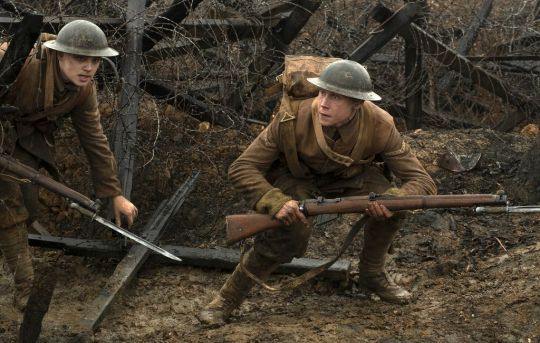
George Mackay & Dean-Charles Chapman in ‘1917′
With mostly tracking shots used, camera dolly’s chase after George Mackay’s character in one of the film’s most intense scenes, where a debilitated and truly traumatised Schofield sprints directly through the frontline, with nothing to defend himself. A behind the scenes look at this moment in the film sees Sam Mendes sitting on the back of the moving camera set, towed by a truck. With hundreds of extra’s running onto the field and real-time blasts bursting from the ground, Mackay as Schofield so expertly runs through the scene untouched, having audiences like myself wonder how many times that take needed to be done. Mendes commented on the hardships of this ambitious style of filming, saying, “the dance and the mechanics of the camera all have to be in sync with what the actors are doing” & “we had to rehearse every line of dialogue on location…the world has to be crafted around the rhythm of the script”. And so it was, as in one scene the camera chases Schofield through a burning hamlet, the lighting perfectly revolving around him, creating a wonderfully timed, yet, chaotically frightening moment. Though some critics had tried to find something to pick apart the film, stating that audiences had little character backstory to grasp onto, as we are only given insight into the lives of two lone soldiers. Yet, where some longed for connection to the collective experience of war by featuring many more soldiers, or developing gripping backstories, 1917 simply didn’t need this to be interesting. Given how the film plays out, there is no need for an emotional backstory to have us connect to a character, when the circumstance itself and what is presented throughout is paramountly gripping and soulful. Some had said that though the filmmaking is brilliant, the story isn’t all there. Yet, it can be said that by following a straightforward plot line with a simple task, we can delve deeper into a singular experience. This is a story played out through wonderful composition, actor Mackay saying “it was like a piece of theatre with every take”.
Earning ten Academy Award nominations, the realism of the entire feature is breathtaking. The horrifically intense, but sometimes beautiful and saddening imagery seems like something straight out of Wilfred Owen’s ‘Dulce et Decorum est’. From taking us deep into the trenches, through the dry landscape of France, to the empty rolling fields, and through abandoned, bombed out villages, we see changing journey in real time. This grand richness and variety in scenery creates interest easily, having us feel like we’re walking through a simulation. Yet with the same heart as war films that we so know, the raw nature of the world in 1917 is what creates the intensity. A strange sense of calm at times is not what you’d expect from a film so heavy, but the contrast between walking with the corporals through a peacefully lonesome cherry blossom field and sprinting from death through a town on fire is what creates the emotional rollercoaster. Amongst the calm, there is joy and a reminder of home in some scenes, showing us the purity of life before that life turns into something so nightmarish.

Where some war films may feel the need to use a score to build up suspense, 1917 holds not only suspense, but pure shock and horror in it’s scenery. As Blake and Schofield cross enemy lines, the sights they encounter come with no alarm. Decaying bodies amongst the mud, a deep gash for Schofield when running into barbed wire, what they come across is just as confronting for audiences. In a death scene during the film, there is no crescendoing music to create tension or warn audiences of what’s to come. No dramatisation or unnecessary glamorisation of war is there, making the moment strangely calm and far from honourable. No phoney supporting soundtrack that is needed to intensify the moment or remind audiences that this is indeed a scary scene, as we are with the soldiers in the moment, seeing what they see first hand.
Where there war, there is talk of it’s futile meaning, something that films based on wartime experiences effectively communicate. The hope of home and supposed promise of glory in the First World War is shattered by what really happens - death. It is this about war films that I so ardently love - the foolish history of how war was viewed & that these youthful deaths were honourable. By watching films like 1917, we are reminded of the repetitive idiocy of warfare through remembering one of the worst. The touching inspiration for 1917 coming from director Mendes’ grandfather reminds us of our family connections to war, creating a personal moment. And heartening family moments like these are continuously brought up throughout, reminding us of the corporals innocence, and ultimately, their poisoned youth due to warfare. As Blake walks through a field of flowers, he recalls a story of a time when picking blossoms back home took a whole day, greatly contrasting to now marching through the fallen orchard. This joyful story breaks our hearts as we can see the mercilessness of war, when touching on an innocent story, showing how much had changed for these characters. Scenes like this that were once beautiful have become ridden with hurt, and though the green fields of France may look lovely in the film, they are now laced with death.

A moment that reminisces on the nostalgia of home is when amongst soldiers in the woods, a man sings The Wayfaring Stranger. This mesmerising folk tune is almost a reflection for the soldiers themselves, as it speaks of the peace in death, comfort of home and journey of life, sung just before the group of men go into battle. Mournful lyrics like, ‘There is no sickness, no toil, nor danger, in that bright land to which I go’ & ‘I’m going there to see my Mother, she said she’d meet me when I come…I’m only going over home’, reflect on the possibility of death itself. Yet at it’s core, this scene is eerily calm, as we can hear the futility and sadness in this moment.
With a background in stage directing, Sam Mendes’ 1917 certainly was a theatrical spectacle. Profoundly moving, the inventive staging and richness that is presented brings the realism of a wartime experience to life phenomenally, making 1917 one to remember. Full of heart and soul, as many war films are, what sets apart Mendes’ work is his unorthodox approach to filmmaking, which was successfully pulled off. Emotion and intensity, there is no doubt in saying that this is one of the greatest war films made.
Stars Out Of Five: 4.5/5
0 notes
Text
The Life Changing Technique That Your Magic Is Missing

Avery Hart
Witches often focus on the practicalities of the craft when they’re first learning. It’s all about the tools, learning different types of spells, and all of the real world details. Some attention is given to things like how to do energy work, meditate, or hold intentions but often these things only become a focus after a witch has had a chance to get pretty familiar with the more practical aspects of the craft. Somewhere way, WAY down on this list of focuses is an aspect of the craft that, more often than not, I see completely ignored. This part of the craft is so far down on most peoples list of priorities that I’m pretty sure a fair number of witches have never even heard of it! And that’s really a shame because this one little aspect of the craft can take your magical abilities to a level you’ve never imagined.
What is this fantastic mystery technique? It's called psychodrama.
What Is Psychodrama?
If you’re scratching your head wondering what the hell psychodrama is, don’t worry, you’re not alone! This practice used to be commonly taught, especially in ceremonial magic circles but over time the importance of psychodrama seems to have faded into the background and now many folk magicians and witches have never even heard of it.
To put it plainly, psychodrama is a practice of stepping into a role in order to perform. It’s often utilised by actors to improve the realism of their performances. Psychodrama is achieved through the use of setting, costuming, and design to adjust the mental state of the performer.
When it comes to witchcraft, this concept can completely change how you look at your practice. It’s essentially a very dramatised way to “fake it ‘till you make it”. Especially for newer witches, though us more experienced witches certainly aren’t immune, doubt is frequent and can be an absolute killer for your magic. When your energy is torn between holding your intention and wondering if you’re even capable of pulling this spell off, it can have a huge impact on the effect of your magic. Psychodrama is a way to circumvent all of that self-doubt and tap straight into your magical potential.
I essentially want you to think of this as make believe. Suspend doubt temporarily, and pretend that you’re the badass, powerful, magic-wielding witch that you want to be. Use any and every tool in your arsenal to convince yourself that this game of pretend is real and then, only when you’re really deep into that headspace, do you perform your spell.
This may seem like a lot of work to go through for every spell but it can improve the effectiveness of your spells dramatically. Not to mention, it’s really fun! You get to go full witch, pull out all the stops, dress up, get out all of the decorations and music and incense and be the absolute witchiest version of yourself imaginable.
Sound good?
How To Use Psychodrama In Your Own Practice
Utilising psychodrama is going to be a little bit different for every witch. Not only do we all have different availabilities as far as time, space, resources, and privacy but not every form of psychodrama is going to work well for you. Figuring out what really does it for you can take some experimentation but when you figure out exactly how to drop yourself into your witchiest headspace, it’s well worth the effort. Not sure where to start? Here are 7 ways to start your personal experimentation with psychodrama in your craft.
1. Get into character
Dressing up can have a huge effect on how you feel and act in your spellwork. Think about the witch that you would love to be, your ideal witchy aesthetic. Would you have robes? A flower crown? Face paint? Body paint? Maybe you’d cast skyclad in nothing more than jewellery. Maybe you’d have an antler headdress or a carved staff. Don’t be afraid to let your imagination go a little crazy here, as long as it’s possible in the real world you should definitely add it into your ideal witchy self-image.
Now, I want you to start collecting the things you need to make that mental image a reality! If you can’t make it all happen right away, that’s ok. This isn’t about achieving your ideal, this is about making yourself feel as badass as that imaginary witch that you just dreamed up. And don’t underestimate how far a bolt of fabric and a little crafty know how can take you, there are tons of amazing DIY tutorials on Pinterest and Google for everything from robes to masks to horned headdresses and so much more.
When it’s time for you to do some witchcraft, don your new costume and feel how completely, unstoppably witchy you are. Ignore any thoughts telling you that you’re not a total badass, remember, this is all a big game of pretend right now. It doesn’t matter how unrealistic it might feel to you, put those thoughts aside and make-believe!
2. Set the stage
Now that you’ve gotten yourself dressed up, it’s time to turn your attention to your surroundings. Take a look at the area where you normally do your magic, this space is now your stage. It doesn’t matter how large or small your setting is, indoors or outdoors, when you do magic this setting needs to look like a powerful witch is using that space.
Go back to your imaginary ideal witch that we dreamed up before. Get that image firmly back in your head and when you’re ready, take a look at the area around this witch. What does it look like? Is it dimly lit or bright? Is the space filled with plants and ivy crawling the walls? Are there jars of herbs, spices, and other strange magical ingredients? Are there any colours that stand out to you? Is it inside or outside? What does the altar look like? What kind of tools are around?
Write every detail you can think of down and then see how many of those details you can recreate in your own magical space. Again, it doesn’t need to be perfect and if you can’t achieve every single part of that image right now, that’s ok. Just work with what you have at the moment. Going forward, try to focus your altar decorations, tool buying, and design elements on that image that you’ve cultivated.
3. Use music
Music is such a powerful way to change the mood and feeling of a space. Picking the right music can change you from your normal everyday self to seductive sorceress or witchy warrior in an instant. Don’t feel like you have to stay within the bounds of conventionally witchy music either! While Celtic music or chanting may work for some people, they won’t work for everyone. I personally like Hozier, Kaleo, Chon, and sometimes even rap music for my rituals. Take a look at the music you already know and love. What makes you feel powerful? What makes you feel in general? Is there a kind of music that you think fits the aesthetic that you’ve been crafting?
Play around with music choices, what works for you one day may not vibe so well the next. If you’re an especially music affected witch, you might create a playlist or two (or eight!) for different moods.
4. Use scent
Scent can be another big mood modifier. If you’re the kind of person who stocks up on pumpkin spice candles so you can get that autumn feel year round then this is for you. There are tons of ways to use scent in your craft, from scented candles to essential oil diffusers, to incense, and more. If you’ve already got favourite scents that make you feel witchy then go with those but you may want to experiment a bit and find something that you can use just for your witchcraft. For me, sandalwood incense, candles that smell like evergreen forests, and anything that reminds me of dusty old leather books immediately puts me in a witchy mood. If you must, go to the nearest store that sells scented candles and stick your nose in every candle that sounds remotely appealing. Even if you don’t love candles, knowing how various smells make you feel can help a lot when choosing oils or incense.
Note: Be careful with scents around animals! Essential oils and smoke can be incredibly dangerous for pets and it’s vital that you check to make sure that you’re not filling the air with toxins before you start using these products around your critters. Small animals are particularly susceptible but even larg pets like dogs can have very adverse reactions when exposed to the wrong essential oils!
5. Candles ad nauseam
Does this one even need explaining? Candles are witchy as hell, period. I stock up on pillar candles and tealights whenever I can and when it’s time to work magic I turn down the lights and light as many candles as I can reasonably get away with. If you can’t do fire in your space, electric candles make a great substitute! I have a set of electric candles and I use them for rituals all the time. There is zero shame in getting your witchy vibe from an electric source.
6. Summon your inner witch
If you really want to go all out, you can start your spell casting by summoning your inner witch. That badass ideal witch aesthetic that we dreamed up earlier? Yeah, we’re going to summon them to make sure that this aspect of ourselves shows up at full strength.
Begin by getting everything set up, dress up, set your stage, play some music, and get your incense going. When you’re ready, sit down in front of your altar and set one lit white candle in front of you. Pause to focus on the flame for a moment. Take a deep breath and call to mind the mental image of this ideal version of your witchy self. Visualise this witch standing in front of you, as real as you are. Call this witch to join forces with you by saying:
“As I am,
So are you.
As one we cast,
And our magic flows twofold.”
Now imagine this other witch stepping forward and melding into you. You feel their power wash over you, their confidence with magic, their expertise, and their knowledge of the mystical. Feel this new self settle into your skin. When you open your eyes you are neither yourself nor this other witch, you are both.
After your spell is cast and you’re ready to close all ritual work, thank this alternate self and allow them to step out and away from you. It can be helpful after this kind of spellwork to ground and cleanse yourself. It’s also important to make sure that you do this kind of summoning inside a protected space! Cast a circle and cleanse yourself before starting this kind of summoning, you do not want an imposter butting in on this process and trying to take you for a ride.
7. Go with what feels right
Above all, do what makes you feel like a powerful witch. This isn’t about matching someone else’s aesthetic or meeting the expectations of the people around you. This is about how YOU feel when you do these actions. You’re seeking to create an atmosphere that helps draw out your innate power and move past the doubts that can so often cloud our minds. If that's rainbow body paint and electronic music for you then own that shit and stock up on body paint! This may be an elaborate game of pretend but this kind of magical work can bypass the conscious mind and all of the chatter that lives there and pull magic from the deepest parts of the subconscious.
The results of this work can be astounding but if you’re new to working magic at this level, it can be exhausting. Make sure to ground afterward and take care of yourself. Eating food, kicking back, and relaxing after this sort of magic can go a long way toward preventing spell fatigue. Have fun playing around and pretending! The imagination is an invaluable tool in the craft and it’s time we all started making better use of it with psychodrama.
Do you know how to enhance your magic, improve your intent, and get kick ass results from your spells all at once?
If you don’t, then you need to be utilising the amazing energy system inherent to the human magical system. Tapping into this energy system allows you to understand the magic you’re using on a far deeper level and achieve results that will blow your mind.
In The Witch’s Energy System, I’ll break down the entire system into easy to use pieces so that you can learn to see, feel, and make use of this energy in a way that will completely change how you view your own magic.
Learn More Here >>
https://thetravelingwitch.com/blog/2018/8/12/the-life-changing-technique-that-your-magic-is-missing
0 notes
Text
Open Project: Stage 2# of Text, Energy scoring and Critical Thoughts - Evening of 03/12/2018
This session began with Dawid, Gabrielle and Delya discussing what they felt the show was doing and what it was becoming about at that point in time.
It then followed with the three company members, relaying this discussion to Dannielle and her contributing with her own opinions on the subject.
The company had organised a workshopping of their current drafts of the texts. In it they were switching the ‘first person’ style of language to the third person and cutting out bits that no longer fit within the sections, being too long.
Whilst these new drafts of the texts were being developed, the group were discussing ideas involving how the dynamic onstage would shift with the change in the number of performers within the canvas (on the floor) or speaking on the black frame around this canvas. This black frame also has the potential to be read as the representation of the liminal space between the audience and the performers – or the visual representation of the tension between theatre’s fictitious connotations and the association of a gallery as a place of authority and truth.
A scoring of the energy present within the piece:

In addition to the brief description of this rehearsal, the company have discovered the following things about the piece:
• This piece has involved a process of learning what has been done in the past within theatre and art in order to better foresee the future.
• If they are taking full inspiration or stimuli from already made work, already established artists, this may be implying that everything has been said before. Though this does not mean that everything has been made before. Part of this includes gathering words that have been spoken before and making their own sentences.
• The group wish to bring out other aspects of the artist’s lives within the texts. For example, with Keith Haring, finding a way of bringing out the fact that his legacy wasn’t just his art but also his activism.
• The group are exploring colour and topography. They plan to also explore viewpoints in more depth within another rehearsal.
• What they have observed about the artists that they have chosen are that:
- The art happened to be extremely male dominated, though this is interesting as the performers are made up largely of women.
- That the artists all say the similar or at times, the same things in one way or another – even if their lives were vastly different.
- That all of the company’s chosen artists have either lived through extreme misfortune and poverty or extreme richness and luxury – there is no middle ground, it always appears to be polar opposites. Is this simply as the artists’ life stories have been taken out of their hands and dramatised by strangers? Couldn’t it be said that this is what the company is doing now? The company acknowledge this and wish for this to be one of things that they interrogate within the work on a larger scale.
- As this is also a process of the company teaching themselves of the past in order to understand what has been done and bring the old into the new – the group will be working towards ending up with an archive for a series of pieces beyond this initial project
Questions asked were:
- Why specifically those eight artists?
- What makes them more special than all of the others?
- Why are they all men? They group wishes to avoid it appearing as if it is just men’s legacies that they want to carry on. How can this be interrogated?
Here is the Stage 2# of our narration text:
Keith Haring Text Stage 2#
Have you ever heard of a dynamic man who painted dynamic figures with dynamic lines of thick, black paint?
Do you know the name of the man whose activism shone brighter than the prints he handed out on the streets of New York City?
Are you even aware of who he was?
Or were his actions simply not impressive enough to catch the eyes of a generation like yours?
What would grab your attention?
Do crack epidemics rail to plague your streets?
Are international acts of racism and greed not entirely on your list of important problems?
Then perhaps he is not for you.
His depictions of love and respect would only dissatisfy your taste for injustice.
For some of you, the thought of diversity could rarely cross your minds and it would not bother you.
You are aware of its importance, but what would you get out of it?
Maybe some of you should remain within your boarders, happily ignorant of the world and its deterioration, what’s it got to do with you anyway?
It is possible that very few of you could step away from your herds and think beyond your boarders.
Step outside and act with a cause.
Not all of you would do it, not without your comforts, but some of you could, or, you could remember the man who refused to walk away from the concerns that few others shared for the world.
The inequalities and atrocities that some of you would ignore, only until your comforts are revoked.
- Delya Joubert
Claude Monet Text Stage 2#
This could be a fairylike place. You do not know where to poke your head. Everything is superb and you would like to do everything. So you squander up lots of colour. So much colour, of every kind, for there are trials to be made. Thus, he travelled to Monte Carlo. Where the grand lines of mountain and sea are admirable. So beautiful. And apart from the exotic vegetation that is there, Monte Carlo is certainly the most beautiful spot on the entire coast. The motifs there are… more complete. More picture like. And consequently, easier to execute. After visiting the French Riviera, he returned home, to Paris. The cursed city of Paris. Where colour becomes a day long obsession. Joy. And torment. Where he found himself looking at his beloved wives dead face, and systematically noting the colours according to an automatic reflex. It could be grey. Blue, black and grey. You could try and understand his art, but people discuss art as if it is necessary to understand. When it is simply necessary to love Like the fallen petals that gather on the surface of a pond, a wish is to build something for the pleasure of the eye and also for the motifs to paint. So he bought some land in Giverny. With a pond. It could be water. Beautiful, blue water. You could be following nature, but you will never be able to grasp her. As he does, you could owe this picture to flowers. Beautiful flowers. Beautiful nature. My wish is to always stay like this. This could be you. Living quietly in a corner of nature.
- Dannielle Woodward
Vincent Van Gogh Text Stage 2#
Imagine a soul that sees much, does much, and hurts many. Even the knowledge of his own fallibility cannot keep him from making mistakes. Only when he falls, does he get up again. Even the fisherman, like him, knowing that the sea is dangerous, cannot stay to shore. Imagine that he is still far from being what he wants to be, but with gods help, he may succeed. The emotion buried inside us are the great captains of our lives, and we obey them without realising it. And what would life be if we had no courage to attempt anything, and live in fear? We all must keep our love of nature, for that is the true way to understand art more and more. And thus, he puts his heart and soul into his work, wears it on his sleeve, and has lost his mind in the process. His paintings have a life of their own that derive from his soul. His delicate, fragile soul. He believes that there is nothing more truly artistic than to love people, as a good picture is equivalent to a good deed. Yet both are subjective. Some days, you may hear a voice in you say, ‘you cannot paint’, then by all means paint, and that voice will be silenced, as painting is a faith, and it imposes the duty, to disregard the public opinion.
And thus, you might dream of painting, and then you may paint your dreams. You may experience of frightening clarity in those moments when nature is so beautiful. You may no longer be sure of yourself, and the painting may appear as in a dream. In spite of everything, you should take up your pencil, which has been forsaken in this great discouragement, and you may go on with your drawing. Imagine closing your eyes. Imagine catching the cold nights breath. And dream.
I confess, I do not know why, but looking at the stars always makes me dream. And you may not know anything with any certainty, buts laws may suppress you to dream whenever the stars dance in the night sky. You may seem to think that the night is more alive and more richly coloured than the day. And if you truly love nature, you should find beauty everywhere. Yet you will find that there is no blue, without yellow, and without orange.
- Dawid Wiczynski
Gustav Klimt Text Stage 2#
There seems to be nothing special when looking at him. No real attention to detail. No real polish to it. No refined edges. You begin see marks of tiredness and dust on his face. The cracks open his cheeks and his skin falls onto his paintings. Dust and Gold. True relaxation, which would do him a world of good, seems nonexistent to him. However, if the weather is good, he goes into the nearby wood. There, he will paint a small beech forest with the golden sun falling from the sky. There, he paints until the sun is no longer with him, and he returns home.
If you wish to know anything about him, you should look attentively at his pictures and there, you should seek to recognise who he is and what he wants. However, you will find that there is no self-portrait of him. Some may believe that all art is erotic, and he is not art. Art can be a line around your thoughts, a grasp around your tongue. Imagine dust gathering over days and nights, and he does nothing.
Place him inside his house. Imagine the four walls. On his very first day, he did not start working straight away, but as planned, he took it easy for a few days, flicked through a few books maybe, studied Japanese art a little. And it seems that now when he has to write a simple letter, he is scared stiff, as if faced with looming seasickness. And after tea, he would return to his painting. He seems to do nothing, yet he does so much, it just seems like nothing. Imagine a painter who paints day in day out, from morning till evening – figure pictures and landscapes, more rarely portraits. He seems to believe that he can paint and draw, and others seem to believe this too. But he seems uncertain of whether this is true?
- Dawid Wiczynski
Eugène Delacroix Text Stage 2#
Is this heroic, or distasteful? Criticism, like so many other things, risks keeping to what has been said before and not getting out of the rut. There has been a certain amount of fuss surrounding the 'Beautiful'. Some see it in curved lines, some in straight lines, but all persist in seeing it as a matter of line. Although, he would look out of his window and see the most lovely countryside; lines just did not come into his head. The lark is singing, the river sparkles with a thousand diamonds, the leaves are whispering; where, he should like to know, are the lines that produce delicious impressions like these? They refuse to see proportion or harmony except between two lines: all else they regard as chaos, and the dividers alone are judge.
For, weaknesses in men of genius, he believes, are usually an exaggeration of their personal feeling, which in the hands of feeble imitators become the most flagrant blunders. Entire wars have been fostered through these blatant misinterpretations. Entire schools have been founded on misinterpretations of certain aspects of the masters. Lamentable mistakes have resulted from the thoughtless enthusiasm with which men have sought inspiration from the worst qualities of remarkable artists because they are unable to reproduce the sublime elements in their work.
He longed to live austerely, as Plato did...he needed to try to live a more solitary life.... as he was convinced that the things which he would experience for himself on his own would be stronger by far...
How infinitely happy, he thought, is the man who reflects nature like a mirror without being aware of it, who does the thing for love of it and not from any pretensions to take first place.
He always thought that he should desiring or hoping for something. He believed that when one can hope for that which one desires, one enjoys the greatest happiness of which our thinking apparatus is capable. He knew that to obtain what one has been desiring is the first step to the depths of sadness and even pain, from which one can never emerge.
- Gabrielle Benna
Giovanni Bragolin Text Stage 2#
*No Text*
- Dannielle Woodward
Pablo Picasso Text Stage 2#
A lot has been conjured up about him and his art in his absence, his absence must be acknowledged. His artwork has been called obscene, pornographic, incomprehensible compared to his earlier works. Others have attributed this lack of coherence to a result of loneliness, depression, war, superstition, his love of women. Though the insistence on finding a meaning in everything and everyone might be the trouble. He himself, deemed it the disease of our age; an age that is anything but, believes itself to be more practical than anything else.
For, how can we expect to behold or experience his picture as he experienced it? A picture comes to mind a long time beforehand; who knows how long beforehand. He sensed, he saw, and painted it and yet the next day even he claimed not to understand what he had done.
To penetrate his dreams, his instincts, desires or thoughts, which have taken a long time themselves to come to the surface – above all to grasp what he put there, perhaps involuntarily, is irrational.
The artist is a receptacle for emotions derived from anywhere: from the sky, from the earth, from a piece of paper, from a passing figure, from a spider’s web. We are tangled in a spider’s web. This is why one must not make distinctions between things. For the artist, there must be no aristocratic quartering. He must take things where he finds them.
He assures us that Art is not truth. It is but a lie that makes us realise truth. Art washes away the dust of everyday life. Art is not chaste, it is dangerous. Where it is chaste, for him, it is not art. When he paints, his object is to show what he has found rather than what he is looking for.
- Gabrielle Benna
Jackson Pollock Text Stage 2#
It’s the paint
It’s the liquid paint
That’s dripping in his ears.
Cuts of colour across his vision.
The painting isn’t finished,
It does what it wants,
Not what he wants,
But what he wants is to paint
He is painting.
He took a change that was controlled by paint.
He was not done, it was not complete.
The painting needed more!
It needed less!
A masterpiece!
A disgusting mess of a painting…
Magnificent.
Such a tortured soul, no wonder he was such a brilliant artist!
When he paints
When he is painting
He lets it in
The painting
It has a life of its own
He does not control
He is not in control
He has no control
He is a painter
Yet he does not paint
The painting paints itself
So many artists fear the smallest change
He had no fear
No fear of change
No fear of destruction
He does not fear destroying the image
The painting has a life of its own
The painting creates itself
He makes no mistakes
He makes no errors
He is not aware of what he is doing when he paints
But the painting knows what it wants him to do.
The painting does not come from his easel
None of those artist’s tools
The painting
It doesn’t need them.
It has him.
He does not need tools.
Not to create
Not to paint
You starving artists know a thing or two about control
How you crave it
How you’ve lost it
Your hands got carried away from your thoughts.
It may be strange
This idea
This modern world
This modern art
But the strangeness will wear off
And we will discover the deeper meaning.
The deeper meaning will swallow me
The painting will use it
He will let it come through
That deeper meaning
He must find it,
Over, and over again
And again
And again
This deeper meaning
He would let it use me
He shall be its pallet
His blood its paint
His fingers its brush
A vessel for art itself.
Every painter paints what he is
He is a painter
He is a painting
A vessel
A tool
He is a tool of creation.
Creation left him drained
Don’t be a fool
She will drain you of your logic
Until there is nothing left to drip from his ears
He regained control
Yet he refused to accept it
Watering down his command with spirits,
Waiting for the trees branches to spread him like paint across a broken windscreen.
- Delya Joubert
--------- end of text
Gabrielle read a short section of Delya’s second draft of text for Keith Haring, to see how the dynamic changed when it was read this time around.
Dannielle thinks that the way the Haring text is read, it comes across as a riddle.
Dawid likes that it directly addresses the audience. It makes him think a painting that follows you around the room. It will be as if the speaker stood on the black frame talking, becomes that painting following the audience with their eyes.
Dannielle suggested that to experiment with some of the sections different, they could try using two different painters in one section and see how it alters the piece.
The company then discussed which parts of the set they already have, what they still need to get and how they were planning to make it.
They will be making the soundscapes as soon as possible – from Tuesday onward.
They then discussed the schedule for final dress rehearsals and the times in which they could present their progress to the supervisor.
Plans for the next session are to:
Organise an eight-hour session on Anne Bogart’s Viewpoints.
Speak with their supervisor and show him some adaptations of the text that they have already been working on.
Discuss ideas and make preparations for the creation of the soundscapes and edit the texts, ready to explore onstage with them.
Company members present in the rehearsal:
Gabrielle Benna
Delya Joubert
Dawid Wiczynski
Dannielle Woodward
- Gabrielle Benna
0 notes
Text
Week 2 - Keeping It Up
Week 2, let’s go!
Has been an odd week. Have been feeling extremely lethargic workwise. Can’t seem to concentrate and I keep procrastinating things. Only small bits of work give me inspiration and sparks joy and I’ll ride on the energy wave for a bit and it just flickers out.
That said, on the personal front, things have been not bad. Sticking to my goals, feeding my soul. Issagoooood.
Reads This Week
If I Had Your Face by Frances Cha (3/2021) When I finished If I Had Your Face by Frances Cha, I felt such a sense of grief. That it had to end, that I could no longer be part of the tight quartet in the book, at the sorrows of each character. Ah, the deep, unsettling sense of despair this book left me. I was scrolling through Instagram and was mentally yelling at every Instastory “HOW CAN YOU GO ABOUT YOUR LIVES SO APATHETICALLY WHEN I’M COMPLETELY DEVASTED BY THIS ONE WOMAN’S WORDS?!
This is how I want a read to leave me, despairing and desperate for more. Though I have to say it doesn’t really have a plot, no major plot development, no typical “cleverness” in storytelling. And you have to accept that the 4+1 girls you’re introduced to in the book will remain vague and blurry, like silhouettes in the rain. There is no resolution, though there is hope. (And dread actually, now that I think about it, funny how those two come together so often, Hope and Dread.)
But the language, it was so well written! Cha is wonderful at conveying sentiments of female friendship and made me ache for my girlfriends. I could relate so intensely to the frustrations of her characters, seemingly frivolous issues about ridiculous intense admiration (obsession?) for Korean idols, other girls who look better than you, but also deep-seated scars, embarrassment at one’s childhood, monstrous guardians and care givers, a desire to be more. I could not recommend this more. I’m glad I picked it up. I will re-read this again.
The Midnight Library by Matt Haig (4/2021)
“Between life and death there is a library. And within that library, the shelves go on for ever. Every book provides a chance to try another life you could have lived. To see how things would be different if you have made other choices”
This was a strange book for me. I thought I liked it. And I think I do, just not as much as I thought I would have. It’s really strange for me to say this because this is literally a book about possibilities. About choices you make that lead you to completely different lives. And I’m ALL about possibilities. This book was dripping with potential and I feel the disappointment of unrealised potential so very acutely.
I liked the first half more than the second half. Haig spends a good amount of time world building in the first half, talking about loss, about disappointment, about consequence of action and outcomes that don’t always meet our expectations. The premise is MAGICAL, so beautifully clever. A Library of possible lives, my heart aches at how poetic that is.
The second half just went into weird philosophical town. “The only way to learn is to live.”, “But now you’re lost within your lostness.” It got a bit… The 5 People You Meet In Heaven-ish. Which for some people is probably great, for me… it felt a bit preachy. Perhaps if you share similar regrets as the protagonist, Nora, you might like this book a lot than me.
Still enjoyed it though. For the love of the language. Haig is quite a virtuoso at wielding language to break your heart. Maybe it’s just personal preference, but I wish Haig took a more fantasy route, instead of a philosophical, Life Is About Living, approach.
Kim Ji-young, Born 1982 by Cho Nam-ju (5/2021) I first heard of this book some time in 2019 I think, reading a SCMP article about how there were Korean couples breaking up because they could not agree on their feelings towards the movie adaptation. (Seriously, fucking Koreans wtf?!) Apparently there was great division on how women are treated in Korea, tensions on gender discrimination and The Patriarchy was rearing its ugly head, calling foul on attempts of the feminist movement in Korea.
At that time, I was more intrigued by how ridiculous Korea can be (seriously, there were people sending death threats to female celebrities who even mentioned they read the book, what in the world?!) so I got a little swept away reading about how intensely chauvinistic Korea is. For all the shine and beauty of Kpop, Korea is really quite fucked up.
I’m about 20% in and I quite like it so far! It’s translated so there are some awkward moments but overall, the language is easy and regular, highlighting how normal the discrimination and injustice Kim Ji-young faces is.
Writes This Week
I.. haven’t finished my Kang Trilogy. Heh. I think I need some time away from it and will come back to it soon. I’m noticing that the Kang in my writing and the actor that kind of inspired him are becoming increasingly different. I think the Kang in my writing is becoming more like... me. I hope that one day, I’ll be able to write about things that I’m not familiar with, experiences that I’ve never had before. Practice, I’ll practise till I get there.
I did finish a piece on Instagram woes, one that I started some time back but came back and finished in like... 10 mins. (Time away really does help.) It’s the first piece I’ve ever sent to a friend for critique and I’m so so so glad I did! I hope this is the start of something between AG and me, writing, reading and critiquing each others’ pieces. :)
Reading more really does help with writing better!
Watches This Week
MiChuRi 미추리 Season 1 & 2 on random website I googled out A Korean variety show I started on because Song Kang was in it. Premise is that the participants of the show have to solve clues to find a sum of money hidden somewhere in this “village”. It has elements of 2 Days 1 Night and Running Man. Yoo Jae Suk hosts so you already know it’s gonna be good!
IT IS SO FUNNY HOMG WHAT. 10/10 will recommend for crack lols. I actually found myself learning quite a bit about the Korean language through this show. Also conclude that Song Kang looks great but he is severely lacking in the reasoning department. Boy is not what we would typically deem “intelligent”. But God Damn his beautiful face! God is fair, God is always fair.
Extracurricular on Netflix About half way through it. It is really very good but in small doses please. Sometimes I forget that our main characters are just high school students but when I do, I feel almost physically sick watching what they have to do to survive.
Kim Dong Hee is perfect as the incredibly introverted and troubled Oh Ji Soo. I think he carries the show. Some actors act with their eyes, Kim Dong Hee acts with his whole body. You can feel the desperation rushing out in waves from him, from his eyes to his shoulders to his frickin hair. I feel so much for him even though he essentially is pimping out underage escorts. Ah, CHEF’S KISS!
The Uncanny Counter on Netflix 3 episodes in and it’s not bad! Though the amount of bullying that happens in Korean schools... is it normal?! I hope it’s just dramatised for shows... Now that I think about it, Extracurricular had lots of school bullying. Ya... Korea, what the hell is up man?!
Also, none of the actors playing high school students look like high school students. Seriously, some of them could pass off as 40 year old uncles. Especially the bullies. Maybe they retain every year for the past 10 years? Is that why?
Okay, don’t let me put you off The Uncanny Counter. It’s really quite good. So far at least. Excellent storytelling, great world building, above average cast. A solid 7.5/10 in my books.
My main problem with it is that the characters are very one dimensional. I wish there was more nuance? Like you can fit every character in typical Kdrama tropes almost immediately and it makes the show very predictable. I LOVE the little friendship trio that our protagonist is in though. Is a rare thing, to find such precious friendships in Kdramas built on just pure friendship with no weird love triangle thrown in to complicate things.
Listens This Week
Rediscovered some of IU’s old stuff. Like really old, like 2008, 2010 old. I really like her duet with Na Yoon Kown called First Love, and of course, Good Day is great.
Been listening to quite a bit of Twice this week too. Well, just 2 of their latest singles. I really like I Can’t Stop Me and More and More.
Kpop still dominates my listening charts this week. Heh. :)
This week was not bad to me but I think I really need to pull my weight a bit more. May week 3 continue to be kind to us all! :)
0 notes
Text
The Demon's Blah Blah Blah
by Wardog
Wednesday, 01 September 2010
Viorica was right, and Wardog was wrong. Wardog tears into The Demon's Covenant.~
The Demon’s Covenant is the sequel to The Demon’s Lexicon, which I reviewed
here
, and very much enjoyed. I sometimes suspect that being liked is a mixed blessing at Ferretbrain as all it does is prepare for the way for a crushing disappointment, and I was, indeed, disappointed by The Demon’s Covenant. I’m vaguely suspicious that I might have read a different book to the rest of the internet, because every single other review I’ve seen has been full of love and squee, and I won’t deny that The Demon’s Covenant is full of Brennan’s usual charm, but it’s also extremely self-indulgent and does very little beyond set up the third book.
It reminded me most strongly of Harry Potter and The Goblet of Fire – not because there’s any real similarity between the texts themselves but because, at the point book IV came out, I was still a stalwart Harry Potter fan and, although I was surprised at the sudden jump in length compared to the third book, I decided to forgive the book its obvious flaws because I was so into the Harry Potter world. Of course by the time the fifth book came out it was clear that no amount of engagement in the text could save the series from what it had become: an undisciplined, unedited mess. The Demon’s Covenant is NOT Harry Potter and the Goblet of Fire but compared to the tight plotting and exciting twists of the first book it might as well be.
In essence, nothing happens in The Demon’s Covenant until the final thirty pages. The story opens some time after the end of The Demon’s Lexicon, with Mae trying to get her normal life back, when she discovers Jamie is in contact with the Magicians. Needless to say she calls in Nick and Alan and that’s basically it until the very end of the novel when there’s a big fight between The Goblin Market and the Magicians’ Circles. Yes there’s some politicking, with Jamie being passed about like the magical McGuffin he so clearly is, and Alan does another one of his trademark manipulative switcheroos, but largely there is a lot of “stuff” in the story but not much to make it a coherent narrative.
Part of the problem, I suppose, is the natural move from novelty to familiarity that affects every sequel. There is no sense of discovery here, only further information about the people and places and concepts that were introduced to us in The Demon’s Lexicon, information which largely serves to render these things less interesting, rather than the reverse. Also the “Is Alan going to betray Nick” dance is performed a second time, although less effectively because the answer is self-evidently either “NO NEVER!” or “Probably not in the second book”. And I do recognise it’s meant to be about character not action but as much I like the characters I still felt the amount of time given over to their delineation was excessive, and the degree of detail borderline obsessive.
For example, part of the book consists of extracts from Alan’s father’s journal, charting his son’s attachment to the young demon and his own developing relationship with Nick. It a chilling, and heartbreaking account (“when I drew the blanket back, Alan was sleeping with one arm curled around the monster. In his other hand was an enchanted knife”) and yet also completely unnecessary. It doesn’t tell us anything we don’t already know, and it has to be bunged awkwardly into the narrative by having Mae read it aloud to Nick, who cannot read well when he’s emotionally distressed. Since the story is entirely told from Mae’s point of view, she spends a lot of time acting like Harry Potter with his invisibility cloak so she can be in on the right scenes for the sake of the reader. Furthermore, Alan’s father writes like a teenage girl with an LJ and literary pretentions, rather than a grief-stricken ordinary man, beset on all sides by enemies:
My blood ran heavy and cold through my veins, as if terror could turn me to stone, and I tried not to think of what bloody game or dark purpose the demon might intend for my son. That night I went upstairs with an enchanted knife in my hand and stood over the cradle. Drowning hadn’t worked, but this knife had the strongest spells the Goblin Market knew laid on it. The nightlight was on, casting a pattern of cheerful rabbits on the opposite wall. It [that’s the demon not the nightlight] lay sleeping in a pool light, but even sleeping it doesn’t look like a child. Not quite. I stood there sweating, the hilt of the knife turning slick my grasp. Then from the door, I heard Alan say, “Dad?” I turned and saw him looking at me, and the knife, and the demon. My little boy’s face went so pale it seemed translucent. He looked like the tired old ghost of a child long dead.
I know the effectiveness of first person narration depends largely on reader being willing to suspend disbelief, but there was something so self-consciously dramatised about Alan’s father’s journal that it consistently detached me from the story it was telling. I also suspect there’s a difference in a narrative being in the first person from the outset – you know it is not literally a journal any more than an epistolary novel is literally an exchange of letters – and a first person narrative being included in the body of the text as a found item, in which case basic plausibility demands that it sounds at least a little bit like what it’s supposed to be. And I’m honestly not sure what the journal of guy protecting a crazy magician ex-girlfriend and her demon spawn at the cost of his own son’s life and future happiness would sound like (Number of times tried to kill demon today: 7 –v. bad) but as much as I like the line “He looked like the tired old ghost of a child long dead” it just struck me as far too constructed to support the ‘reality’ of the journal as a journal.
Although I’m away I’m whinging here, and I have to say, I didn’t like The Demon’s Covenant, Brennan is a talented writer. She has a lot of wit and style, and I genuinely enjoy the experience of reading her, even if, in this instance, I didn’t actually like the book. Although I’d kind of reached information-overload on the emotional and psychological intricacies of the characters by the midpoint, I do have a degree of fondness for Nick, who is just as hot, ruthless, confused and genuinely entertaining as ever:
She glared at the back of Nick’s head and said, furious and irrational, “You could have danced with him at the club.” “I could have,” Nick said. “There were kids from school there. He gets hassled enough. Anyway, I don’t really dance for pleasure much.” “Uh – so you, uh, dance professionally, or what?” Seb asked. “Yeah,” said Nick. “The ballet is my passion.”
And I think I like Mae. She is strong, and compassionate and smart, and pretty much everything one would want in a female heroine, while still being flawed and human and making mistakes. The tone of the book is much more emotional than The Demon’s Lexicon, as one would expect now the point of view is not rooted in Nick, and perhaps Mae’s natural insight and interest in the people around her is partially responsible for the amount of time spent dwelling on the minutiae of character. But there was also a part of me that couldn’t shake the conviction that big advantage of Mae’s point of view for the author is that it liberates her to spend a lot of time describing hot dudes being manly and self-sacrificing at each other.
“Oh Nick,” he said in a soft, amazing voice. “No.” He limped the few steps towards his brother, then reached out. A shiver ran all the way through Nick, as if he was a spooked animal about to bolt, but he didn’t bolt. Alan’s hand settled on the back of his brother’s neck, and Nick bowed his head a little more and let him do it.
Just shag already!
Although I got through The Demon’s Covenant with my appreciation for Nick and Mae relatively unscathed, the same could not be said for Jamie and Alan. Jamie, at least, has stopped wearing purple and being fabulous, but the quirky charm I found reasonably endearing last book has paled through overuse to the point at which I find him genuinely grating. Again, this is probably completely unfair of me but from the fragments of Brennan’s LJ I have read here and there, his style and general approach to life is so reminiscent of hers that he’s evolving into some kind of gay Mary Sue:
“I can cook better than you,” Nick corrected absently. “I think monkeys can probably be taught to cook better than you.” “I’d like to have a monkey that cooked for me,” said Jamie. “I would pay him in bananas. His name would be Alphonse.”
Also I find his vulnerability when combined with his homosexuality bothersome. I know he’s a powerful magician, but he’s also sweet and forgiving to the extreme, subject to crazy crushes on unsuitable people (I mean he does kick off the books by canoodling with an incubus which naturally gives him a demon mark) and squeamish about violence. Couple this with a tendency to make a fool of himself in public and an inability to hold his drink and you’ve got a character so mind bogglingly pathetic I would be up in arms if she was a girl. Perhaps it is a symptom of my own internalised prejudice that I see these qualities as feminising but it’s less about Jamie being girly than the fact he is very much ‘other’ to the rest of the men in the text. I suppose I should probably just be relieved he’s not Magnus Bane but the implicit association of homosexuality with a ‘different’ set of virtues to those of straight men was not exactly comfortable for me.
And then there’s Alan. Oh dear. He was my favourite character in the first book, because he was unexpected, a supposedly “nice” guy, as cold and ruthless, in his way, as the demon he guards. However, in The Demon’s Covenant, his presentation seems to have moved into a space that is less interestingly ambiguous than completely unfocused. I skimmed a few reviews out there on the Internet at large and the general feeling is largely Squee!Alan. His fucked up, loveless life and his unrequited love for Mae seems to be winning him the pity vote. However, I found him icky, icky, icky and although that’s not a problem per se I couldn’t work to what extent I was meant to find him icky, icky, icky. The love triangle between Mae, Alan and Nick established in the first book is continued, or rather repeated, with little development. Alan is still in lurve with Mae, Mae still fancies the pants off Nick, Nick seems to feel some sort of reciprocal desire for Mae but obviously is supposedly incapable of love … and therefore thinks she should be with Alan, partially because he knows he can’t do the human emotions thing but also because he’d do anything, give up anything, for Alan, and if Alan wants Mae than Nick will probably do whatever it takes to ensure he gets her.
I don’t know if we’re meant to find this creepy and objectifying but it fucking well is, not least because it isn’t presented as a demon treating a human being as a trinket, but because everyone else in the book – including Mae – believe she’d be better off with Alan. And it’s annoying that Mae, who is a smart girl most of the time and managed to navigate the love triangle with some dignity intact last book, ends up in precisely the same mess this book – grinding with Nick while he’s pissed off with Alan until the point Alan interrupts them and Looks Sad. Get a new hobby, Alan, for God’s sake.
Mae also semi-encourages Alan’s attentions, even though she knows she doesn’t feel much of a spark, basically because she pities him. I know I am not the target market for The Demon’s Covenant but regardless of age and experience: pity is not the foundation of a healthy relationship. Just (wo)man up and tell him you don’t fancy him. Of course, midway through the pity fest, Alan lets rip with this little speech:
"After my dad died, I looked everywhere for someone to love me. I used to sit on the bus and watch people, see if they looked kind, try to make them smile at me. I had a hundred dreams about a hundred different people, loving me." Alan's voice was low, but he didn't falter. He reached out and touched her hair, very gently, pushing it behind her ear, "Of all the girls I ever saw," he said, "I dreamed of you the most.
Again, I know I’m not the target market here, so perhaps I’m more inclined to find things creepy that a teenage audience might find gloriously tragic and romantic but, seriously, if a man ever said that to me I’d run away screaming. Yes, right then, right there, because he clearly has a raging case of
Nice Guy Syndrome
. And guys who guild trip you into going out with them are so dreamy. Not. I’d take the demon anyday, he’s significantly less emotionally maladjusted.
And, this, I suppose was largely my problem with The Demon’s Covenant. I read lots of books for which I am not the market audience – I even enjoyed Twilight until I realised it had no sense of self-irony at all – but the more I read of The Demon’s Covenant, the more I felt the gap. I honestly just don’t get it, and I wonder if there’s just a fundamental disconnect between myself, the author and the world as envisioned by the author. One of the big themes of both books has been self-sacrifice – the brothers, and to a lesser extent Jamie and Mae, are always tumbling over each other to get themselves roundly shafted in the name of protecting the other person. I’m not saying that self-sacrifice is not a powerful device and all that, but it tends to work as a climax, or at the very least as a one-off. When people are constantly sacrificing themselves for each other, it soon loses its impact. I might be pulling justifications out of my arse here, but I also suspect is a trope that gets more play in fandom. Over-used, however, it rapidly degenerates into little more than emotional pornography.
And there’s an uncomfortable moral dimension to it: self-sacrifice, by its very nature, is an act performed in spite of, as much as because of, another person. Needless to say, because of this it tends to be largely non-consensual, which has the weird side-effect of infantalising and disempowering the sacrificee in a deeply unpleasant way. Ultimately every self-sacrifice involves a run-up of double-dealing and deceit, so that the act itself is a massive massive betrayal of trust – trust, that is somehow miraculously restored through the act of self-sacrifice.
To put it another way, mean, Sydney Carton’s sacrifice has nothing to do with Darnay – he does it for Lucie, because he loves her, and because she loves Darnay, and partially because Carton realises he’s wasted his life completely and therefore has little to give to the world, except his sacrifice for a better man. In the world of The Demon’s Covenant, Carton would love Darnay, and therefore trick Lucie into helping him look like he’s betrayed Darnay to allow him to sacrifice himself for Darnay instead.
Self-sacrifice becomes a closed system, in which the keyword seems to be “self” – it’s less about the person you save, than the personal act of saving, catching all the characters in a perpetual game of “I love you more”. Sacrificing yourself for the person you love is ultimately a pretty selfish act – essentially all you’re saying is that if someone has to live on miserably you’d rather it was then. Sacrificing yourself for the happiness of the person you love as Carton does actually has meaning. And, yes, I know, I know, Alan sacrifices himself for someone who isn’t Nick, but it’s basically sacrifice for the sake of sacrifice, and thus as irritating as hell. Of course it doesn’t help that it’s only the second book so most attempted self-sacrifices get derailed, so it seems we’re meant to be enjoying the exquisite anguish without having to actually, y’know, be upset or lose a character.
I guess I’ve been pretty harsh on The Demon’s Covenant. Although I found individual things to like about it, for example the strength of the characterisation, Mae and Nick, witty, lively writing, I can’t really say I enjoyed it. I’m willing to chalk up, largely, to me rather than the book since it seems to be generating rave reviews across the internet. I think maybe I’m just too old and grumpy.Themes:
Books
,
Sci-fi / Fantasy
,
Emocakes
~
bookmark this with - facebook - delicious - digg - stumbleupon - reddit
~Comments (
go to latest
)
Arthur B
at 13:52 on 2010-09-01I know this is absolutely nothing to do with the review, but what the hell is up with the cover?
I mean, seriously. If you ditched the title the cover only conveys four things:
- It takes place in London.
- There is a martial arts smackdown at some point.
- The weather is bad.
- Someone's been dying their hair.
None of which implies a fantasy novel, none of which implies demons, one of which implies pretty much anything I recognise from the review.
permalink
-
go to top
Dan H
at 13:56 on 2010-09-01To be fair, I don't think the cover of a book with demons in it has to have a demon on the front.
Also, the word "Demon" in the title might be considered a clue.
permalink
-
go to top
Arthur B
at 14:01 on 2010-09-01I dunno, "Enter the Dragon" didn't actually have any dragons in it. I think the chances of the book being mistaken for some sort of edgy modern day almost-cyberpunk martial arts thing aren't bad.
permalink
-
go to top
Dan H
at 14:55 on 2010-09-01I really, really think you're reaching here.
Urban fantasy hardly *ever* has anything explicitly supernatural on the cover. You might as well complain that because /The God of Small Things/ has a flower on the cover, people might mistake it for a book about botany.
I'd also point out that this is another argument in favour of the Dark Fantasy section. Otherwise people might accidentally pick up Urban Fantasy books expecting ... umm ... cyberpunk martial arts novels.
permalink
-
go to top
Arthur B
at 15:11 on 2010-09-01Actually I'm taking the piss. :P
Though that flower on GoST is floating down the river which is the allegorical spine of the book.
permalink
-
go to top
http://mary-j-59.livejournal.com/
at 15:50 on 2010-09-01I kind of disagree about Nick's father's diary. It gave me more insight into Alan, and I found the man's progression from extreme hatred into love and protectiveness for Nick rather moving. I also ended up admiring Jamie, who seems braver (morally, I mean) and clearer-eyed than anyone else in the book. He may be a hopeless idealist, but I'm hoping he succeeds in finding a way to use magic for good, not evil. And I'm hoping Seb may be redeemable, in spite of his cowardice. Oh, and Annabelle rocked.
Back to Alan. I think he is creepy, and meant to be creepy, and the insight we get into his childhood explains why. I actually asked Sarah Reese Brennan about this, telling her that I found the prospect of Alan in a relationship scarier even than Nick in the same situation, because Alan is manipulative and profoundly damaged. She said I was right.
My two cents, as always. BTW, did you read "Fire"? I keep asking that!
permalink
-
go to top
Wardog
at 16:32 on 2010-09-01I liked the arc, and I thought it was *interesting* - but I don't think it showed you anything you hadn't already seen, and in a book I personally found bloated with detail, it was simply one step too far. I might have liked it better had the book been generally tighter. Also the style bugegd me, as you know :)
I liked Annabelle, but I found the sudden intrusion of an adult presence a bit disconcerting, especially because of the role she plays. I think the problem with YA is that since they often function on an allegorical as well as literal level, adults strain, and sometimes break, that allegory.
I'm slightly comforted by the fact Alan was intended to come across as horrendously creepy - only slightly comforted, mind you, because that means most of the internet is REALLY SCARING ME now.
Your two cents are always welcome! I read Fire, and I loved it, I must review it :)
permalink
-
go to top
http://mary-j-59.livejournal.com/
at 17:37 on 2010-09-01What you say about adults in YA is interesting. I hadn't quite thought of it that way, and it makes me wonder what people will make of the adults in my story, when/if I get it published. Glad you loved "Fire"! I think she is awesome, and I have to review that one myself.
permalink
-
go to top
Sister Magpie
at 18:43 on 2010-09-01I, too, assumed that Alan was supposed to come across as unhealthy and damaged--and not really in love with Mae, tbh. I thought his late conversation with Mae was supposed to imply that, where she basically realizes that he's just manipulated her this whole time (and not even manipulated her through seduction but through pity) and seems surprised that he doesn't realized just how screwed up it is. I think she says something about how he made it impossible that he would be loved so he wasn't throwing anything away by betraying her. Like for him there was only manipulating her pity for him as someone disabled and loving her unrequitedly. Which was why his relationship with Sin seemed to have the most potential. Her repulsion to his limp made him want his good leg back.
One thing I wonder given your thoughts on Jamie--what did you think of Seb? Did he undercut the bad impressions about Jamie by passing for straight in Mae's eyes for so long?
permalink
-
go to top
Wardog
at 21:16 on 2010-09-01It's possible I haven't quite appreciated the complexity of Alan - or given Brennan enough credit. But I don't think the portrayal is quite clear enough, one way or the other, and that goes beyond interesting ambiguity into slightly over-ambitious or perhaps unfocused characterisation. I mean, like I say, I think there's enough scope to read Alan as endearingly broken (he just needs someone to wuv him), and it seems a lot of people have. Again, I'm probably lying issues of interpretation at Brennan's feet unfairly
And I also read his love for Mae as sincere, although it's still something he's willing to give up or use to further his own ends, which, again I think is more interesting and complicated than straight forward exploitation.
The general feeling of other characters seems to be that Alan is a good guy but, again, perhaps that's just meant to reveal how good he is at concealing what a manipulative wreck he is. I guess I'll see how the third book plays out - and, yes, I will probably read it. Because having started I'll damn well finish.
I guess I would be interested in all these layers if there hadn't been so much to wade through.
I slightly preferred Seb, but then again, he's just another stereotype: The One Who Is Mean To The Out There Gay Because He Is Secretly Gay Himself, Zomg!
permalink
-
go to top
Sister Magpie
at 21:30 on 2010-09-02
And I also read his love for Mae as sincere, although it's still something he's willing to give up or use to further his own ends, which, again I think is more interesting and complicated than straight forward exploitation.
True. The reason I didn't consider him to be in love with Mae was really more that it seemed like the series in general, as stated by Mae, was sort of rejecting the idea that teenagers considering dating each other could be true love. Like at one point Mae said something about how nobody's going to "lose her" or whatever if they don't go out with her, they'll just date someone else. So it was kind of making a point of saying that romance at this point was not going to be the main driving force because nobody felt that deeply about anybody (perhaps only yet).
So the way I read the thing with Alan was that yes, he actually did have a crush on her. But once he decided to sacrifice that for Nick (like the self-sacrifice addict) that was what shaped his behavior. Like, if Alan was really hoping to date Mae he wouldn't be making speeches about dreaming about her the most because he's giving up anything like a healthy relationship chance in favor of guilting her and inspiring pity. But I could be totally wrong there. It's quite possible that that speech was Alan's true feelings coming out as a sort of tragic declaration out of hopelessness. As opposed to more of a perverse/bitter put down of himself as an object of pity that he's making work for him.
permalink
-
go to top
http://katsullivan.insanejournal.com/
at 11:18 on 2010-09-07While I agree that Ryves Snr's diary did not read like the journal of a grown man, it's easily explained if you realize that Ryves had been a prose writer or poet before he became a demon huntert.
Again, this is probably completely unfair of me but from the fragments of Brennan’s LJ I have read here and there, his style and general approach to life is so reminiscent of hers that he’s evolving into some kind of gay Mary Sue
I definitely agree that Jamie comes across as authorial self-insert. Whether Brennan did this deliberately or this was subconscious is arguable. I don't think that automatically makes him a Mary Sue.
It's interesting that you found Book 2 so padded because I found it lacking in details about the mythology of the world. I still don't understand how Jamie's power is so dissociated from his free will that a Circle will go as far as to kidnap him to have it?
The reason I didn't consider him to be in love with Mae was really more that it seemed like the series in general, as stated by Mae, was sort of rejecting the idea that teenagers considering dating each other could be true love.
Interesting you should observe that, Magpie because that was definitely the impression I had got all through out the books and I found Mae's discovery that she is in love with Nick at the end of DC extremely profound because the distinction made it clear that it was no casual teenage-type of love that she was professing.
My one grouse with the characters is the lack of demographic diversity. All the main characters are White and this includes the protagonists and antagonists. Sarah Rees Brennan has written a lot of powerful articles about female represenation in stories but the fact is that a quarter of her main cast is female. And this person is also the most magically disempowered one. Her gay presentation, as you noted, is also problematic: Jamie and Seb.
permalink
-
go to top
http://katsullivan.insanejournal.com/
at 11:20 on 2010-09-07I also found the death of Annabelle extremely problematic for the same reason. She reminds me of Spock's mother in the 2009 movie: she appears in the story just long enough for her to have a Meaningful Death for the benefit of her children's own story.
permalink
-
go to top
Sister Magpie
at 21:19 on 2010-09-07
the main characters are White and this includes the protagonists and antagonists.
Except for Sin. Also I would quibble that while Mae is the one non-magical person, she's not exactly disempowered as she's being considered for what seems like a very important job in the magical world.
permalink
-
go to top
http://katsullivan.insanejournal.com/
at 10:12 on 2010-09-08Have fun!
Except for Sin.
*face-palm* Why is it that when the race-fail or gender-fail in a story/TV show/movie is pointed out, the first response you get is almost always: “It can’t be racist if there is one Black/Asian/non-White supporting character in a sea of major White players.”? How does it help the conversation about racism and under-representation in fiction and fictional work (and the way that under-representation spills into real life) if every time the topic is raised, tokenism is used as a defence?
Sin is racially ambiguous – her little sister is described as blonde in the first book. She is also a peripheral player until hopefully the third book which is written from her PoV. (This may still not make her a major player, just the narrator.) Apart from all these things, Sin is still one character amongst White characters like: Mae, Nick, Alan and Jamie, Gerald, Black Arthur, Olivia, Sebastian, the female leader of the other Magician’s Circle (whose name I can’t recall), and Merris Cromwell.
Also I would quibble that while Mae is the one non-magical person, she's not exactly disempowered as she's being considered for what seems like a very important job in the magical world.
A job that can go to either Mae or Sin. So that’s two women fighting for a position of power (or a White woman making a power play for a Black woman's own position of power), which is far better than two women fighting for a man, but still two women fighting for one point of significance! As opposed to the men who get to be fought over for being uniquely powerful snowflakes.
permalink
-
go to top
Dan H
at 13:38 on 2010-09-08
How does it help the conversation about racism and under-representation in fiction and fictional work (and the way that under-representation spills into real life) if every time the topic is raised, tokenism is used as a defence?
To be fair, I don't think Sister Magpie was trying to present a defence so much as a clarification. I could be wrong but I didn't read her comment as dismissing your concerns, just highlighting that rather containing exactly zero non-white characters, the book in fact contains exactly one.
I'd also agree (although I haven't actually read the book) that "least magically powerful" is not necessarily the same as "disempowered".
permalink
-
go to top
Sister Magpie
at 15:22 on 2010-09-08
Why is it that when the race-fail or gender-fail in a story/TV show/movie is pointed out, the first response you get is almost always: “It can’t be racist if there is one Black/Asian/non-White supporting character in a sea of major White players.”?
Dan is right, I didn't say anything about how it couldn't be racist because there was one non-white supporting character. I just corrected the statement that there wasn't one single main character who wasn't white, and who I considered at least as important as the villains. She's not racially ambiguous, I believe she says flat out what her background is and it's biracial. I thought it was just giving a neutral fact.
permalink
-
go to top
Leia
at 09:52 on 2010-09-09I think what Kat is saying and I agree is that nitpicking about supporting character Sin's race just derails the discussion about race and gender representation. And, for the record, I didn't know Sin was biracial until I read the comments.
permalink
-
go to top
Arthur B
at 10:27 on 2010-09-09I think it depends on how the nitpicking's done. Pointing out Sin's race but emphasising that this doesn't really change the situation because Sin is arguably only there for reasons of tokenism is different from pointing out Sin's race and dismissing the argument entirely.
Ultimately, it doesn't help to let factual inaccuracies stand unquestioned because people have this tendency to say "Well, this one thing you said isn't actually correct, so I'm going to dismiss your entire argument". If the nitpicking is done with a view to strengthening and supporting the general point that's a bit different to nitpicking done to rip the argument apart.
permalink
-
go to top
Sister Magpie
at 15:01 on 2010-09-09
I think what Kat is saying and I agree is that nitpicking about supporting character Sin's race just derails the discussion about race and gender representation. And, for the record, I didn't know Sin was biracial until I read the comments.
And I just didn't see how it could be derailing a discussion to correct something that I figured was an oversight. It didn't even seem like nitpicking to me.
permalink
-
go to top
Dan H
at 15:13 on 2010-09-09I think the thing is that "correcting errors" is often used as a derailing tactic - while I don't think that was your intent in this case, people do tend to fixate on minor factual-level quibbles in this sort of discussion which isn't *necessarily* helpful.
permalink
-
go to top
Sister Magpie
at 15:24 on 2010-09-09
I think the thing is that "correcting errors" is often used as a derailing tactic - while I don't think that was your intent in this case, people do tend to fixate on minor factual-level quibbles in this sort of discussion which isn't *necessarily* helpful.
True. Though in this case it seemed like the opposite to me, that you don't want to make it sound like it's important that there are absolutely no non-white characters anywhere when there is one. That just leaves you open to actual derailing in the future or accusations that you just erased the one non-white character.
permalink
-
go to top
Arthur B
at 15:40 on 2010-09-09I think it's like I said earlier - it really depends on whether you are correcting the mistake in order to derail the argument, or correcting the mistake in order to tighten up the argument against precisely that sort of derailing attempt. And the thing is, people do the former
far
more than they do the latter, so even though I think Kat jumped to conclusions in interpreting your original comment I think it's a completely understandable jump.
permalink
-
go to top
Leia
at 15:41 on 2010-09-09Maybe that wasn't the intention but the fact is that so far, all the discussion has been about a supporting character's ambiguos biracialness and there has been NO discussion about SRB's choice to make
all
the four main characters and
all
the principal villains white. Kat's point about Mae's mother's fridging has also been completely unaddressed. Whatever Sister Magpie's intention was, bringing up Sin's
ambiguosly presented
race has shifted the discussion from this.
permalink
-
go to top
Arthur B
at 16:07 on 2010-09-09To be fair I think the discussion very swiftly shifted from Sin's race to the subject of derailing itself as it relates to this conversation, and the fact that this particular point doesn't actually change Kat's point.
In fact, I think more or less everyone has declared that they actually agree with Kat's point. Which, er, leaves us with nothing to discuss.
permalink
-
go to top
Sister Magpie
at 16:15 on 2010-09-09
Maybe that wasn't the intention but the fact is that so far, all the discussion has been about a supporting character's ambiguos biracialness and there has been NO discussion about SRB's choice to make all the four main characters and all the principal villains white. Kat's point about Mae's mother's fridging has also been completely unaddressed. Whatever Sister Magpie's intention was, bringing up Sin's ambiguosly presented race has shifted the discussion from this.
Yes, they are all white. But it still seems a bit sneaky to complain about everyone discussing Sin's race (which hasn't really been what people are talking about) while making an argument twice, once in bold-faced, about Sin's race with the implication that this will be the last word on the subject.
Sin refers to herself as a dark-skinned girl, Mae has a moment of awkwardness about not wanting to say something racist in response, and then Sin says that her mother was Welsh and her father's family was from the Carribean originally. I do not think this absolves the book of any and all accusations of race, sexuality or gender fail. But it didn't read as ambiguous to me.
permalink
-
go to top
Sister Magpie
at 16:18 on 2010-09-09p.s. Looking back on my original comment I can see how just saying "Except Sin" could read as a gotcha, like I was saying, "Um, except SIN! Who totally pwns your argument!" That was one of those times where how something sounds in your head doesn't come across on the page. In my head it was meant to be more, "Right, except Sin everyone is white."
permalink
-
go to top
http://mary-j-59.livejournal.com/
at 03:16 on 2010-09-11It was absolutely clear to me that Sin is a girl of color. Because this is set in England, it didn't especially bother me that all the other main characters are white. After all, one of the chief main characters isn't even human! But I did find Annabelle's death problematic, and can't quite put my finger on why. What I said to Sarah Rees Brennan in a recent q and a session was that she runs off with her fencing foils to help in the fight, and we are never shown that the buttons are removed. Everyone else has sharps. Sarah Rees Brennan responded that the buttons had indeed been removed, but she didn't feel it necessary to show it. So - really, I guess my problem is that Annabelle was a pretty awesome character, but she existed (as a powerful and capable woman) primarily to die. And that does bug me a bit.
OTOH, the scene between Nick and Mae in the aftermath was really, really well-done.
My two cents! (again.)
permalink
-
go to top
Leia
at 05:45 on 2010-09-11
Because this is set in England, it didn't especially bother me that all the other main characters are white.
*sighs* Which is why it's never *just* a story for people who don't have the privilege to assume their race is default. If your impression of England's demography is based on SRB's fantasy monochromatic England, it's not surprising you can make a statement like that.
permalink
-
go to top
Arthur B
at 16:32 on 2010-09-11And in London, for that matter! Notable statistics are
here
. Note that this actually implies that London is more racially diverse than parts of the US.
permalink
-
go to top
Dan H
at 17:36 on 2010-09-11
If your impression of England's demography is based on SRB's fantasy monochromatic England, it's not surprising you can make a statement like that.
Yeah, I was a bit confused by that as well.
I think this is one of the subtler and more pernicious forms of stereotyping, it's very easy to get into the habit of seeing ethnic diversity as something which only exists in America in the twentieth century - certainly I suspect that a lot of the reason most fantasy settings are so full of white people is that most people really believe that there *were* no dark-skinned people in Europe in the middle ages.
It's rather peculiar to see somebody applying the same logic to the country I live in - it's one of those things that encourages one to examine one's preconceptions.
permalink
-
go to top
Wardog
at 18:00 on 2010-09-11I'm pretty sure there are black people in England ...
Also I'm pretty sure nobody was trying to derail or racefail here.
To be honest, I find Sin genuinely problematic as a character; she does, in fact, seem there largely to fill the "except Sin" role, and I find her sexualised exoticism a bit, err, dodgy when she is the ONLY non-white character in the book. I mean I know we all like the idea of hot black women dancing around but ... y'know ... it's especially problematic, I think, because the gypsy/other feel to the Goblin Market.
Also the whole "hey, the person I have raised to take over this might be rubbish at it so let's call in the inherently talented white girl" plot is a bit icky.
permalink
-
go to top
http://cammalot.livejournal.com/
at 18:43 on 2010-09-11Aw, I wasn’t quick enough. I’m a chronic lurker here, but I was going to come out of hiding to point out that England is an *incredibly* diverse society! (I have spent far less time in Wales or Scotland and so don’t feel comfortable generalizing, but I do know there are people of color in those areas as well.) Just taking into account people from the Anglosphere/Commonwealth who emigrate or are educated there takes in huge swathes of Asia, Africa, the Caribbean, and so on, not to mention the generations of non-Anglo-Saxons who are born there, or people not from the Commonwealth/English-speaking nations.
I would not necessarily attribute not knowing that to Mary’s (alleged?) race, though. There are plenty of non-white people who think that the UK is wall-to-wall whiteness. I’ve found myself unable to persuade one or two of my own relatives to visit it, due to that belief and the complex attitudes and nervousness bound up in it. Possibly this comes from them not being exposed present-day UK media or whatever, I don’t know.
For the record, I am very lukewarm about both books in the “Demon’s” series. I am going to take a bit of a departure from consensus here, though. And I’m going to be a be anti-Barthian and resurrect The Author, at least for the duration of this post: I agree with Kat’s points in terms of literature as a general body, but I’m not sure I agree with them as regards this particular book, on the subject of race. Aside: I’m glad someone above clarified above that Annabelle being “fridged” was not just a matter of killing off a female character, but that the character existed, basically, *only* to die. I’m on board with that point.
In terms of race (and I speak *only* for my individual self — I’m a black, U.S. woman, and speaking with, I guess, middle-class and Western privilege) I’ve found that I much prefer to *not* see people like me in the books of authors who might not be able to pull it off properly. I’m not keen on the idea of reading practice-run depictions of people like me in the works of authors who are just learning how. It’s upsetting, not entertaining, and it’s gotten more upsetting as I get older and more exposed to subtler types of fail. If I’m going to be misrepresented, I would rather not be included at all, thanks, and I would devote my energies to getting more diverse authors out there and telling their own stories instead.
Therefore if a white Irish/British girl (I believe she has Welsh family? Not sure) wants to write about a bunch of white Irish/British people, I am not going to have a problem with this. This is absolutely NOT to say that everyone should be restricted to writing only about people exactly like themselves — they should not, that would be horrible, and boring, and would diminish the quality of literature in general. But if something is going to be done, it needs to be done excellently, for my satisfaction. It should not be done to check off a list, and believe me, I can tell. And to be blunt, there are more than enough diverse depictions of white people in existence that one or two newbie authors’ screwups will not affect how they are perceived and treated in the real world very much. A white (read male, straight, cis, et cetera also in here, as applicable) character gets to be much more of a blank slate, un-prejudged. Screwing up a character of color feeds into far larger and more pervasive existing stereotyping, prejudice, and bad press. And, to narrow it way down, it affects how people respond to me, for real, in the actual world.
Now, I like Brennan’s blog, and the voice that she uses in it. I have also read and enjoyed her Harry Potter fanfiction. However, there were several things in her fanfiction that pinged me, as a black person, in an unpleasant way. One thing that struck me particularly was a definite sense of Hermione’s hair (large, bushy, frizzy, curly, et cetera — hey, kinda like mine come to think of it, and I know of readers of Rowling’s original work who thought that canon Hermione was actually intended to be biracial due to descriptions of her hair) being unattractive and somewhat mockable, and looking better when controlled with potions or other means of straightening. This in contrast to Draco’s (blond, fine, very pale, described as “the impossible color of childhood” in very romantic passages), mentioned in nearly every description of the character, and even treated as his one beauty when characters have called him less than handsome (Veelas think he is one of them, but wonder if he has had a disfiguring facial accident).
There were also characters she wrote about quite often that I did not know were black characters until I found myself sucked in by a Wiki one day and saw the pictures of the actors portraying them...because...I am more familiar with her fanfiction than I am with the actual Harry Potter-verse. (Yeah, it’s weird, I know, I know. I’m not a fan of those books). There were mentions of Blaise Zabini being black and attractive, but the one time I can recall that involved any detailed description of the character cited his “sleek black hair falling over his face” or similar. Now believe me, I’m well aware there are many people identifying as black with a wide variety of non-chemically induced hair textures; it would be very hard for me to have missed this. But “sleek” and “smooth” remain the only hair textures that get mentioned as attractive: I believe she referred to Ginny’s hair as both pretty and curly, but I was still bothered by the overall emphasis on sleek textures, even on a black character, while the one character’s hair that I empathized with was made fun of.
I don’t exactly hold this against the author. Fanfiction is, to me, a learning workshop, and for at least some of this time period she was a teenager. And much of the more flowery prose, I think, attributable to the fact Draco was the general fetish object of most fanficcers writing at that time; his particular characteristics would therefore be the ones that got lauded and raised above other people’s. And Brennan gets points for outright calling him point-blank unattractive to the viewpoint character(s) in a few stories. Variety!
The thing is, when you put something in writing it doesn’t go away. Even though all official sources of Brennan’s fanfic have been removed from the Internet, it’s still possible to find these examples with a perfunctory Google. How much more indelible would it be if a problematic depiction found their way into a mainstream-published work?
And I certainly don’t see how including a non-white villain would improve this.
I do not know the reasons Brennan neglected to include more non-white characters — it is entirely possible that she could write some quite well at this stage, without including the things that irked me in her fanfiction. I’d like that. I don’t know if she consciously felt she couldn’t, or if it did not occur to her, or if she just plans to do more of it later. But I would rather wait for her to do it at a point in her writing life when she can do it excellently, and I can read it un-irked. I guess I’ll wait and see how she describes Sin’s hair.
And now I’m going to contradict myself — with the books set in London, it’s WEIRD not to see more diverse ethnicities running about even in the background. Lots of times people tend to hang out with people of their own group, and that could explain the main cast, sort of. But there is a distinct lack of background color in this book, and not just in terms of people — I did not get much sense of place in any aspect. Not seeing a variety of people just *being there* is a mischaracterization, I think.
permalink
-
go to top
http://cammalot.livejournal.com/
at 19:48 on 2010-09-11
Not seeing a variety of people just *being there* is a mischaracterization, I think.
That should read "not EVEN seeing a variety of people just being there..." or "Not seeing a variety of people EVEN just being there"... etc. The way it reads above seems like I'm saying people of color *should* be relegated to just "being there," when in fact I'm trying to say that "being there" is a bare minimum, especially for a city like London.
permalink
-
go to top
Shim
at 13:08 on 2010-09-12@Cammalot:
I suppose one difficulty with having a varied background cast is that it's quite difficult to do subtly, because unless you highlight people's appearance (or names, but that can get a bit stereotypey) readers will probably still assume they're white. In fact, it may be especially difficult with lower-tier characters (identifiable individuals who aren't significant characters, your "Angry Commuter" and "Girl in Café" types) because they probably wouldn't merit much description in the normal run of things, and if you start highlighting their ethnicity it might seem rather heavy-handed. For crowd scenes and the like you can at least imply variety.
I'm not saying that's a get-out, mind.
permalink
-
go to top
http://katsullivan.insanejournal.com/
at 11:58 on 2010-09-13@cammalot: I remember reading Hermione as a Black girl, too. For all her faults, Rowling did
start
at least by making Hogwarts casually multi-racial: the Parvati twins, Lee Johnson, Dean Thomas, Cho Chang... Of course in the end, the people that really counted were White. Maybe the silky-haired Blaise thing in SRB’s fanfiction was a call-back from the time the whole of fandom thought he was an Italian girl?
@Kyra Smith:
To be honest, I find Sin genuinely problematic as a character; she does, in fact, seem there largely to fill the "except Sin" role, and I find her sexualised exoticism a bit, err, dodgy when she is the ONLY non-white character in the book. Also the whole "hey, the person I have raised to take over this might be rubbish at it so let's call in the inherently talented white girl" plot is a bit icky.
THIS. Perhaps if Sin wasn’t the ONLY non-white character. But as it is, it’s so many kinds of problematic. And maybe it’s too simplistic a solution, but rather than insert the token non-White character with all the common prejudices (comic relief Asian best friend, exotic biracial dancer), how about making one of the ‘default’ characters non-White? What’s wrong with Mae and Jamie being siblings with Indian ancestry? Or Dan Ryves and Black Arthur being, pun not intended, Black?
@SisterMagpie:
p.s. Looking back on my original comment I can see how just saying "Except Sin" could read as a gotcha, like I was saying, "Um, except SIN! Who totally pwns your argument!"
Yeah, that was the vibe I got.
permalink
-
go to top
http://mary-j-59.livejournal.com/
at 15:56 on 2010-09-13Um - sorry. I have lived in England, and am aware that it is racially and culturally diverse - and also that it's probably far more so now than when I lived there as a child, thirty years ago. I didn't mean that the way it sounded. What I meant was: is it always automatically racist if a white person writes about her own culture? If so, why?
That said, I think can seem more racist to have a token person of color than to have no person of color at all. And Sin does seem to be the token person of color. But -
1. Sin is going to narrate/be the viewpoint character for the third book. Before making judgements about her as a character, I'd like to see how Sarah Rees Brennan pulls this off. I, for one, liked Mae a lot better in "Covenant" than I had in "Lexicon".
2. And I repeat that Alan is creepy, and is meant to be creepy. So I do think, Kyra, that you're not giving Sarah Rees Brennan enough credit. But we can't tell for sure until we have the last book in hand. Heaven knows I gave JKR far too much credit! But everything I've heard from SRB reassures me that I'm not making the same mistake twice.
Which is not to say they are great, great books. They aren't on the level of Michelle Paver or Catherine Fisher or Kristin Cashore. But they are smart and fun and seem to me (so far, at least) to have a pretty solid moral core. I may be wrong, but I am willing to wait and see.
That said, the big problem I had with "Covenant" was Annabelle. I've got dead mother figures in my story, too, but there is a difference between a character's dying during a story and a character's existing solely to die. Annabelle exists solely to die, after having been a nonentity in the first book and a large part of the second, and that does bother me.
permalink
-
go to top
Arthur B
at 16:26 on 2010-09-13
What I meant was: is it always automatically racist if a white person writes about her own culture? If so, why?
The thing is, the hairs on the back of my neck stand to attention when folk start talking about white people's culture, because they're usually referring to one of two things:
1: The mainstream culture of the UK, or the US, or some other country which is thought of as a "white" country. The problem here is that, whilst the mainstream culture of white-majority places is obviously going to be largely influenced by the majority (that being why it's mainstream), you can't simplify that to "mainstream culture = white culture" - if you do that, you're saying people who aren't white basically can't be part of mainstream culture, which by definition is marginalising.
2: An exclusive culture which belongs solely to white people and which folk who aren't white can't participate in or understand. The thing is, when people get enthused about celebrating that sort of thing, it's usually because they're Nazis of some persuasion or another.
permalink
-
go to top
http://cammalot.livejournal.com/
at 23:37 on 2010-09-13
Maybe the silky-haired Blaise thing in SRB’s fanfiction was a call-back from the time the whole of fandom thought he was an Italian girl?
It’s possible. It didn’t seem to be a spoofy usage to me, though, and it was written well after Zabini’s identity was clarified. (SRB had a clever, funnier throwaway sequence in an earlier-written piece, about Zabini changing genders with the full moon.) And again, these were all relatively tiny things taken in isolation. They just had a cumulative effect on me. And her work is still, overall, a pretty freaking stellar example of Harry Potter fic.
I do wonder, and I ask this with no belligerence whatsoever, but genuine curiosity — would Lexicon and Convenant have worked better if SRB had simply not included a “token” person of color and a “token” gay person? (I’m using the quotes because the tokenism might be disproved in the third book.) If Sin and Jamie weren’t in there, would we have noticed an absence? (Hmm. I guess we would have, since there would have been even fewer female characters.)
What I meant was: is it always automatically racist if a white person writes about her own culture? If so, why?
I have a lot of contradictory feelings on this subject, all of which are extremely subjective and reflect FAR more of “what I would personally rather read” than “what should be done in society.”
1. If a white person has to be told to include non-white characters, their heart probably wasn’t in it to begin with, and they likely won’t do the best job. So they are better off writing white characters, and that in and of itself will not offend me. (Especially if the group of characters is small — e.g. involving a family or similar.) They need to write what they are enthusiastic about rather than checking off points on a list.
2. It will annoy me no end if the sort of writer above then goes on to write non-white characters half-heartedly (or with stereotypes and cliches) while a minority writer writing on the same topics nowadays will either get paid and publicized less, get marginalized on the store bookshelves, or be instructed by powers that be to shoehorn in white characters in order to be saleable.
3. A white writer who wants to write minority characters should be encouraged to do so. (I didn’t always feel this way, but I do now, strongly.) But I really want to see it done well, and such a writer has to assume the risk that they might not do it well and might be criticized -- and will definitely be more scrutinized as an outsider than a person writing from within the race/culture in question -- and must, well, regard that risk as an invigorating challenge, I guess. That whole “fail better” thing.
An exclusive culture which belongs solely to white people and which folk who aren't white can't participate in or understand. The thing is, when people get enthused about celebrating that sort of thing, it's usually because they're Nazis of some persuasion or another.
Yes. It also posits that white people have one big homogenous culture. (Or that anybody has managed to agree on what “white people” means in the first place.) There’s a difference between writing about “white people [within a larger, diverse culture],” writing about “*a* white culture,” and writing about “white culture” (which, come to think of it, could theoretically be done without white characters, like in postcolonial lit).
But no, I don't think it's automatically racist. I don't think it's a question of anyone being a big old bigot at all, what I'm seeing in this thread isn't an accusation of oooh-you-terrible-racist at anyone, but of leaving out things and people that are there and exist in the world that's being described. There are people in our society who need to see themselves included and represented more. (I'm just wondering how best -- and who is best -- to get that done.)
@ Shimmin: This is very true. I think it was Tobias Buckell recently writing about how if you say things like "bronze skin" people (well, Westerners of all shades) tend to assume you're talking about white skin that has been tanned. Maybe it's better at this point to go bigger with it, especially for minor characters? It's unwieldy to say "The East Asian girl at the corner table," but it might just be what needs to be done. (It bugs me to admit that, too, because I have in the past been very annoyed by descriptions that go "The Asian girl" and think they have actually finished giving an adequate visual.)
I thought China Mieville did a wonderful job using quite obvious names to denote ethnicity in "Un Lun Dun," for example -- and he let the South Asian girl be the heroine to boot. On the other hand, I've found myself, at my age, actually squeeing joyfully at a couple books when I realized the protagonist(s) I'd already made assumptions about were supposed to be dark-skinned. Neil Gaimian managed it in "Anansi Boys," and I think Holly Black pulled it off once by mentioning the color of a character's scars. I felt like I had unlocked a really cool puzzle. :-) And I loved how, in that subtle way, the dark skin was not presented as some sort of deviation from a norm. So I think it's a question of skill, not necessarily method.
All that said, the big problem *I* had with the "Demon's" series was the system of magic felt a bit scattered; I don’t really feel a sense of place; and for a preternaturally emotionless guy, Nick seems to be emoting left and right. (Which for me raises an interesting question — how clueless can you honestly be about human emotions and still manage to always be bitingly quippy? Can you *be * humorous, on purpose, if you don’t have emotions?)
I am tired of bad boys. I was never that fond of them to begin with. I loved Jamie’s saying out loud that whoever he fell in love with would be very nice to him all the time and try to make him happy.
permalink
-
go to top
http://cammalot.livejournal.com/
at 23:37 on 2010-09-13meep! I got very wordy there...
permalink
-
go to top
http://mary-j-59.livejournal.com/
at 02:03 on 2010-09-14I'm glad you did! Basically, I agree with everything you said, except that I haven't (yet) had any major problems with the series - except for the gratuitous offing of Annabelle. And I'd been feeling a bit under attack, though I brought it on myself, I suppose, by writing in haste and when tired.
I do agree with you about Nick, but I think the so-called lack of emotion isn't really such; Nick has lots of emotions. It's just that they are mostly what we would call negative - rage, frustration, etc. But he is capable of what we (or more accurately, I) would call positive emotions, as well. It's going to be interesting to see what happens to him in the final book. At the moment, I'm shipping Nick and Mae, but expecting dead Nick. We'll see.
As far as the system of magic goes, have you read the Bartimaeus Trilogy? It's brilliant, and it almost seems Brennan must have borrowed from it - except that I think she hasn't read those books.
permalink
-
go to top
http://3stan1990.blogspot.com/
at 06:21 on 2010-09-14
Sorry if this is derailing, but katsullivan and cammalot's comments suggests this is the right kind of place to ask these kind of questions. Also, it'll be kind of rambling and will involve a lot of talking about me.
A bit of context: I'm a white, cis, middle class dude from a small Australian town where casual racism, sexism and homophobia was the norm, with a strong white English heritage (my grandparents are Welsh and English and moved here in the seventies). I've been trying to challenge my views and perceptions on race and gender in order to become a better, wiser person.
I'm also an aspiring writer, and I've been trying to work the kinds of things I've learned into my writing. The thing is, I'm not sure if the attitude I'm taking is still just well meaning tokenism.
As an example of what I'm worried about, I have an Indian character (currently nicknamed The Jack, after the video game archetype). Born in India, raised in India, moved to England to study engineering and medicine at the same time, snapped under the pressure, bought a gun, became a mercenary, and is now trying to live up to the 'ultra badass' stereotype. This is intended as a parody of the (as far as I know) Western concept of the Indian nerd (seen in shows like 'The Big Bang Theory' and the movie 'Inception', though Inception plays with the concept a little), as well as a commentary on ultra-badasses in Western media (he'll pull Kirk/Mal/Renegade Shepard style stunts, which will disturb and annoy the other characters). So basically I'm writing a white guy who happens to be Indian. Same with Noiry Thief Dude - he'll act pretty much like a classic Caucasian film noir protagonist, for what I think are perfectly legitimate reasons (analysing the concept of cynicism and the motivations stemming from it), except he just happens to be Japanese.
TL;DR I guess I'm wondering whether or not all my characters being heavily based on Western concepts, despite being from non-Western cultures, is a bad thing.
permalink
-
go to top
Wardog
at 11:29 on 2010-09-14I will second the recommendation of the Bartimaeus Trilogy - I LOVED those.
This is just a general rather rather specific point and apologies if I fail all over it but it was in reference to the tokenism of Jamie and Sin. I never felt Jamie was tokenistic - I thought he was a problematic depiction of a gay person, for me, because his vulnerability seems to go hand-in-hand with his sexuality, but it's obvious SRB is pretty damn interested in him, either as a weird authorial self-insert or because fandom, in general, is very into gay men. I know being "interested" can sometimes be an issue in itself (Jay Lake is clearly "very" interested in Green... altogether now EEEEWWW) but it tends to stave off tokenism. I found Sin much more tokenistic because it seems pretty clear to me that Brennan really isn't interested in the hot black girl, and she's just there to be a contrast to Mae, as well as to demonstrate Mae being friendly with other women to show it's not just about Mae and all the hot men who fancy her.
permalink
-
go to top
Wardog
at 11:31 on 2010-09-14Oh, and I meant to say thanks for taking the time to comment, Cammalot - I've found your take on the book fascinating, and I'm generally just delighted to discover I'm not the only person in the world who doesn't like it! :P
permalink
-
go to top
Dan H
at 13:51 on 2010-09-14
What I meant was: is it always automatically racist if a white person writes about her own culture? If so, why?
I think this is a misleading question for a number of reasons. Firstly, I think getting hung up on questions of what is and is not "racist" is often misleading and distracting. It tends to lead to people getting defensive and turns the whole discussion into one about individual white people. Ironically the more seriously we take race issues, the more sensitive we get about the "danger" of calling a white person a racist.
This touches on what Kat was talking about earlier: if somebody says "hey, anybody else notice how all the important people in this book are white" then a lot of people will respond by saying "OMG HOW DARE YOU CALL MY FAVOURITE WRITER A RACIST" which simply isn't helpful. The question is not "is Sarah Rees Brennan a racist" it's "are people of colour underrepresented in Sarah Rees Brennan's imaginary world". The answer to the first question is "I don't know, but probably a little bit but hell so am I" whereas the answer to the second question is "yes".
Sorry, that was a long and distracting preamble.
To answer your question, the problem here is that talking about "a white person's culture" - as Arthur and Cammalot have pointed out - is actually rather misleading. One of the big important items on the White Privilege Checklist is the fact that your ethnicity *is not* a major part of your cultural identity. Although as Arthur points out, a lot of *extremely racist* people like to argue that this is actually a huge injustice.
Because I am a white person living in a white-dominated country (more generally, because I am a member of my country's ethnic majority) my "culture" is the entire culture of my country. In fact since I'm English, my culture actually includes pretty much the entire English-speaking world. Hell, it arguably includes large parts of the *non* English-speaking world, because my cultural heritage includes amongst other things the British Empire and Christianity.
Because my culture - whether I like it or not - is the dominant one in the English-speaking world I have to accept that my culture *does* include non-white people, and gay people, and for that matter women all of whom have been historically margainalized by my culture and whose contributions *to* that culture have been minimized.
If I write a book about - say - being a student at Oxford and that book contains only white characters (which, to be honest, it probably would) then not only would I be erasing and margainalising non-white Oxford students (of whom there are a great many) I would in fact be *misrepresenting* my actual experiences and therein lies the problem. When a white person presents a fictional setting which ignores or margainalises non-white people, it *is* reflective of a wider cultural tendency to ignore and margainalise non-white people *in general*.
Now from the point of view of an individual text, it might be far better to ignore and margainalize a group than to tokenize, fetishize, or demonize it, but that's a different issue altogether.
To draw a rather peculiar analogy, it's sort of like recycling. I generally recycle all of my rubbish but sometimes I don't, sometimes I will throw plastic bottles in the dustbin. The fact that I recycle 90% of my plastic does not change the fact that the other 10% of the plastic I send to landfill sites contributes to global warming. Even if a person's portrayal of race (or gender, or disability, or whatever) is 90% perfect, it is still possible for the remaining 10% to *actively contribute* to a racist society.
permalink
-
go to top
http://mary-j-59.livejournal.com/
at 16:43 on 2010-09-14Dan, in spite of saying mine was a misleading question, you answered it here:
Now from the point of view of an individual text, it might be far better to ignore and margainalize a group than to tokenize, fetishize, or demonize it, but that's a different issue altogether.
That's pretty much what I meant (and failed, initially) to say.
But it is interesting that, as far as I can remember, no one considered Sarah Rees Brennan racist when reviewing "The Demon's Lexicon". The issue arose in Kyra's review of "The Demon's Covenant", because Sin really does seem like a token person of color. As I said above, she is to be the narrator in the third book, and I'm reserving judgement on the series as a whole until after I've read the third.
I read "Covenant" a bit differently from Kyra. I thought the main issue was: would Jamie be seduced by Gerald into using his magic? And, if he was, would he be able to find a way to use magic for good, or is it always corrupting? That, to me, was the driving tension of the plot - Jamie's struggle with his magic, and Mae's struggle to protect him from the magicians. And I found it interesting.
Although I feel like I'm dancing around a live wire in even bringing it up again, as a white person, I'd be scared to do what Sarah Rees Brennan is attempting, and to write from the POV of a young woman of color in real, modern-day England. In a fantasy world, it's not so intimidating. But in a real-world setting, I'd be terrified to get it wrong - what do I know about being a person of color in England or America? Being an outsider - yes, I understand that. But what are the limits of imagination? Do I, as a white person, have any right to attempt to write from the viewpoint of a person of color? Especially when there are so many fine writers of color who cannot get the buzz that white writers get? As a writer, I do think I have an obligation to present the world honestly, and that definitely includes having varied casts in my stories. As a reader, I have an obligation to read actively and intelligently. As a librarian, I have an obligation to support and promote good writers of all types, and to aim for diversity on my shelves. I do take my obligations seriously. Sorry if I sound defensive here! As I said, I'm feeling a bit attacked, and I really didn't mean to say anything offensive. I apologize if I have given offense, nonetheless.
But - although I can see where Kyra was coming from in the original post, I do actually like Brennan's books so far. The questions Kyra has raised, and which others here have elaborated on, are good and valid, but, as I've said, I'm waiting to see how she completes her trilogy before judging it. After all, if Rowling had stopped her series with OOTP, I would have been convinced it was a good set of books. Even HBP didn't disabuse me of my love for the books entirely; it took DH to disenchant me and break my heart. It was only after the last book had been finished that I had all the information I needed to judge the series as a whole. I'm still a pretty optimistic reader, I guess, and I'm hoping Brennan won't disappoint me as Rowling did.
permalink
-
go to top
http://cammalot.livejournal.com/
at 17:44 on 2010-09-14
I do agree with you about Nick, but I think the so-called lack of emotion isn't really such; Nick has lots of emotions. It's just that they are mostly what we would call negative - rage, frustration, etc. But he is capable of what we (or more accurately, I) would call positive emotions, as well. It's going to be interesting to see what happens to him in the final book.
This is kind of what I mean about the magical system not hanging together -- as presented so far, this feels like cheating, to me. I want more clarification as to what the source of emotion is in her mythos, so that the scenes of emoting don't feel so convenient. I don't want "It was inside him all along." That would destroy the 1st book's twist. (Although, if SRB chooses to pull something in the final book like “Alan gave Nick a part of his human soul through being so loving, and changed Nick’s essential nature while they were kids”...I might buy it. I disliked “Lexicon” until the final twist convinced me that there was some real brilliance in it, so I’m willing to hold out. And SRB has earned huge amounts of leeway from me for her depictions of Pansy Parkinson. She rounded out, redeemed, and made pretty feminist a character created to be Rowling's buttmonkey, in my opinion.)
@Kyra: Thanks for clarifying about Jamie and Sin, re: tokenism. Sin is definitely a hard character to get a handle on this time around. (In Lexicon, I found the *majority* of the cast difficult to get a handle on -- their quip-ful conversations really got in my way -- so I hope that’s reason to believe there will be more to Sin in the third volume). I liked Jamie, but 1) a lot of that is because I like SRB, and I *did* see a lot of authorial-insertiness about him (he also has a great many of the qualities of her version of Draco, but with less of the overt strength and anger), and 2) I remember having been an embarrassingly zealous Minority Warrior for gay rights in my early twenties, and have since erred on the side deferring to the more knowledgeable and keeping quiet. I’m also trying to navigate writing gay characters properly in my own fiction, so...yeah. Shutting up and learning from others now. And I will definitely look into this Bartimaeus business. :-)
And that segues into Stan’s post -- this is so very difficult to tell without seeing the writing in question. As I said above: To me, it’s less about topic or method and more about skill of execution. You should have beta readers, and some of them should of the groups you’re dealing with, or as close as possible (and even that *will not be foolproof* for all readers). If you don’t have such betas IRL, get hold of willing and trusted Internet ones. Your heart’s in the right place, but you shouldn’t take chances. There WILL be small but telling things, and you WILL miss them unaided (because what reason would you have had in your life to know them?), and readers from those groups will notice and be annoyed. Betas. Get 'em. But don’t assume that just because a person is from the group(s) in question that they have the time or inclination to educate you. Get someone enthusiastic, and choose carefully and respectfully.
And I agree with everything Daniel just said.
But it is interesting that, as far as I can remember, no one considered Sarah Rees Brennan racist when reviewing "The Demon's Lexicon".
@Mary — I don’t think anyone is calling SRB (or you) a capital-R racist NOW. We’re giving the “R-word” too much power in this conversation now, I think, which is distracting: SRB’s character isn’t the issue. It’s not about attacking any individual -- you or Sarah. But racism permeates our culture, and sometimes it will manifest in us. Privilege also exists and will manifest. This is not something we can help. This doesn’t mean that anybody is an evil, irredeemable person, or that liking the books makes you terrible. (Wanna know something awful? I liked “300.” And that shite was “problematic” up, down, left, right, and backwards. Racist, *heinously* ableist, *laughably* homophobic considering the people it depicted -- all kinds of crap. There now. I’ve ruined my fledgling reputation already. In my shallow defense, I thought the creators were being more tongue-in-cheek than they really were).
But it does mean that we need to be constantly aware and vigilant of the problems and possible problems that exist, and how to deal with them. And I don’t think anyone has written off the upcoming third book. Try to look at this theoretically, not as personal attack?
SRB has proven herself a strong and resilient young woman, and she has lots of support. I think she’ll be fine and can deal with the fact that there are people who take issue with her work (as there are people who will take issue with any work; nothing’s perfect). And you should write what you feel passionate about -- but writing in public is an act of self-exposure and requires bravery.
permalink
-
go to top
Dan H
at 18:47 on 2010-09-14
Wanna know something awful? I liked “300.” And that shite was “problematic” up, down, left, right, and backwards. Racist, *heinously* ableist, *laughably* homophobic considering the people it depicted -- all kinds of crap. There now. I’ve ruined my fledgling reputation already. In my shallow defense, I thought the creators were being more tongue-in-cheek than they really were
I think you have, in fact, ruined your FerretBrain cred forever.
My favourite comments on 300 have been from my Iranian students. Highlights include: "In my country ... we do not have ninjas" and "We remember Xerxes as a great man. He was not a Gay!"
The latter comment highlights another interesting point about this kind of thing, which is that a person can be offended by something while themselves being *quite offensive*.
permalink
-
go to top
http://cammalot.livejournal.com/
at 19:41 on 2010-09-14
I think you have, in fact, ruined your FerretBrain cred forever.
I know, I know. I am duly ashamed.
I was watching it with a bona fide history professor, at midnight, and we sat there going "La la la, swordy things, la la la, loinclothery, la la la, anachronistic rock music, whoo-HOO, half-naked acrobatics, and hey, isn't that the hot skinny demon guy from 'Hex' -- hey wait, did he just diss ATHENIANS for sleeping with boys?" And then it occurred to us that the rest of the theater wasn't reacting the same way, as in, no, that line was not coming across as hypocrisy, it was coming off as "time to giggle at the gay now". And then there were more things (like "holy shit, did they just VALIDATE throwing babies away??"). And then the lack of irony slowly dawned on me. Much too slowly, really. As in, not before I left the theater. Don't know what to say about that, I had thought I was more astute. And then I read the source comic. (I had not been familiar with Frank Miller before.)
I was also overly impressed that the film acknowledged that black people were around and involved in classical antiquity. Except, you know, then the beheadings and Unfortunate Implications and oh god I'm sorry I'm sorry...
(It's all...yeah, I don't know. I especially don't know what to say about the roars of theater laughter when the head flew through the air. This was, um, not a white theater, shall we say. Things are complicated. I think a lot of the audience were appreciating it as though it were a horror movie.)
a person can be offended by something while themselves being *quite offensive*.
Too true. :-)
permalink
-
go to top
Jamie Johnston
at 16:49 on 2010-09-19Just caught up on this discussion. It was interesting! I have nothing to add to it! This comment may be pointless and excessively exclamatory!
Hi to Cammalot & 3stan, neither of whom I've seen around here before (as far as I remember).
permalink
-
go to top
Montavilla
at 20:55 on 2010-09-28Coming to the discussion late, as I am wont to do.
Wow. This is a great discussion about writing different cultures from your own -- whether race, sexual orientation, so on. I really love how honest people are being about difficult it is to approach racial and cultural inclusion.
Long ago and far away, I edited children's reading textbooks and believe me, inclusion was a major consideration. Along with deleting any possible objectionable material, which makes for great stories. True one: I once as a joke scared my supervising editor by suggesting the team names in a story ("red" and "blue") might cause parents to think we were promoting Communism. She nearly fainted.
Anyway, we were tasked with making sure that the depiction of minority/majority race characters matched the current American demographic breakdown: 16% black, 12% Latino, 6% Asian, 2% Native American, 2% physically challenged, 2% "other." Since we were trying to use as much pre-published material as possible (as opposed to commissioned writing), we ended up changing race/gender in many cases. We also specced artwork to include crowds of racially diverse people whenever possible. Then we had to go back and actually count heads in order to justify the inclusion.
It was all very silly and artificial, but it did have the virtue of showing kids a world where not everyone looks the same. And the California State Board of Education eventually got savvier and started demanding that we follow a demographic breakdown of writers and illustrators, instead of making Ramona Quimby Hispanic. :)
As a writer, I do think about trying to include more diversity in characters. But it intimidates me at the same time. My racial heritage is Italian, Filipino, and Spanish-American. But I don't know diddly about any of those cultures, really. For me to write about a Filipina character would be as inauthentic as my writing about an Iranian woman. But I think I have to try. My only other choice is to set everything in a fantasy world where any real world culture doesn't apply. And don't think I haven't thought about it.
permalink
-
go to top
Cammalot
at 17:03 on 2011-07-12RE: The Demon's Surrender, the last book in this trilogy -- Based on the first few bits... I really wish Brennan had been writing from Sin’s POV all along. I’m much more immediately sucked in, this time.
(Heh. She is also
much more obviously black/biracial now
. Thank you, British bookbinder.)
permalink
-
go to top
Kat S
at 09:40 on 2011-07-18@Cammalot: The UK Cover of Surrender with Sin in front bothers me. It bothers me a lot. It is not in the same style at all as the previous two covers. When you line up the books, Surrender is a different size and the spine lettering is arranged differently. They did just about everything possible to make the book about the PoC look like if it was from a different series.
permalink
-
go to top
Cammalot
at 21:03 on 2011-07-18Hmm. It’s food for thought.
I know that there’s been a shift across the board toward more photographic-looking covers (the background skyline still seems similar, though also converted to more photo style, as is the saturated color and the backdrop-to-face size ratio. I don’t have a copy in hand yet, and have refused to buy the US versions. I can’t stand the US covers. Everyone looks stiff and mannequinlike, and Sin is whitewashed. And aged way up).
I can only guess at the rest, though. It’s weird.
I tend to hate it in general when the look of a series changes midway, and it’s been happening more and more lately. Busting out with much-pricier hardcovers to capitalize on a heretofore paperback series’ steady sales, and thus upping the per unit price by almost double, or more than double in some cases, that sort of thing. I’ve begun waiting up to two years for paperbacks to come out in order to have consistency — among them Simon R. Green, Patricia Briggs, and Jim Butcher (Yes I read some fluff. More important, I can wait a very long time to read fluff, there are other piles o’ books on my poor floor waiting for me, I will not be suckered in. ;-D). Similar happened with the “Monster-Ink Tattoo” series, and Patricia Bray’s books went from trade to hc too, I believe.
As I said, I don’t have a copy in hand yet. Have you got the hardcover? Is there a trade paper even out yet? Is your copy larger or smaller than previous?
This complicates things in my mind, but in a weird way. Publishers are driven by the desire to make cash. And they tend to think in very short and direct ways about it. (This cover sold well last week, let’s imitate it fortyfold, right this instant! Or, more annoyingly: This did not sell a million copies instantaneously, let us never do anything like it again! This is exaggeration on my part, but you get me. That last mentality has especially hurt books about girls and people of color.)
The photographic thing is a definite trend right now and supposed to up sales; this, I am sure, is the thinking, from what I’ve observed. (I’m in publishing. Sadly, never in a Big Decider capacity so far.) I’m kind of surprised they didn’t go that route on the first two. That plus the size change (opposite of what I would expect if they were trying play down the non-white angle) might make me think they want to call even more attention to it...so perhaps the previous two were not selling very well? (Based on what I see on chain-store bookshelves here, what’s actually on the floor displays and what’s even kept in stock, I would tend to believe this: I’m not seeing her on the shelves. Her series has to be doing well enough for them to let her try another -- unrelated -- book, but I don’t know that it’s a blockbuster.)
Increasing the size of this last book to hardcover might say to me that sales *are* going well, and they expect to shift just as many twice-the-price hardcover copies as they did cheaper paperback ones, and will likely even re-release previous entries in the series as hardcovers if the sales on this one hold steady. (Jim Butcher had a similar mid-series redesign, and hc versions of older books are being released. Briggs has had the hc re-release without the redesign, possibly because her books started out with semi-realistic pics of people to start with.)
Smaller size, on the other hand, might say they want to lower the price in order to sell more, possibly because the previous ones did not do as well as they’d hoped. (In this case, though, I would not expect them to put a person of color, and a girl, on the front.)
Either way, change says, to me, an attempt to get more attention.
Now, if they specifically want to CAPITALIZE on the non-white angle (as opposed to thinking “Well, this is surefire and will sell either way, so let’s take an easy risk and put a biracial girl on the front” -- I can’t imagine they’re thinking the third option: “Let’s put a person of color on the front and then downplay everything so no one will notice the book to buy it, and also let’s confuse and misdirect existing fans”) -- If they think a larger size and a brown face is going to move more copies or attract new buyers -- well I say go for it. I feel very mercenary about that. I’d like it if there were more of that sort of opinion happening in the States.
All this, of course, with the caveat that I am not British and so can’t claim insider knowledge of what might drive the British/UK publishing mind-set on the issue.
permalink
-
go to top
Kat S
at 15:57 on 2011-07-19The trend of photographic-looking covers was already on-going when the publishers produced the first two books. As for capitalizing on Sin's PoC-ness, they could have done that without completely changing the style of the covers. Frankly, I doubt it. The changes in Demon's Surrender versus the other books is too close to the way "Urban" romances are usually packaged by publishers.
Not sure how I gave the impression that the size was increased to hard-cover. Demon's Surrender is in paper-back.
permalink
-
go to top
Cammalot
at 19:27 on 2011-07-19You wrote:
Surrender is a different size
I couldn't tell from that wording in what way it was different -- bigger or smaller. (Thank you for clarifying.) On the webpage with the cover version we are discussing, Bookdepository.co.uk has it listed as available in a hardcover edition and a paperback. (The hardcover could actually refer to the U.S. edition, but I find the setup ambiguous.)
Yes, the trend towards more photographic covers has been around for a while, but 1. it hasn't been anything near universal even for North American books and would not necessarily have affected any one particular book we could select; 2. it hasn't been pushed quite as much in the U.K. (Google the original British covers for Melissa Marr, Stephanie Meyer, Rachel Caine, and so on); and 3. it is still trending. In my experience, at least for the past decade or so (possibly before that), British books have tended far more towards the artsy covers than towards the more full and/or photorealistic human representation that U.S covers were going for, especially in fantasy. It's still more or less down to editorial/marketing whim, and still doesn't really tell me anything.
That cover is the British version, and I don't know that "Urban" fiction is that big a genre or a draw in Britain. I would posit that it isn't, just because in my experience of the “Urban” genre as it is (euphemistically) defined here, it has been wildly,
intensely
, and kind of annoyingly) U.S.-centric, and because I haven't seen those marketing categories delineated in the U.K. in the same way they are in the U.S.
at all
. They do not divide up their shelves of genres in stores in the same way; particularly, they haven't, in my experience, been separating out "'urban'-aka-'black'-books" from other types of fiction in the way our "African American interest" sections do, but integrate their authors of various colors onto shelves by topic and subject matter, not ethnicity.
But, y'know, I wouldn't swear to it, since I haven't been there since '09. It could be a new thing. They seem to have a thing called
street fiction
. But not much of it expressly delineated as such, and still, the covers...
do not look like that
. Codes and subtexts are not the same for the two markets.
"Surrender's" differences from the previous two are not striking to me. Spine text is not a large enough indicator -- variations in spine text happen frequently with all sorts of series. The face on the cover, though photographic, is positioned in the same place and at a similar angle and size relative to background to the previous two (though more of her face is showing), and like the other two, does not involve her body. The background, though also more photographic, employs the same shading as the second book (indicating a progression of artistic vision, to me). The cracked-letter effect in the cover font is identical on all three, and in the same place. The author blurbs are also positioned in the same place across the board.
(I also think that there's too much fire in the background of "Surrender" [indicating subject matter larger in scope and apocalyptic than the usual plot of the "Urban" stuff I've come in contact with] and not enough of the young woman's breasts are on display, nor is she positioned "tough-ly" enough, for me to mistake if for Urb-Lit or Urb-Rom.)
Sizing also doesn’t tell me much, as it is not unique to this series and is far more often an indicator of either financial concerns (cost of physical paper fluctuates and has been going up for some time now -- some hardcovers have leaped to nearly $27 from $22 in just the past five years and non-genre authors are under a great deal of pressure to keep their novels to 300 pages or less), or perhaps an overall push to make paperback sizes more uniform. A quick Google tells me paperback sizes across the board have been in flux both in the U.S. and the U.K.
since at least around 2008/2009
. (As Brennan’s book hit shelves in mid-2009, most of the plans concerning its manufacture and release would have been well underway anywhere from 2 to 4 years before that, and the size change could easily have simply missed those first two.)
I'm just not seeing the publishers doing "everything possible" to make the book look like some other series. It doesn't exactly match, true, but this is not unique to this series or to books with women of color on them, and it seems to me that many elements were intentionally retained (I'm looking at Amazon UK right now) in order to link this book to its predecessors. I believe a redesign was intentional, yes, but I can easily see this new full-face style as an improvement, and --*if* the books sell well enough to go to a subsequent printing -- I would not be surprised to see the other two altered to match this one.
Further, I haven't seen any big push to masquerade books as more U.S-esque "Urban" style in the U.K., even with those written by actual black British people: See
Katherine Bing
or
Mike Gayle
, and I'm sure others can be quick-searched. (The Mike Gayle covers have indeed been revamped -- those versions are not the ones I own, so there seems to have been ample time to take him more "Urban," but this is not the direction they went in.)
The two Urb-Rom imprints I worked for didn't have much of a footprint in the U.K. (that is to say, no corporate presence at all, but you can get books nearly anywhere nowadays what with the Internet), but I can only speak to what I know; some British people might have to weigh in on whether or not going "Urban" would be considered an intelligent marketing strategy in the U.K., especially for Y.A. It also does not seem plausible to me that the marketing team would take the very last book of a trilogy and purposefully disguise it as a new genre (especially in a country that genre is not native to or apparently very popular in) in hopes of drawing a whole new audience and abandoning the previous one.
This is not to say that British publishing doesn't have its own problems --
it does
. And I think your concern is valid. But at the moment, in the particular case of this book, I do not share the concern.
permalink
-
go to top
Leia
at 09:28 on 2011-07-20The times I have noticed UK covers make changes, they tend to adapt the US covers. That's what happened with Twilight and the Cassandra Clare books. Spine text is a pretty big indicator when you line up the books side by side. Are there considerably more letters in "Surrender" than in "Covenant"?
permalink
-
go to top
Cammalot
at 17:10 on 2011-07-20
Spine text is a pretty big indicator when you line up the books side by side.
But an indicator of what, exactly? Intentional genre and audience shift and exploitation, or general reconsideration of overall design? Reconsideration of overall design is a given, here; it was publically touted as such. They did in fact reconsider the design, and took it in a different direction -- that's not in dispute.
I'm simply not seeing how it's more likely that the
intent
of that new artistic direction would be to mimic "Urban Lit," a genre for which I have seen no evidence of popularity in the U.K.; a genre which is extremely U.S.-centric and reliant on U.S. tropes, codes, and cultural signifiers; a genre that a great many British blacks (who are predominantly of direct-African and Caribbean descent) would be far less likely to relate to, understand, or drawn to purchase. Nor do I see how it would make sense to hype such a thing in the U.K. Instead of the U.S., or to trust such a thing to generate any hype. (Unless the thinking here is that they’re trying to get the book to fail?)
For my own, personal self, I am very,
extremely
wary and distrustful of overextending/overattributing U.S. mindsets to people it has no reason to apply to. We do this all too often, us Americans (in all our ethnic variety), and it gives us an inaccurate and offensive understanding of other people. I am speaking for myself here, and not assuming U.S-ness in anyone else.
There are a vast number of books being published every year in the UK, many of which go to multiple printings and show an evolution of cover design. A great many of these titles are never even available in the U.S. Often several versions of the cover art remain in print and available simultaneously. (For a very long time, they had both "regular" and "less-embarrassing, grown-up" covers available for the Harry Potter series in the U.K.) Saying that U.K. covers "tend" to adopt U.S. cover design, assigning this to an entire national industry, linking this phenomenon wholly to nothing but some attempt to copy America, is an extremely big and kind of presumptuous stretch, for me. (Not to mention there’s often a lot less “adoption” going on and a great deal more “importing the actual U.S.-produced physical product, because it costs less”.) Maybe for popular Y.A. American authors, they might -- it's far cheaper to “adopt” an existing design, after all, see parenthetical -- but I would hesitate very much to apply that reasoning in this particular case, when the U.S. cover actually features a red-headed white guy in an entirely different art style.
And it still bears noting that U.K. books, particularly in the genres in question, tend to start out more artsy and less photorealistic. (Sometimes they even have wholly different titles. It’s a different market — different things appeal.) I do indeed believe that with this particular book, this move to photorealism is an attempt to mimic the similar U.S. shift toward such trends
in Y.A.
, since these sorts of Y.A. covers have proven themselves more popular (for now) in the U.S. market. That’s business, especially when speaking in terms of specific titles, and it doesn’t always go in one direction either (see the U.S. habitually copying Japanese horror films, or remaking Britcoms, or the fact that we get any translated works here at all — they have to prove popularity at home first). But I'm still not seeing a shift to "Urban Lit" in this particular case, when this specific book by Brennan is not readily available (not without high shipping fees, or secondhand purchase, or knowing about Book Depository’s no-shipping-fees policy — basically, you have to seek this thing out) to the audience that would appreciate or buy Urban Lit.
Sophia McDougall’s (UK, not available in US) books got redesigned mid-series, just in time for the last book of the trilogy to arrive this summer — a much bigger redesign, with no art elements in common with the originals at all. Terry Prachett’s Discworld went through this several times, the UK versions shifting from something that resembled a Benny Hill chase scene to a woodcut-type design. Ian Rankin’s (UK, can’t really find it quite as readily in the US) mystery/crime series underwent a spontaneous size change in or around 2009. Over here, Kelly Armstrong’s latest Y.A. series went from a something with architecture on the front for the first novel to closeups of the lower half of a girl’s face for the second two, and moved from mass market to trade paperback. Octavia Butler’s books got reissued under several different covers; the Patternmaster series that I owned had similar cover designs but a font and paper texture change midway through (less gold-leaf). Then they all got re-released with photos on the covers. This happens with a large number of manga titles in the past few years (money matters, again, as “flipping” manga for Western ease of reading costs more). Ranma 1/2 got size switched (not an improvement, IMO; I stopped buying) without even the excuse of switching to right-to-left reading. Samuel Delany’s “Neveryon” series came out under a redesigned cover quite some years ago, and there has since been a push to re-realease a lot of his older works with covers that resemble those, particularly his literary and social theory. I'm looking at the spine text on Simon E. Green's "Nightside" series (US version) and his "Drood" series, lined up on my shelf, and there is a noticeable spine text shift, particularly on the seventh Nightside one. (I actually think the text shift is very unattractive.) This doesn't, however, say "rebranding" to me. Fans of Green can still read his name very clearly and locate the book, even when only placed spine-out on the shelves. Fans of Jim Butcher were similarly not much deterred when his books stopped looking this way and started looking like this, and then gained nearly an inch in height (and a dollar and change in price).
And if we haven’t seen this happening as much with people of color on the covers, surely we must take into consideration hat getting people of color onto the cover of “mainstream” books has been and still is still a big huge fight, so no, we
wouldn’t
have seen that happening as much, but that was BAD.
Redesigns take place primarily for economic reasons, and the direction those redesigns take come with all sorts of rationales, most of which lead back to “we want more money out of this.” (Unless it’s “We can’t afford to do this anymore, how can we cut corners.” Which is more or less the same thing.) All too often this rush to the cash leads to oversimplified, racist, and other socially problematic decisions, yes. But I am not, in this case, convinced that a British publisher would have any sane reason to cynically target what we know as the “Urban Lit” audience with a book meant for release in the U.K., nor am I convinced it would be a sound financial decision for them. It just doesn’t make any sense to me at all.
I am not willing to outright go: “They don’t have Urban Lit in the United Kingdom, or indeed outside the U.S. much,” but searching for “urban fiction” on Amazon.co.uk gives me this:
http://tinyurl.com/3gjp8oq
An “Urban Lit” search leads off with “urban fantasy/paranormal romance” titles and rounds off with books from America and books on city planning:
http://tinyurl.com/3nd54zn
Searching for “street fiction” gives me this:
http://tinyurl.com/4xf895g
And “street lit”:
http://tinyurl.com/3fvrer4
— again, the one fiction book on that page that fits the bill is an U.S. book. Not even a re-covered Brit version of a U.S. book — the U.S. version. (The major-player publishers of Urban Lit are a very rare thing -- independent publishers -- and they do not have international presence, as I said before. Which is cool, in its way— they haven’t been snapped up by conglomerates.)
And only searching for both together gives me some semblance of the very, extremely US-spawned and US-centric genre that we are speaking of.
The codes and tropes and shorthands are simply not identical. We are both part of the “Anglosphere,” and so the codes and tropes and shorthands are not fully foreign or impenetrable, but they are also not the same.
Now, what’s INSIDE the book is a different matter, and frankly I am filled with a great deal of trepidation about that. But I need to finish it first.
permalink
-
go to top
Cammalot
at 17:17 on 2011-07-20Arrgh. Dropped two links.
Old Jim Butcher:
http://tinyurl.com/3fdjgmy
New Jim Butcher:
http://tinyurl.com/3wfp5sd
And for comparison, Brit Jim Butcher:
http://tinyurl.com/3clzw7s
permalink
-
go to top
Cammalot
at 17:50 on 2011-07-20Completely irrelevant, but eye-catching:
http://www.amazon.fr/Furie-du-Curseur-Jim-Butcher/dp/2352944600/ref=pd_rhf_shvl_2
http://www.amazon.fr/Dossiers-Dresden-F%C3%A9e-dhiver/dp/2811203427/ref=sr_1_5?s=books&ie=UTF8&qid=1311180535&sr=1-5
(none of these referrings I'm doing should be considered any particular endorsement, by the way)
permalink
-
go to top
Cammalot
at 19:17 on 2011-07-20Last edit for a bit: "and then gained nearly an inch in height (and a dollar and change in price)." should be "nearly half an inch."
permalink
-
go to top
Leia
at 06:31 on 2011-07-21
Saying that U.K. covers "tend" to adopt U.S. cover design, assigning this to an entire national industry, linking this phenomenon wholly to nothing but some attempt to copy America, is an extremely big and kind of presumptuous stretch, for me.
I said the times *I* have noticed... You clearly know more about this than I do. For the record, I'm not a, American or b, inclined to go witch-racist hunting for the fun of it. And maybe you didn't mean it but the tone of your responses is border-line implying that. Bottom line: I don't have a bone in this and I'm just going to bow out of this conversation right now.
permalink
-
go to top
Wardog
at 09:57 on 2011-07-21I'm sure nobody intended to suggest that you were witch-hunting - I think we've just hit on a topic which overlaps with Cammalot's professional experience.
I hadn't given much thought to this at all, to be honest, so I actually found this discussion really interesting. I remember feeling broadly positive about the UK covers of Lexicon and Covenant - I liked the stylised, slightly impressionistic art style for the characters (better for Lexicon than Covenant, though, Nick was very characterful, whereas Mae just looked like a girl with funny coloured hair). But equally I can see why you might have wanted Sin to look more "realistic", otherwise you've got a cover with an artist's impression of a black girl on the front. I think in this instance UK did way better than US, since I believe the US got a pouting pretty boy against an orange explosion? I do think replicates the major features of the previous covers, though - even if the artwork has changed. However, I do agree with Cammalot that the covers have enough stylistic elements in common (positioning, text style, etc) to seem to be recognizably connected to me. I certainly didn't see any attempt to distance Surrender from the other two books, because it has a POC on the front, or to make it look like another "type" of book.
And for the record, I know bugger all about this, so I could be talking out of my arse.
They do not divide up their shelves of genres in stores in the same way; particularly, they haven't, in my experience, been separating out "'urban'-aka-'black'-books" from other types of fiction in the way our "African American interest" sections do, but integrate their authors of various colors onto shelves by topic and subject matter, not ethnicity.
I do most of my book shopping online these days, but I have never seen anything like this in a British bookshop. You occasionally get "hey, read these books about black people!" displays but as a general rule you just get fiction, sci/fi fantasy, comics, crime, classic fiction, romance if you're very lucky and that's about it. The two genre emergences I've seen in the last few years have been "dark fantasy" and "young adult" - and I remember how tiny-mind-blown Arthur was the first time he saw a dark fantasy section in a bookshop. This being so, I can't imagine "urban" taking off any time soon, with relation to either adult or young adult fiction. But, as I say, that's an impression constructed from a position of absolute ignorance.
I haven't read this either, by the way - I am curious though. But it suddenly stopped being available on Kindle. MYSTERY!
permalink
-
go to top
Arthur B
at 10:21 on 2011-07-21I admit to not really going out of my way to look for any, but the only time I've seen an "urban" fiction book in a UK bookshop it's been a lonely novel by 50 Cent crammed into the Crime/Thrillers section.
Oh, and if I'm remembering right it was a US import. I guess they bought it in due to the name recognition or something.
permalink
-
go to top
Cammalot
at 15:04 on 2011-07-21I was in fact trying to be quite careful about assuming anyone else’s nationality when I said
"For my own, personal self, I am very, extremely wary and distrustful of overextending/overattributing U.S. mindsets to people it has no reason to apply to. We do this all too often, us Americans (in all our ethnic variety), and it gives us an inaccurate and offensive understanding of other people. I am speaking for myself here, and not assuming U.S-ness in anyone else."
However, in retrospect, I guess I used some pretty nonstandard grammar and orthography in there. :-)
This topic does ping on... nearly every aspect of me, really: For the record, I am a combo of a few ethnicities of black American; both the U.S. and the U.K. have played large roles in my educational and professional life; and I've worked in publishing for most of my adult life, although I promise to stop that fairly soon; and I have a
serious problem
with Urban Lit. I am never sure how much I can express how very big and angry and depressing a beef I have with Urban Lit without impacting myself professionally, so I do try to keep it vague online. (But this is a fairly anonymous place, I think?)
And I can be a very longwinded pedant. I like to at least attempt to make sure my assertions are covered. I hope I’m not sounding too Minority Warrior. Can I even BE a Minority Warrior when talking about the UK??? :-)
permalink
-
go to top
Sister Magpie
at 18:00 on 2011-07-21
I do think replicates the major features of the previous covers, though - even if the artwork has changed.
FWIW, I would probably be more likely to compare it to the second book in the US version, since that one has Sin on the cover. She's dancing in a ring of fire, iirc.
Oh, and if I'm remembering right it was a US import. I guess they bought it in due to the name recognition or something.
Do you mean this cover is an import? It's not. The UK has different covers than the US versions for all of them (the UK's are better imo)--and I don't think the UK is publishing them for name recognition. It's a first novel series in both markets published at the same time.
permalink
-
go to top
Cammalot
at 18:17 on 2011-07-21I think Arthur meant his Fitty-Cent book was an import. :-)
permalink
-
go to top
Arthur B
at 18:48 on 2011-07-21That's exactly what I was saying. :)
permalink
-
go to top
Sister Magpie
at 20:24 on 2011-07-21Ah! Now that I read it again that's obviously what you were saying. I think I ran several posts together in my head!
permalink
-
go to top
Leia
at 08:29 on 2011-07-22@Cammalot: Sorry for jumping to conclusions there. I think I was projecting a little: just out of a conversation with someone about how the casting of the Prince of Persia wasn't in the least bit racist, at all.. *le sigh*
permalink
-
go to top
Cammalot
at 17:17 on 2011-07-22@Leia -- Not at all, and rereading my thing I just want to make clear that I
do
think your and Kat’s question is an important thing to think about and ask, and keep asking, even though I don’t think it applies here specifically. There are a host of underlying daily frustrations and problems with publishing as an industry. When I said things like “not logical” I was talking about hypothetical British top-editors and marketers, not you guys.
(Actually I’m making assumptions by saying your question was the same as Kat’s; please correct me if I’m wrong.)
I’m sorry you had to deal with such a ninny. My own feelings on PoP are convoluted, filled with caveats, and pretty tl;dr (this is probably not surprising, by now ;-D), but it’s pretty ridiculous not to concede that they could easily have been much more inclusive.
permalink
-
go to top
Robinson L
at 18:02 on 2012-04-16Warning: extremely long and probably ramble-y comment.
In response to the article, I find it pretty amusing that what
I interpreted
as "cool and intense character development," you interpreted as "nothing happens until the final thirty pages."
I'm also amused that what I read as really sweet fraternal affection between Alan and Nick, you read as blatant slashing.
Dan Ryves' journal struck me as stupid and artificial at first, and I suppose it was mostly just a lot of padding. But I did warm up to it by the end.
I'm ashamed to say I sort of missed Alan's creepiness when I read the book. I might have missed his assholishness too, had Rees Brennan not explicitly pointed it out a few times, as discussed in my review.
By now, I've also read
The Demon's Surrender
, and I think what Rees Brennan did with the Alan/Sin romance was pretty interesting. Granted, there were things about it which bugged the crap out of me (about which more later), but all through the first two books, he's like this untouchable master manipulator who can deceive absolutely anybody. Whereas in the third book, we see that he has limits, and he's not able to deceive people whose life circumstances also require that they be skilled at manipulation. (In this case, the metaphor is that of a performance, because it's from Sin's viewpoint and she's a performer.) The implication to me being that the only way Alan will be able to have a happy functional relationship is if his romantic partner is someone who can see through his subterfuges. Which I think is pretty neat.
I'm pretty sure
Surrender
has a call-back to that creepy line of Alan's: "Of all the girls I ever saw I dreamed of you the most." I don't have the book to hand, but I'm almost certain in
Surrender
, Alan tells Sin that he never dreamed about her because she was too unobtainable. I wish I'd been paying more attention when I read that line, because now I think about it, depending on the context, it could have been a really creepy pedestal line.
I'm so relieved that you liked Mae, though, because I really, really liked her in
Covenant
.
with Jamie being passed about like the magical McGuffin he so clearly is
I find this interesting in light of the fact that he also reads to you like a self-insert character. I'm trying to figure out what to make of that dynamic.
Interesting analysis of the whole self-sacrifice motif – something else I failed to pick up on at the time.
Re: Annabel
Kat Sullivan: She reminds me of Spock's mother in the 2009 movie: she appears in the story just long enough for her to have a Meaningful Death for the benefit of her children's own story.
Yikes, I wouldn't go that far. I mean, the portrayal of Spock's mother is probably one of my biggest personal irritants from Star Trek|| because she was blatantly there for no reason other than to get stuffed into the fridge and further Spock's storyline. If you took that aspect of her out of the movie, she wouldn't have had any reason for existing in it.
Whereas Annabel, apart from being awesome, had her own nice little character arc, and played a part in other characters' story arcs which went beyond passively providing motivation. You could remove her death from the story and her presence in it would still have meaning and purpose. (To be honest, I didn't pick up on the whole fridging angle until I read this.)
And continuing the theme of Stuff Robinson totally didn't notice until someone pointed it out, the only person of color in the first two books (Sin) is exoticized and a dancer (though not an exotic dancer). And the "let's bring in a white girl to take over instead of her" aspect (ick). I didn't so much mind the "two women vying over leadership of the Market" scenario at the end of this book, but that was partially because I didn't realize what a large role it would play in
The Demon's Surrender
. (To be fair to Rees Brennan, it was significantly less terrible than it might've been, but it still wasn't pretty.)
Cammalot: I’m going to be a be anti-Barthian and resurrect The Author
I'm going out on a tangent to gush about how much I adore this wording; lovely. And only slightly more on-topic, I think in this post-TeXt Factor Season 2 world, citing the Author in this manner is entirely reasonable. (I'm thinking about how much people's perceptions of "The Host" were filtered by the knowledge that it was written by Stephenie Meyer).
Maybe it's better at this point to go bigger with it, especially for minor characters? It's unwieldy to say "The East Asian girl at the corner table," but it might just be what needs to be done.
Maybe so. Unfortunately, this
still
doesn't work if you're trying to write far-future or alternate world speculative fiction (like I am. Still haven't entirely figured out a solution yet).
and for a preternaturally emotionless guy, Nick seems to be emoting left and right. (Which for me raises an interesting question — how clueless can you honestly be about human emotions and still manage to always be bitingly quippy? Can you *be * humorous, on purpose, if you don’t have emotions?)
The part which always strains my suspension of disbelief is how, as a demon who finds human speech difficult, he's incapable of telling a lie, but is completely comfortable dishing out sarcasm. The characters even lampshade it in this book, but Rees Brennan never explains how it's supposed to work.
Kyra: I will second the recommendation of the Bartimaeus Trilogy - I LOVED those.
I'll throw in on this one, too; great trilogy. The more recent installment,
Solomon's Ring
is somewhat weaker, but still very enjoyable, and the title character at least is entertaining as ever.
Dan: The question is not "is Sarah Rees Brennan a racist" it's "are people of colour underrepresented in Sarah Rees Brennan's imaginary world"
Superbly articulated as usual.
Mary J: That, to me, was the driving tension of the plot - Jamie's struggle with his magic, and Mae's struggle to protect him from the magicians. And I found it interesting.
I think that's more-or-less how I related to it, too.
Jamie: Just caught up on this discussion. It was interesting! I have nothing to add to it! This comment may be pointless and excessively exclamatory!
Out of curiosity, were you
trying
to imitate the “Jamie” from the books there? If so: good job!
Cammalot: I can’t stand the US covers. Everyone looks stiff and mannequinlike, and Sin is whitewashed. And aged way up
I read
Covenant
with the US cover and I missed that there was an age-up, but I couldn't for the life of me tell if the character on the cover was supposed to by a whitewashed Sin or a Mae with undyed hair. Answer: whitewashed Sin. Figures.
permalink
-
go to top
Kat S
at 12:08 on 2012-06-25
The whole thing is incredibly colonialist, and indeed functions as a miniature of the colonial narrative: Mae, the rich, white foreigner comes in and revolutionizes a native's land with "superior" organization and technology. But it's all for the better, and the "native" (in this case, Sin) admits that, and eventually comes to support the usurper.
This is an excerpt from a review that pretty much highlighted every issue that I have with this book. The way Sin was portrayed in contrast to Mae sickened me at every turn.
permalink
-
go to top
Wardog
at 12:40 on 2012-06-25I have the third book sitting in my tbr pile and I keep looking at it and making this face:
:/
permalink
-
go to top
http://melaniedavidson.livejournal.com/
at 21:26 on 2012-06-25
...I’ve found that I much prefer to *not* see people like me in the books of authors who might not be able to pull it off properly. I’m not keen on the idea of reading practice-run depictions of people like me in the works of authors who are just learning how. It’s upsetting, not entertaining, and it’s gotten more upsetting as I get older and more exposed to subtler types of fail.
I know this is old (but recently commented-on! Who else watches the recent activity page?), but I feel pretty much the same way. I know there are good arguments on the other side*, but for my personal enjoyment I would MUCH rather read, e.g., a story which "just happens"** not to have any women in it, than one which is horrible and faily with its female characters.
*Like the "token x" thing being in some sense a step forward from an implied "x's just don't fucking exist". I guess I see it as being that they both fail, but in different ways, and it's legitimate for someone to be bothered more by one way than the other. I was going to also say something about it possibly being, for some authors, a step towards
actually
writing non-faily depictions (if they're doing it in good faith, I mean) and that they won't get there if they don't ever try, even if the trying itself can be pretty bad--but you're right; their "practice runs" don't need to be public.
**That's a little sarcastic because I don't really mean that I honestly think it
actually
just sort of happens by pure coincidence that a story is like that, but you see what I mean, right? In-universe there could be a plausible reason or it could be sort of coincidential, like being explicitly set in a single-gender environment, or your example of just small groups of characters which wouldn't necessarily be representative.
permalink
-
go to top
Cammalot
at 01:48 on 2012-06-26
And the "let's bring in a white girl to take over instead of her" aspect (ick). I didn't so much mind the "two women vying over leadership of the Market" scenario at the end of this book, but that was partially because I didn't realize what a large role it would play in The Demon's Surrender. (To be fair to Rees Brennan, it was significantly less terrible than it might've been, but it still wasn't pretty.)
Yeahhhhh... I did not like that at all. I did try to think well of it, as I liked much of what was done with the character beforehand (especially her mixed family, which is something I'm noticing a lot more in London now). But as the story veered more and more in that direction... It's like when you're used to driving on one side of the road, and you go off to a place where they drive on the opposite side, and you're sitting in what your lizard brain can't quite grasp is now the passenger's side, and you find yourself desperately trying to slam on the "brakes" to no avail...
I did NOT want it to go there. And then I hoped it might be going there in a different way... but no.
Also, thank you, Robinson.
@ Melanie -- yes! Ha ha -- this is why I try not to be too harsh on fanfiction. Practice does need to happen. (Of course, I also tend to avoid fanfiction -- some, not all -- so that might not be saying much, on my part.)
permalink
-
go to top
Wardog
at 09:37 on 2012-06-26Hmm... I'm not sure but I think one of the, ah, 'problems' with fanfic is that is not, and should not be perceived, as 'practice' for 'real' writing (sorry for all the scare quotes). I think it's an entirely different entity, written in a different way, with a different purpose, for a different audience. I tend to get a lizard brain effect when I'm reading published books by authors who are influential in (and influenced by) fandom - it's rather like tea from the nutrimatic machine, y'know, almost but completely unlike a book. To be fair to SRB she's made the transition better than others I've experienced (peers at Cassie Clare).
Also I'm not sure if fandom could be sensibly relied upon to be a sensible practice audience - in the post you linked to, there's a response from SRB in which she basically criticises fandom for only being interested in straight (?) white boys.
I guess what I'm trying to say is that I'm not sure it is possible to practice run at these things. I mean if you 'practice' on yourself and your friends you'll just confirm your own prejudices and sit around congratulation yourself on your splendid portrayal of somebody who is not you.
On the other hand, published and be damned and upsetting a bunch of people doesn't seem a legitimate way forward either...
permalink
-
go to top
http://fishinginthemud.livejournal.com/
at 10:19 on 2012-06-26The only thing I can imagine fanfic being good "practice" for might be some technical issue like writing reasonable-sounding dialogue for an established character or setting up a scene. If the tv-writing business were less impenetrable, a lot of fic writers would probably do much better as guest writers on long-running series than they would as novelists.
As far as creating original characters or coming up with plots that haven't been done to death, I think fanfic-writing probably does more harm than good. I think another of Rowling's many crimes is making hackery look easier than it is.
permalink
-
go to top
Wardog
at 10:25 on 2012-06-26Yes! Hackery is a fine old art and should be treated with the respect it deserves! (and I mean that seriously).
Sorry to randomly bring up an old article written by me (!) but I remember trying to read
City of Bones
and being struck by how ... oddly it was constructed. I probably articulated it in a way that would enrage all fanfic writers everywhere but I found even the technicalities of it (the way characterisation worked, the dialogue) noticeably different from original fiction.
permalink
-
go to top
Arthur B
at 10:48 on 2012-06-26Genuine question: could there be a publisher-side role in helping writers get the sort of practice we're talking about without necessarily unleashing harmfully offensive texts on the public? I mean, commercial publication via a publisher is more or less the only place where writers are obliged to hold to any standard other than their own whim; self-publishing and fanfic doesn't really have any filters that an author couldn't bypass when it comes to getting a text to market. If editors took it on themselves to say things like "Are you sure your portrayal of this character isn't problematic for X reasons?" alongside points like "This looks like a typo but I'm not sure what you intended with it" and "Hang on, isn't this a continuity error?" then at least
someone
is flagging areas for improvement before a text is finalised.
Then again, that'd rely on the editors themselves being clued-in sorts who by and large "get it", and the publishers being willing to hold a book back until the author gets it right. And we live in a world where publishers are willing to put out
The Straight Razor Cure
so clearly offensive handling of race isn't enough of a commercial liability to put them off provided that there's a genre audience that's willing to accept it.
So basically bad authorial habits + fandom of enablers = more fail to come. :(
permalink
-
go to top
Sister Magpie
at 15:39 on 2012-06-26It's an interesting question, though isn't it, exactly how bad it is to recognize fanfic styles in an original work? Is it just jarring or actually bad? I mean, the CoB article imo does a great job in pointing out the ways it can be a problem (and I didn't take it as insulting to fanfic, but that's me), but otoh there's probably a lot of things in fanfic that aren't bad when done in original work because people enjoy them in fanfic and will also enjoy them in original fic.
Like the post above, I do think fanfic can be helpful in improving some things--any writing can be good practice. It's just that there are other things it's not going to teach you how to do, and it can also give you bad habits. At least some of the fanfic writers who have gone pro were *very* popular writing fanfic, and while there are a lot of dismissive reasons for why they were popular (right pairings, right friends etc.), I think part of it was that they were often doing things that a lot of fanficcers lack or ignore.
That is, just as one can read a novel and recognize a fanfic style, one can also be reading a fanfic and realize hold on, this person's actually writing fic like an original work, which can be great. Rare, but great.
I'm not even sure that fanfic is always a good starting point for writing for a series, actually. I've never really written much fanfic (I've done Yuletide twice now, but since that's a fest for small fandoms and a couple of the stories I did wouldn't even qualify as fanfic because of the source material), but I've done tie-in novels and I think they rely much more on the standard "pro-fic" model rather than fanfic. Not that one can't crossover--as at least some Star Trek fic authors did, of course. I don't make the distinction that notorious anti-fanfic author Lee Goldberg does b/w tie-ins and fanfic but most fanfic couldn't be a tie-in novel any more than it could be an original novel. When I read the Sarah Monette books they also seemed very heavily influenced by fanfic to me, yet I don't think she's ever written any. (She does read it, though, so it could still be there.)
Basically I'm just wondering about whether fanfic is fundamentally different from any other type of writing that can influence an author. Like, I've noticed that I'll pick up habits from different writing jobs. The magazine that I work for has a very specific style (a fiction style, that is) that I have to remind myself isn't the law.
permalink
-
go to top
http://fishinginthemud.livejournal.com/
at 15:52 on 2012-06-26
Sorry to randomly bring up an old article written by me (!) but I remember trying to read City of Bones and being struck by how ... oddly it was constructed.
Yeah, I was actually thinking of that article. Like you said there, that stupid scene with the boy at the piano would have worked if he had been Draco Malfoy. If you have a reasonable idea of who a character is, or at least the fanon version of him, you can put words in his mouth and make him do things that feel authentic. That's why I think the skills used in fanfic would actually transfer to writing for established tv shows in a way that they absolutely don't transfer to writing novels. It's not that fanfic makes you better at writing original fiction, it's that it makes you better at writing fanfic.
permalink
-
go to top
http://fishinginthemud.livejournal.com/
at 16:00 on 2012-06-26
I've done tie-in novels and I think they rely much more on the standard "pro-fic" model rather than fanfic.
I didn't know that, but that makes sense too. I'm thinking of the few really good tv-based fics I've read where the dialogue sounds like it could have been on the show itself, and I wonder why this person isn't writing for the show. But of course there are other issues involved in tv writing that I don't know anything about.
permalink
-
go to top
Sister Magpie
at 16:11 on 2012-06-26
If you have a reasonable idea of who a character is, or at least the fanon version of him, you can put words in his mouth and make him do things that feel authentic.
Within reason. Because let's not forget that OOC! is a common criticism of fanfic. The Draco Malfoy discovered playing piano is, after all, often referred to as fanon!Draco for a reason. The key is to sit the sweet spot where you're revealing something new about the character that deepens them and feels authentic but also doesn't feel like shifting the gravity of the piece to revolve around how deep they are, or make the audience feel like you're just fangirling that character, which has certainly been known to happen too. If you start doing that you might get the same "it's like fanfic" criticism.
The CoB example, for instance, really brings up the conundrum. The reveal of the piano scene lacks something because it's not actually Draco. But was Draco in HP lacking something because he had no "piano scenes?" (He did have something close to one in the bathroom in HBP, but compared to the fanfic version that scene's cut brutally short and the emotional fallout immediately smothered. I admit I did find the canon version unsatisfying because it didn't follow through emotionally, but a full-out fanfic version would undoubtedly be out of place even without the porn!)
permalink
-
go to top
http://fishinginthemud.livejournal.com/
at 16:48 on 2012-06-26Yeah, the piano scene fits Draco because it calls up the popular conception that he has a lonely inner life and a genuine but somewhat strained connection to his family and his upbringing. I think the suicide mission of HBP fulfills essentially the same purpose. At this point it's arguably moot what anyone thinks is in character for anyone in HP, but back in the day I found fanon!Draco a reasonable interpretation of the character, mostly because there was so little to him that pretty much anything would have fit.
permalink
-
go to top
Cammalot
at 18:53 on 2012-06-26Kyra, I think I really, really need you to read book three. I find myself craving an article on it. :-)
in the post you linked to, there's a response from SRB
Please pardon my dumb -- can you point me to this? I've scrolled through several times and can't find this link.
My opinions on fanfic are complicated and changeable, and affected by the fact that I haven't been involved in it since about 1999, which was a bit pre-Livejournal and pre-Google and was indeed a time when you wrote the fic predominantly for your friends of like mind in "webcircles," and there was, for the longest, just one guy out there called "Minotaur" (now sadly deceased) who had a website "workshop" to teach people (mostly straight girls) how to write (gay) sex. It was not an enlightened time.
I agree that fanfic writing and fiction writing/novel writing are two different things and require significantly different skill sets. (The fanfiction skill set might overlap more with comic-book or television writing. Not necessarily with tie-in novels, as there's often a great deal of backstory creation and filling in internal-thoughtstream and motivational blanks going on there.) And proficiency at one doesn't mean proficiency at the other.
But it also looks to me, from the periphery, that in the fanfiction world of today, especially since the advent of more community-based (and less Geocities-esque) Livejournal-type sites and large fic archive-type places, there is a wider audience for it, more opportunity for feedback from people who don't know you, and more opportunities for education archived in the Wank blogs and fan history wikis and the various "Sue" and other critique (and snark) communities -- especially post Racefail.
So I'm thinking somewhat selfishly that if people are going to screw up, it might be best for them to do it there, under a pseudonym, in a place where I can comfort myself post-rage by saying, "Well, it's an amateur and at least they are not getting paid for this," or more likely, where I can avoid it entirely.
Also I'm not sure if fandom could be sensibly relied upon to be a sensible practice audience -- in the post you linked to, there's a response from SRB in which she basically criticises fandom for only being interested in straight (?) white boys.
I've read far too much critique of poor handling of characters of color in fiction to believe that fandom is [em]only[/em] interested in white boys. People are producing these versions of characters that are getting critiques. Overall, fandom might be [em]predominantly[/em] interested in straight white boys, but that is also true of the world at large (see the debacle over Rue in the Hunger Games). I feel like there is a growing movement to be inclusive and to get it right. Possibly not as large or as fast-growing as it could be. And there are still areas that need a lot more work having awareness raised than others -- awareness of racism far outstrips awareness of ablism, and acceptance of gayness is more prevalent and even more understood than issues of gender fluidity -- but [disclosure] I was born in the early 70s, so a lot of the progress I see around me looks HUGE.
So it might not be the best practice for excellent novel-writing skills, but overall, if done in public, I think it is at least starter practice for not pissing people off by being socially insensitive.
Tangentially, I saw a huge billboard covering the side of a bus for Cassie Claire's "Angel" series two days ago. I felt very resigned.
permalink
-
go to top
Cammalot
at 19:12 on 2012-06-26(Correction -- not pre Google, but it was very new, and I hadn't heard of it when I sort of petered out of fandom. It was all "search.com.")
Oh, and I've got typos in my html. Darn...
permalink
-
go to top
http://melaniedavidson.livejournal.com/
at 20:11 on 2012-06-26
Genuine question: could there be a publisher-side role in helping writers get the sort of practice we're talking about without necessarily unleashing harmfully offensive texts on the public?
That is more or less what I was thinking of when I said it didn't need to be public, actually--it is at least the publisher's/editor's job to make sure the book is up to standards and ready to be published (as opposed to it
not
being the job of all [insert group here] everywhere to have to educate authors about how not to fail miserably when writing about [insert group here]). But that's thinking ideally (well, sort of ideally--
ideally
the problem wouldn't exist!) and the practical problems are as you said.
But it also looks to me, from the periphery, that in the fanfiction world of today, especially since the advent of more community-based (and less Geocities-esque) Livejournal-type sites and large fic archive-type places, there is a wider audience for it, more opportunity for feedback from people who don't know you, and more opportunities for education archived in the Wank blogs and fan history wikis and the various "Sue" and other critique (and snark) communities -- especially post Racefail.
Yeah, it does seem that with fanfic there is a bit less distance between author and audience and possibly therefore a better chance that they will actually see that type of criticism (because it's more likely to be in the same actual community they're part of), either about their own work or about someone else's (as sometimes you see something someone
else
has done criticized and go, "oh shit, I've done that, too, time to stop").
permalink
-
go to top
Cammalot
at 20:29 on 2012-06-26
Genuine question: could there be a publisher-side role in helping writers get the sort of practice we're talking about without necessarily unleashing harmfully offensive texts on the public?
I wonder about this a great deal.
On one hand, yes, they should. On the other, A) the primary goal of publishing corporations (maybe not academic presses, but they're included, to an extent) is to make money -- to find the hit that will appeal to large numbers of people and make the cash so they can stay in business, and B) the publishing industry seem to be very homogenous, to me -- a lot of the individual editors mean *very* well but might not *know* what they're looking for in order to correct it. I spent more of my time in magazines than in books, and so I'm sure my viewpoint is limited in that way, but I have also spent time as the Only Black in the Village attempting damage control at relatively late stages in the production process pointing out things that simply did not occur to my white colleagues. Also C) the people who are doing the hands-on selection of books aren't the corporate bigwigs who actually make the decisions that stick.
I have to sort that out in my head some more.
permalink
-
go to top
Cammalot
at 20:46 on 2012-06-26(I forgot to disclaim I'm talking about the U.S., and the east coast U.S., for that matter.)
permalink
-
go to top
Robinson L
at 22:02 on 2012-06-26You're welcome, Cammalot; I greatly appreciate getting your viewpoint on the issues on this thread.
Cammalot: Kyra, I think I really, really need you to read book three. I find myself craving an article on it. :-)
I'd like that, too. I've read
The Demon's Surrender
and I'd really like to see - and take part in - a discussion about it. I don't feel motivated to write a review myself (although I suppose I'm somewhat open to being badgered into it).
permalink
-
go to top
Cammalot
at 02:38 on 2012-06-27*puppy eyes at Kyra*
I've read far too much critique of poor handling of characters of color in fiction to believe that fandom is [em]only[/em] interested in white boys. People are producing these versions of characters that are getting critiques.
CRIKEY. That was supposed to be "critique of poor handling of characters of color in "FANfiction." You know, I truly did do a preview...my screen is small... my dog ate my keyboard...
0 notes
Text
2017 & Mental Breakdowns
After getting a bit too upset over the fact that I was still very much unemployed 1.5 months after the month-long break I gave myself after school ended, I got a job! A pretty low-paid job for a degree-holder, but coming from a place of *zero* experience in that field, I was going to take it up and see how things would go from there. Plus little income is better than no income right?
To be fair, I loved the colleagues that I worked with, and the environment that I was in, but I reckon it was a case of it being an extremely bad fit for someone like me, and me joining them when I was a tiny bit emotionally unstable. My workplace was extremely chill for the most part; it was a place where they basically did not care what time you went home at, or what you did, as long as you finished the work you were supposed to do. My colleagues were, for the most part, amazing - really helpful and understanding of someone who was extremely unsure of her worth and abilities.
For the most part, work was bearable (kind of), but it got progressively worse as time went on. I cannot say that I loved it, but perhaps that I did not hate it. It was something that I would like to say that I am not bad at, considering the bulk of it was managing timelines and expectations (the latter, I failed a bit) alongside concept ideation (this - I was really bad at). It was something I didn't find particularly mentally engaging, nor intellectually stimulating in a way that I would've found meaningful. It was - in my opinion - a lot of getting shot at by all the parties involved, being the middle person. (Maybe that's a sign that I was bad at it, I don't know)
A "chill" work environment with no visible hierarchal lines drawn and almost limitless creative freedom (at least during the ideation stage, then it's bound by management and budget) would sound like somebody else's wet dream, but to me, it was honestly something that was quite painful to work with. I am someone who appreciates order, and someone who finds joy in organisation... Neither of which I could find at my old workplace. Beyond that, I was feeling a certain disconnect with my colleagues; I loved them, but I couldn't connect with them at the level that I wished I could, or that they were with each other. As someone who loves politics, social issues, and history, I stuck out like a sore thumb (to myself at least) in an office full of art appreciators. I also had a polar opposite working style compared to the people I worked the most closely with in the office, which saw me bending over backwards more often than not just to fit it and not appear so wound-up... and I guess at some point (probably a month in, really)... I snapped.
Nobody was harmed except perhaps my own sanity. I started really counting down to the end of the work day, and then to the end of the work week; and when Sunday rolled around, all I could feel was a sinking feeling in my gut and some nausea to accompany the thought that it was yet another week of war. It then morphed into me half-heartedly trying to get work done and to enjoy the work I do (not that it helped), and a lot of self-doubt when problems arose that was completely unrelated to my work. By the end of it, I was crying almost every day after work when I'm out of the office and work-stuff crops up, I would switch my phone off for hours on end because hearing the vibrations of having an incoming e-mail, whatsapp message, and even a call would set me on edge. I would not leave the house because for once, I am away from responsibility. At my lowest, I was contemplating ending my life.
2.5 months into the job, I sought professional help regarding what I thought was minor anxiety problems... Turns out they weren't exactly minor; I ended up diagnosed with extremely severe generalised anxiety disorder - something that I think I've had for a large portion of my life but have chalked it up to me being naturally more of a worrywart than most. That in turn, caused some form of depression.
In the 4 months that I was there, I spent more time feeling extremely bad for wanting to quit and subsequently spending a lot of time forcing myself to do something that I grew to dislike. 3 months in, between strongly-worded conversations with friends and feeling like I was in pieces, I tendered my resignation, and quit at the start of my fourth month into the job, and that was honestly one of the hardest decisions of my life.
So I've been spending the past 2-3 months going for therapy, learning how to manage my anxiety by learning how to stop it before it gets worse, learning about how my life experiences have shaped me to be the person I am, picking up the pieces of me and sewing the shreds of my self-esteem back together.
Would I say I'm mental illness-free? No. But I would say that I am much better than I was 3 months ago.
Of course, even till today, a part of me wonders if I've spent the entire time just dramatising how I felt at work, and if I was just being a self-entitled "millennial" who couldn't bite the bullet when it came down to the hard stuff. A part of me, perhaps, still rejects the idea that I have GAD because that would make me feel more flawed than I already am.
Ultimately, this year, I reckon I finally learnt that "self care" isn't selfish at all, and that helping others when you couldn't even help yourself is completely pointless. I've also learnt that trying to force myself to conform into what I think society expects of me, and taking whatever opportunities that came my way - regardless of whether or not I thought it would be something I enjoyed - and sticking through it despite it being something I disliked... was a straight road down to insanity.
And at 23, I think I finally learnt the importance of sticking up for myself. I spent so much of it letting others walk all over me that I lost myself in the process, believing that I had no right to be all of that with no experience.
Here's to a hopefully better last quarter of 2017.
0 notes